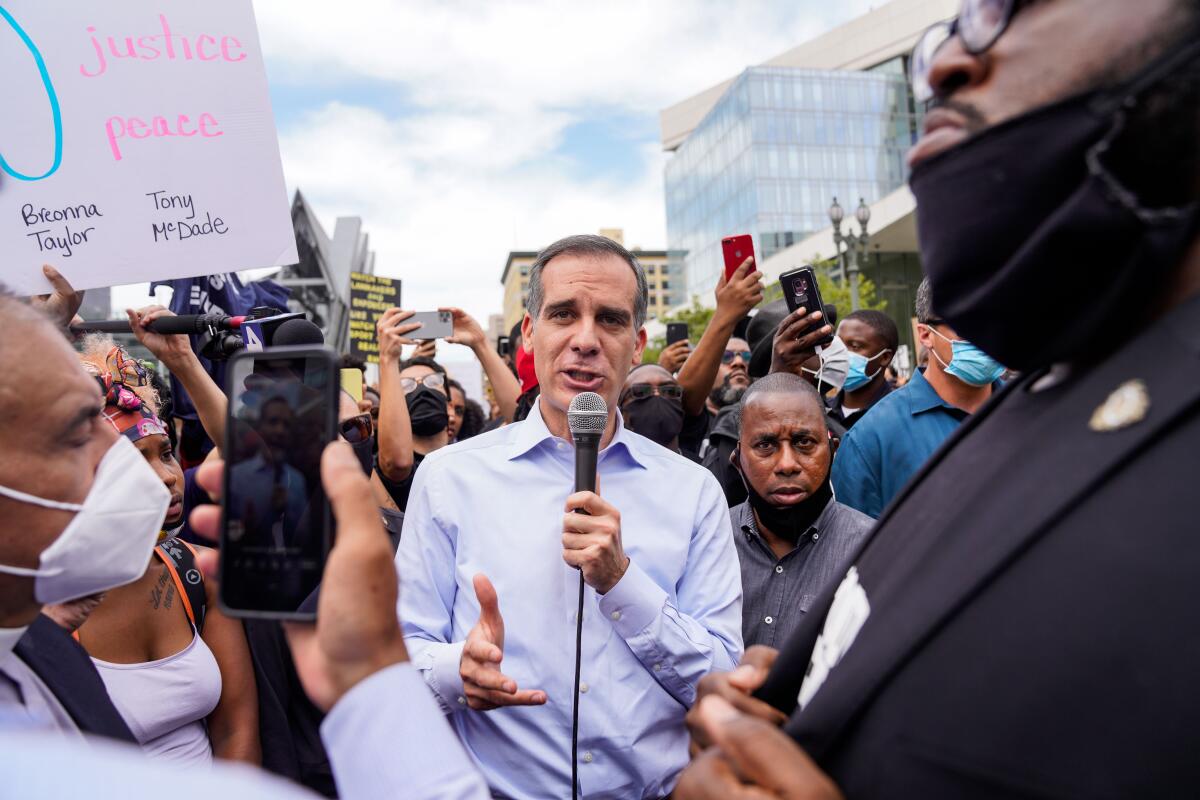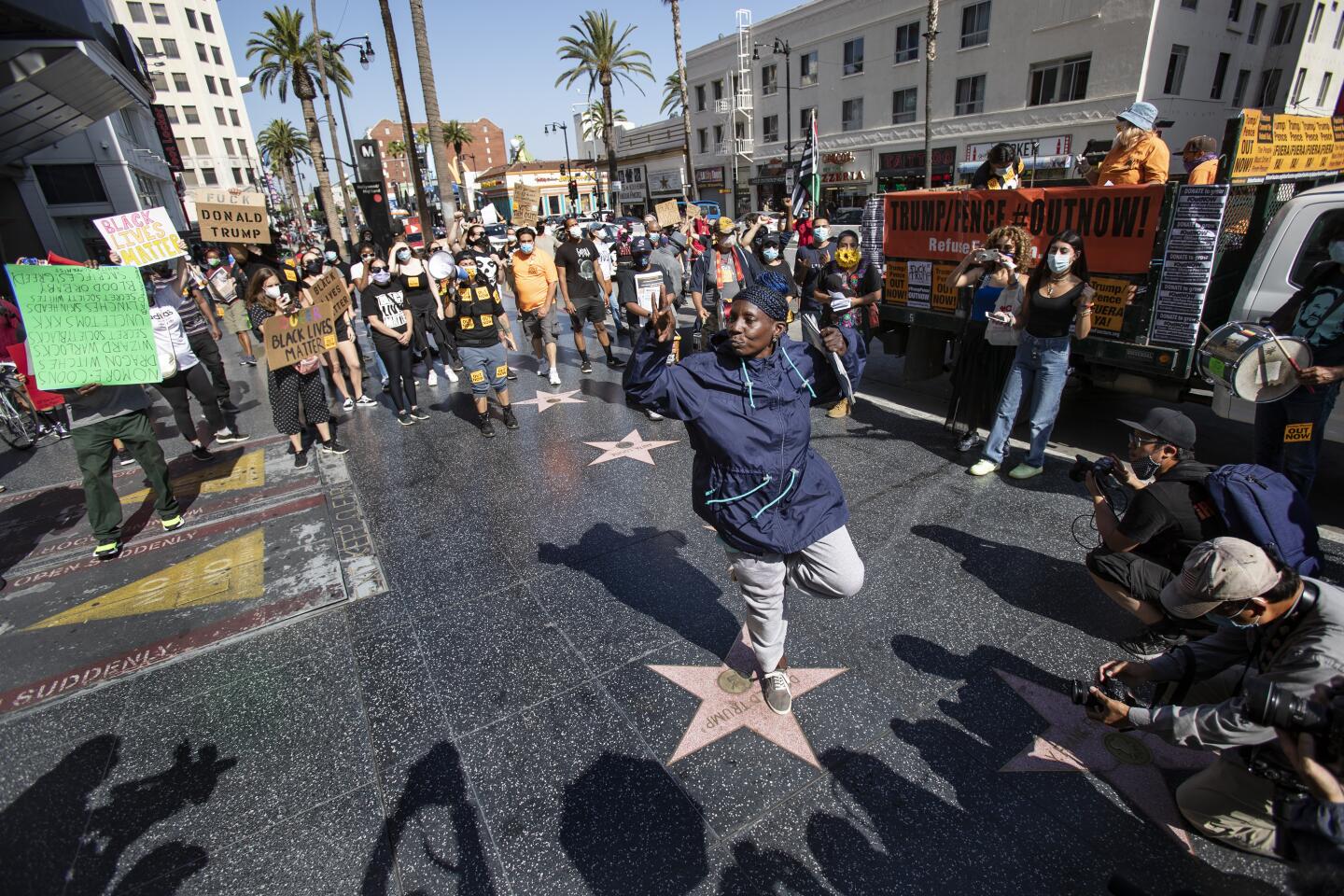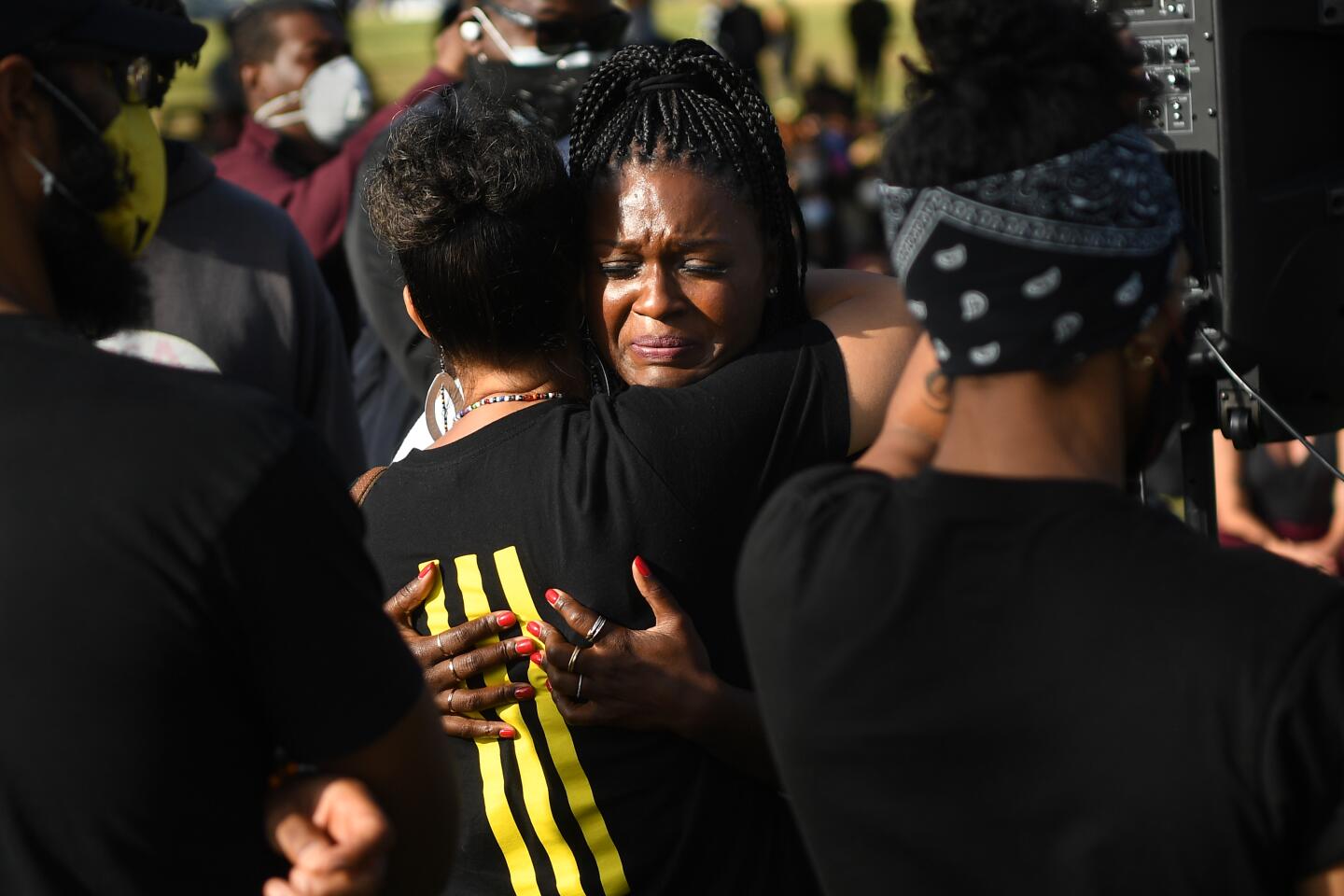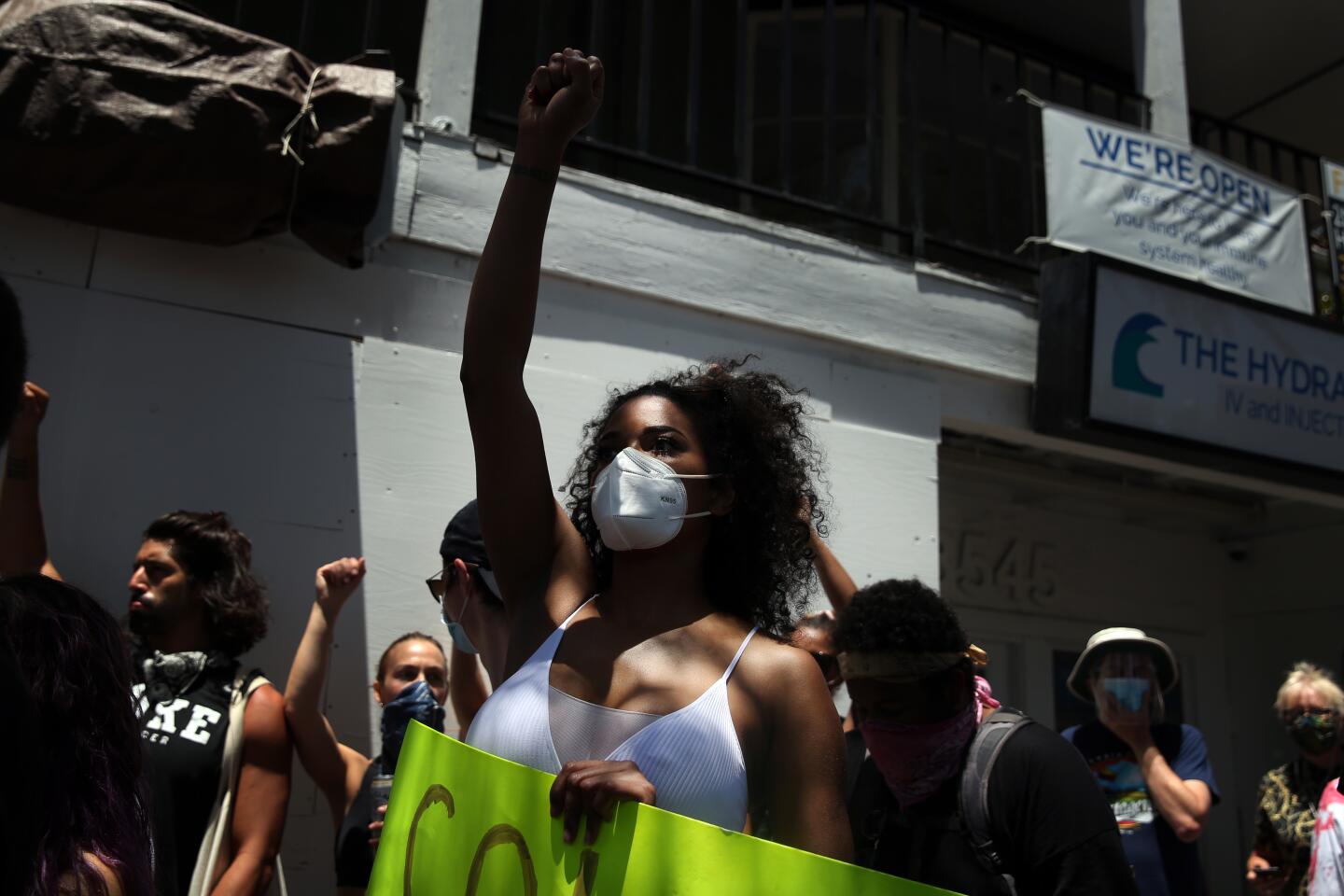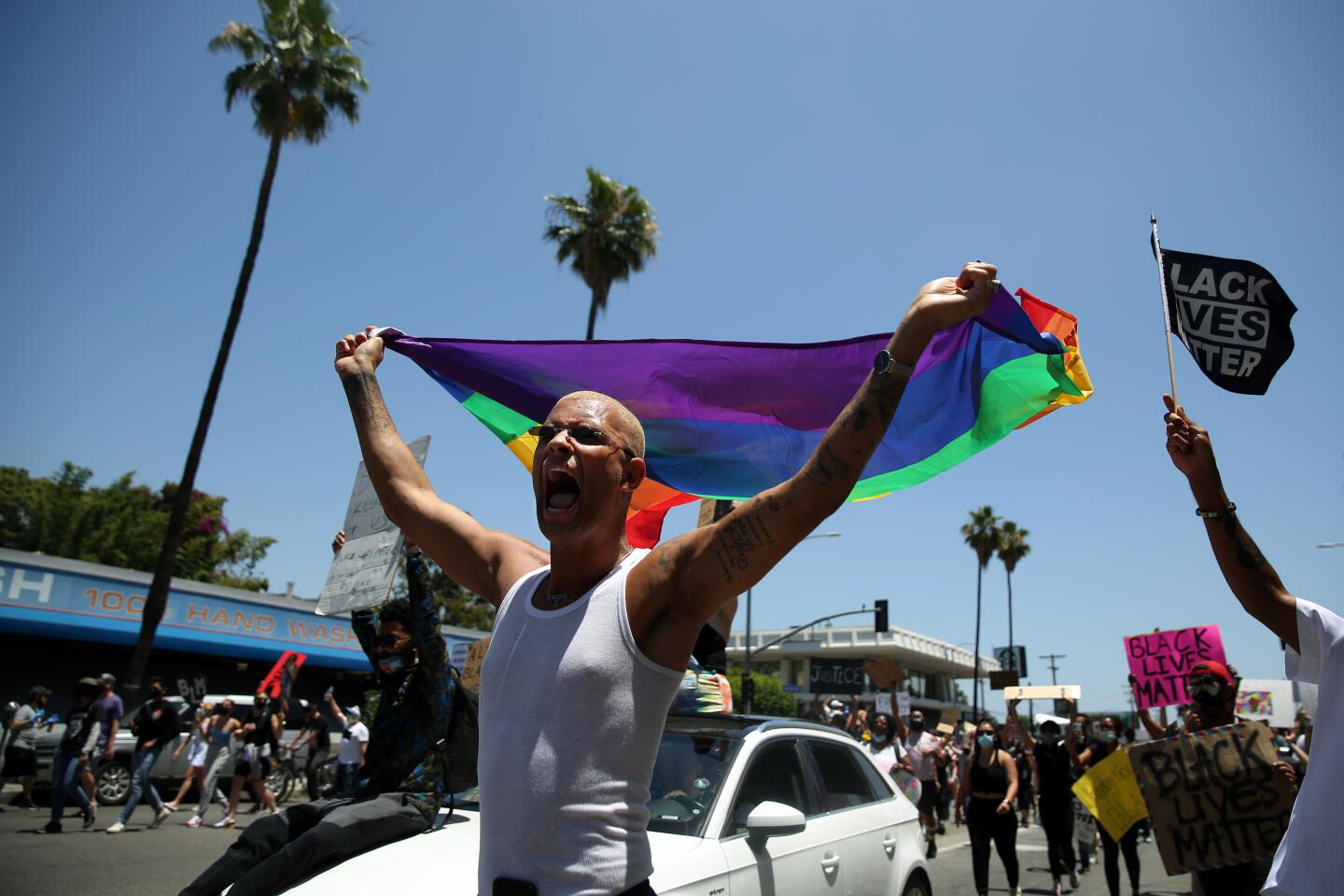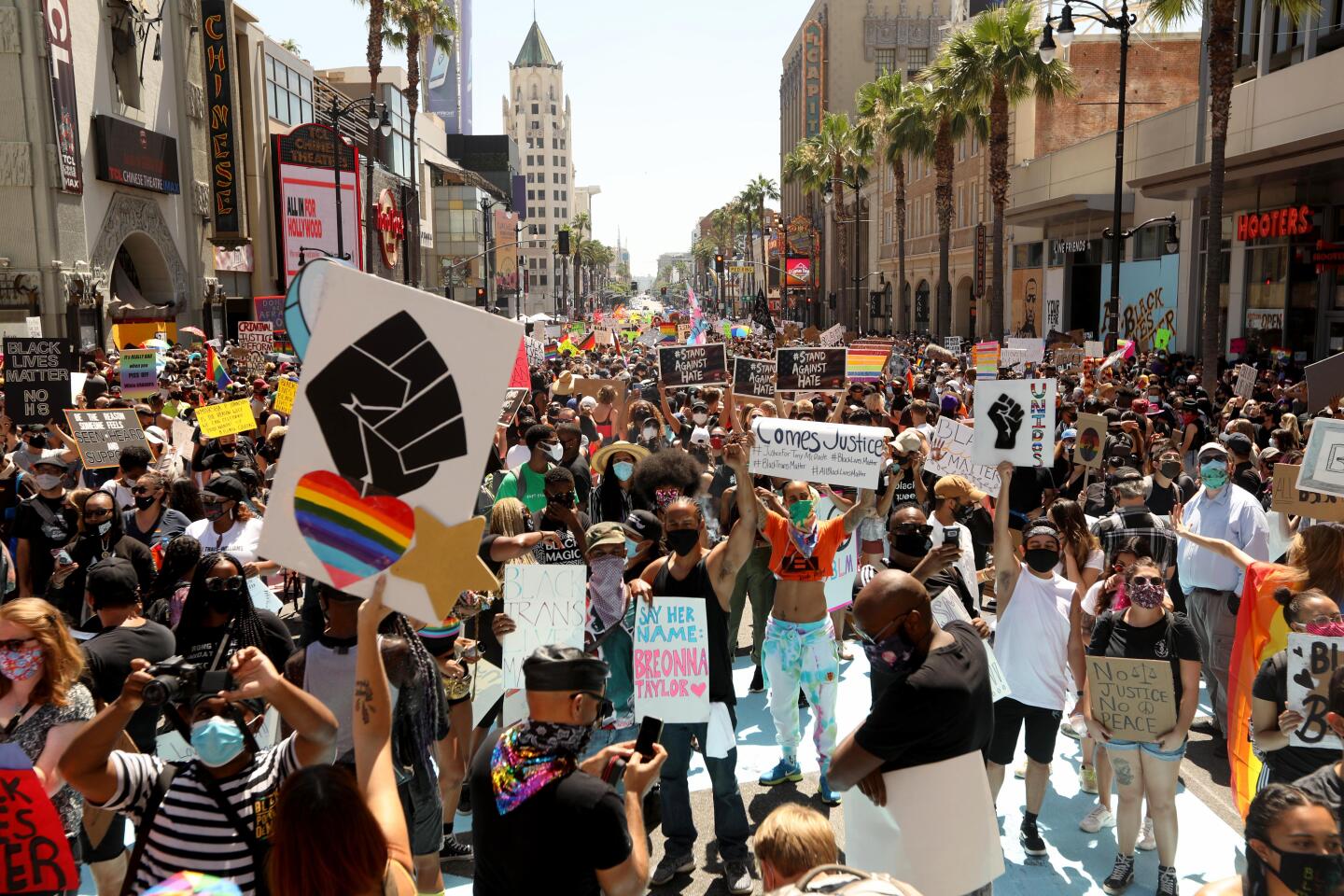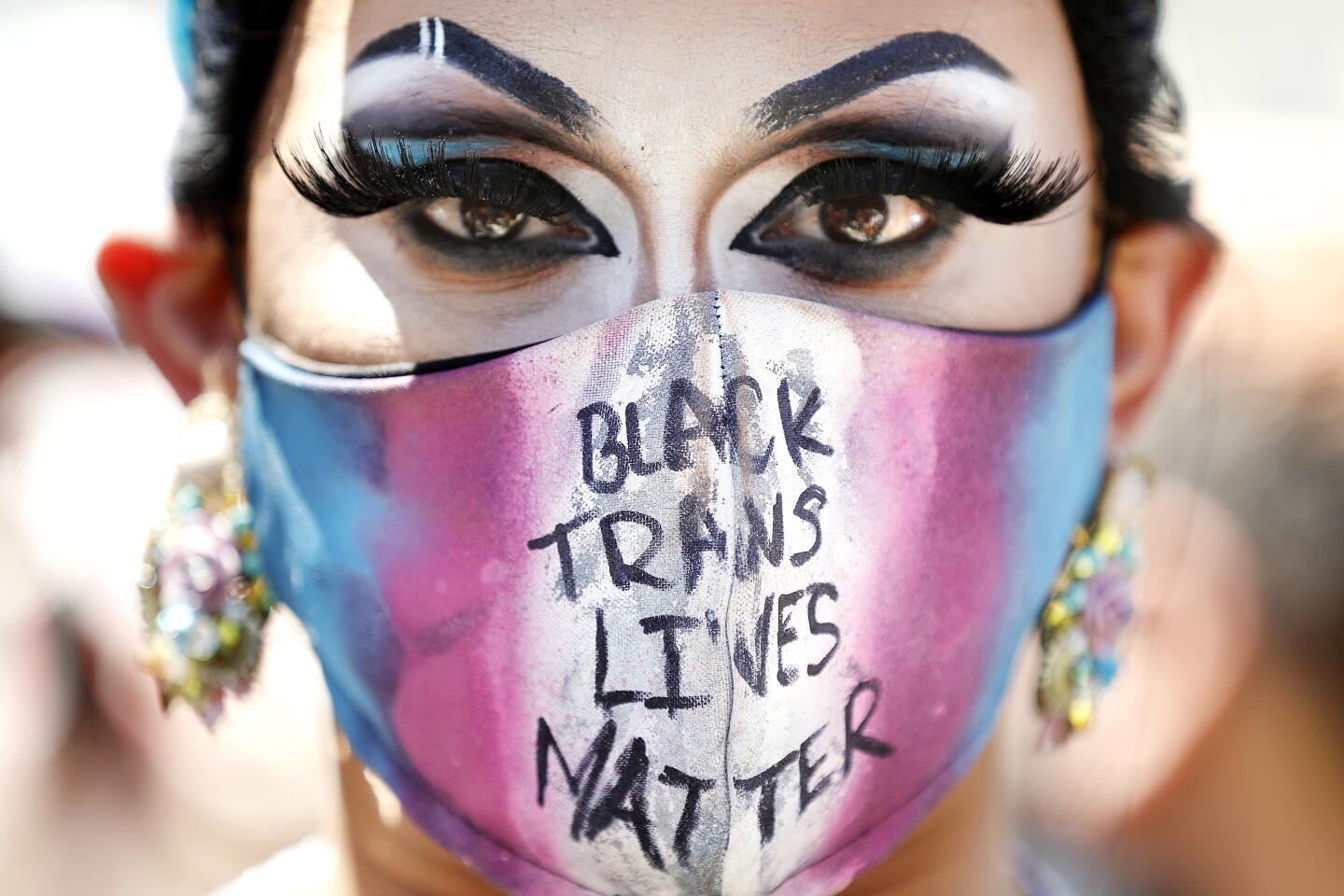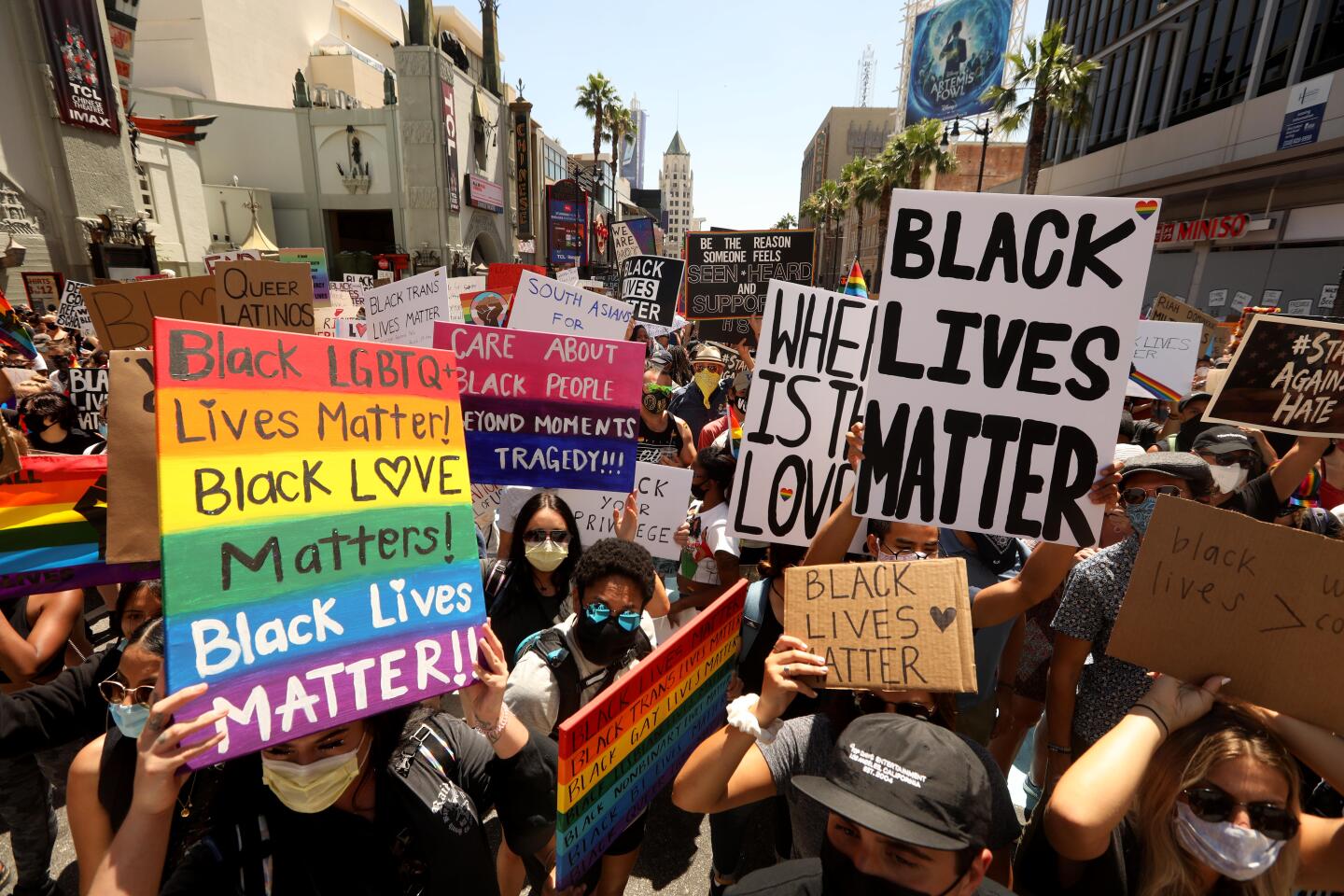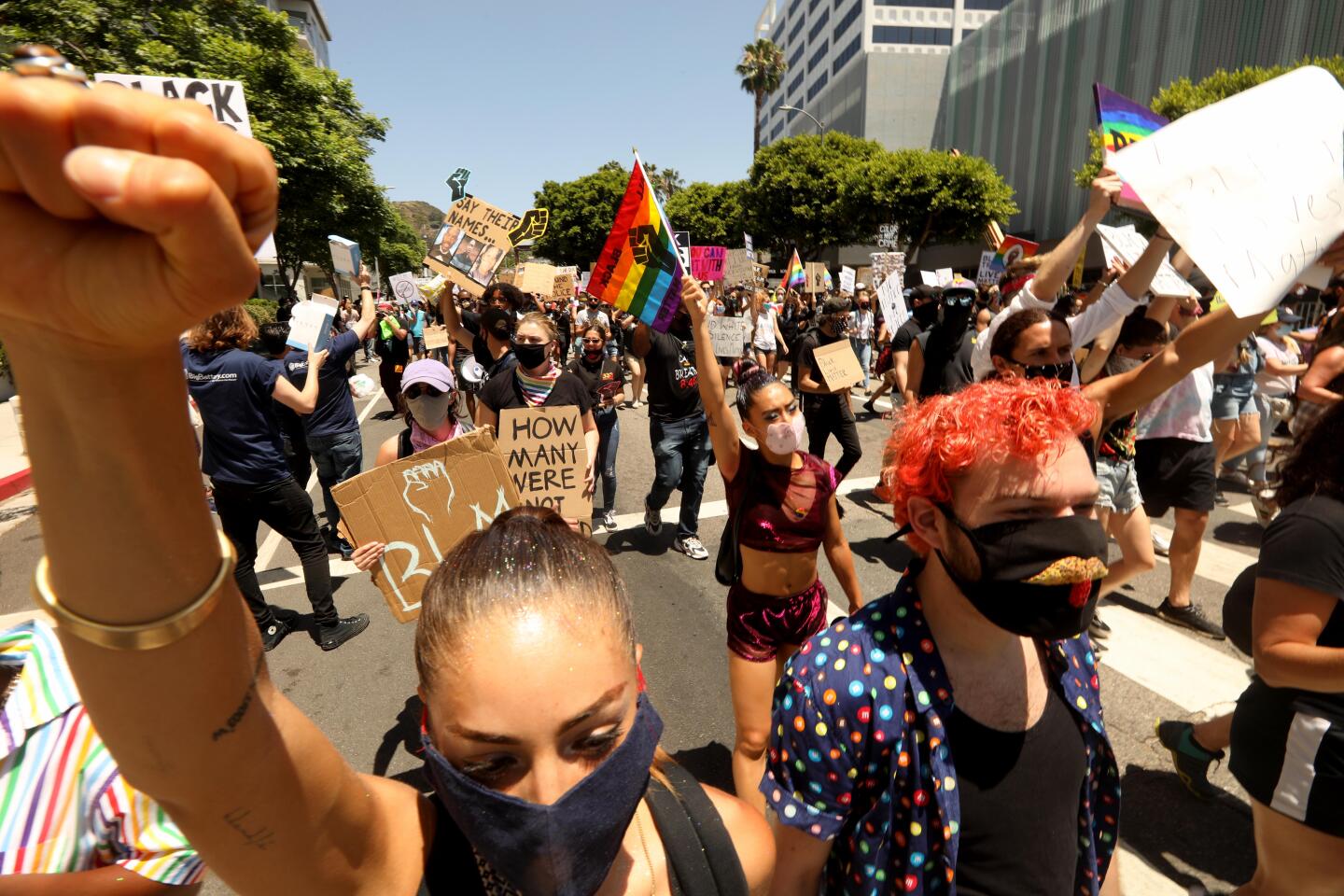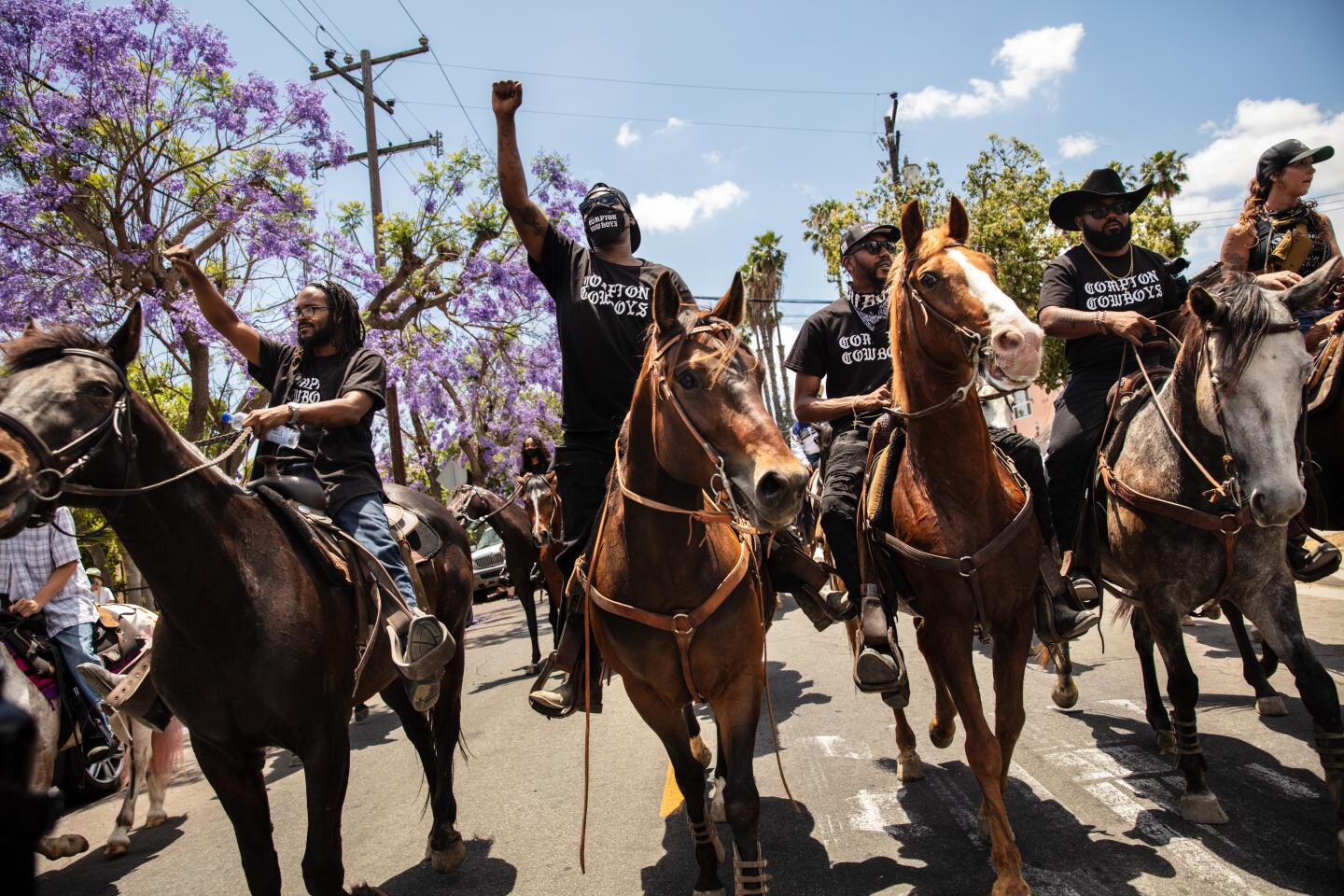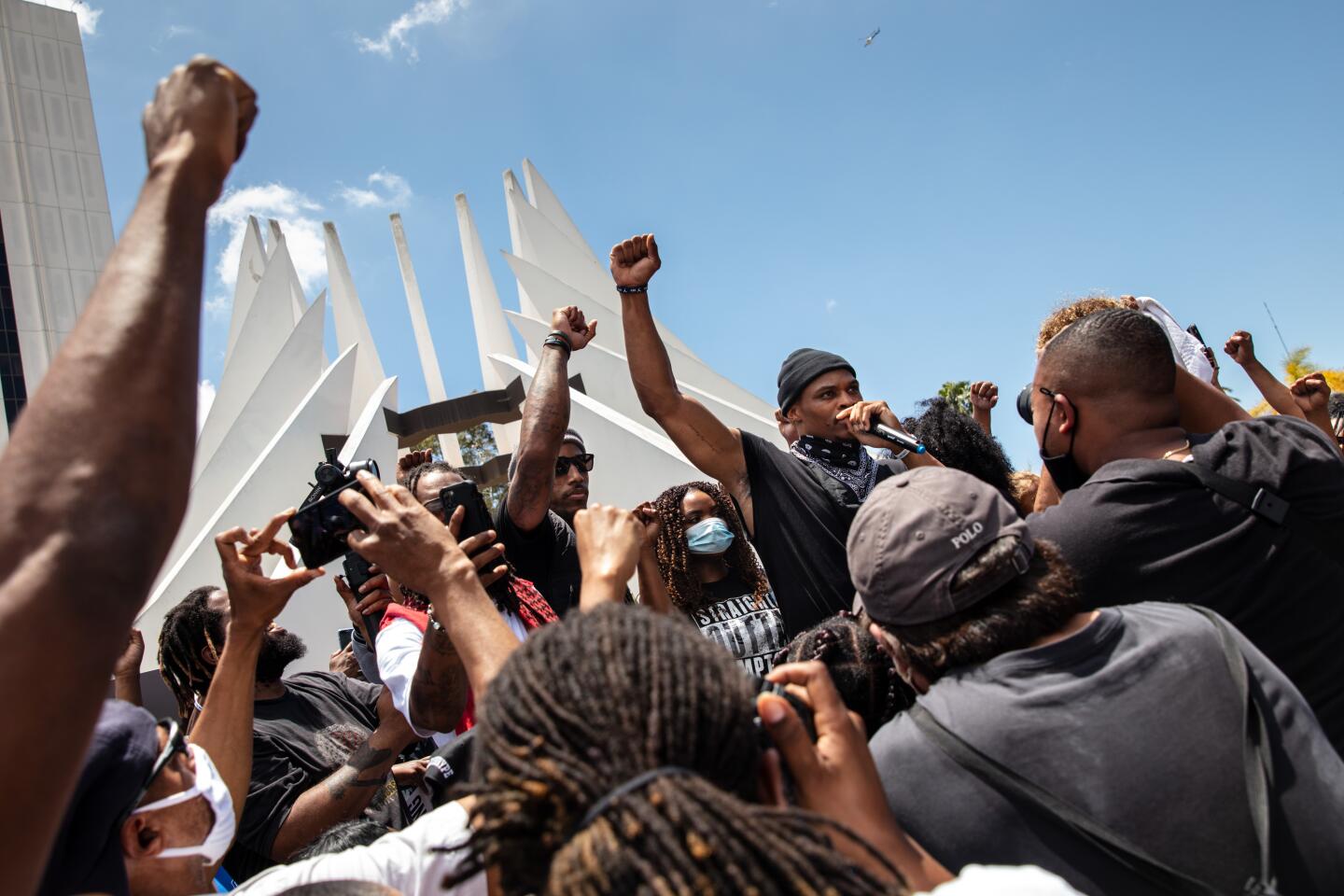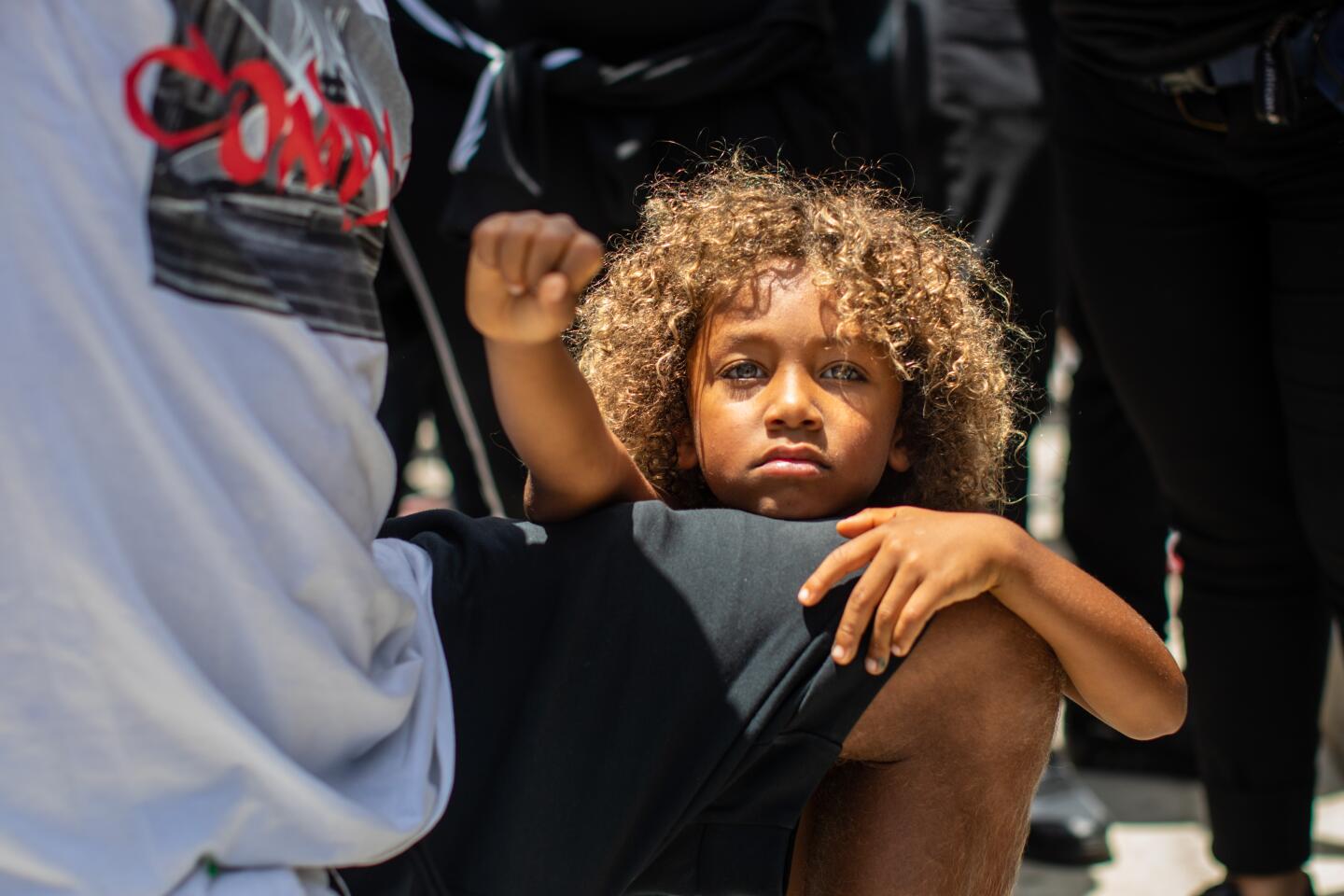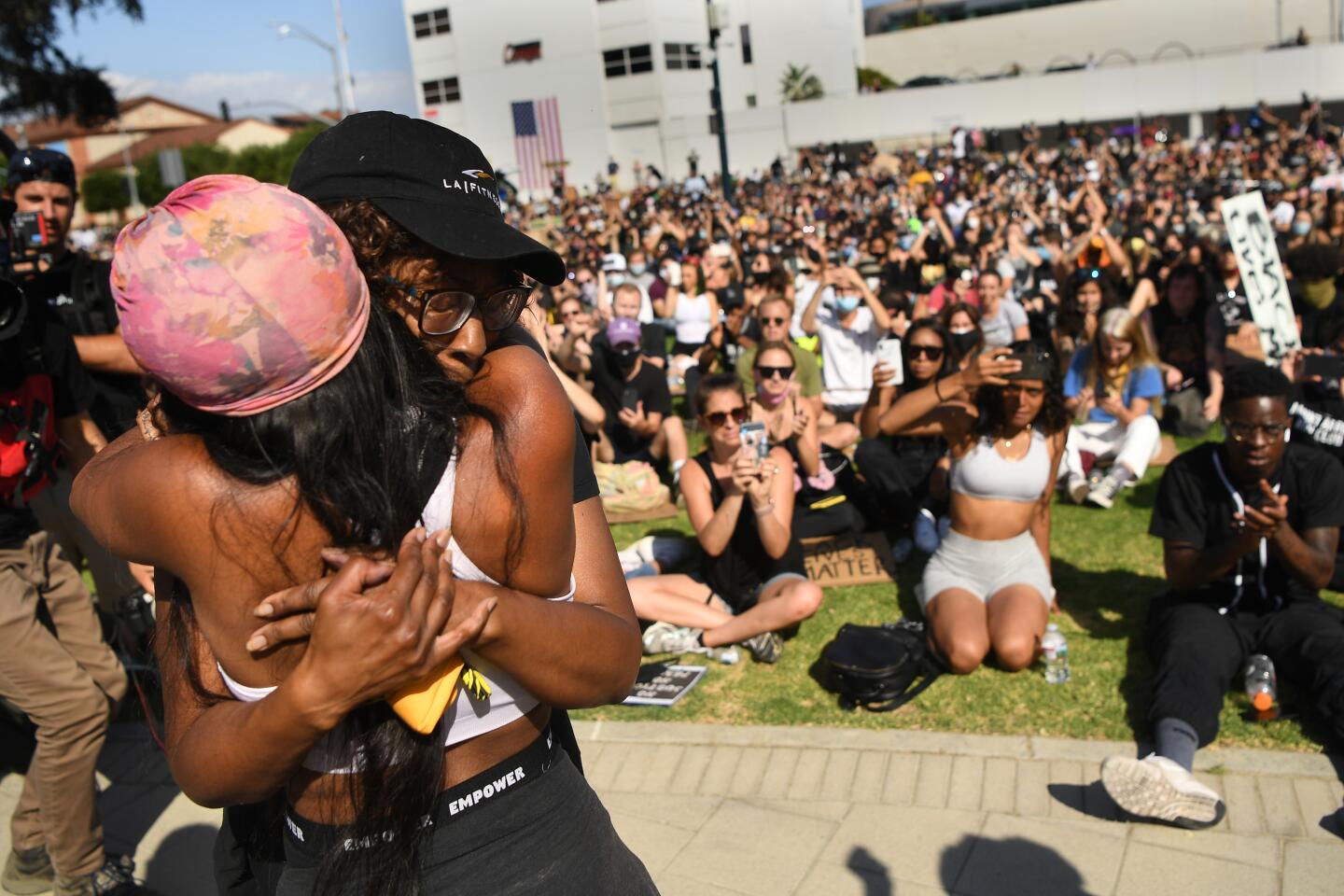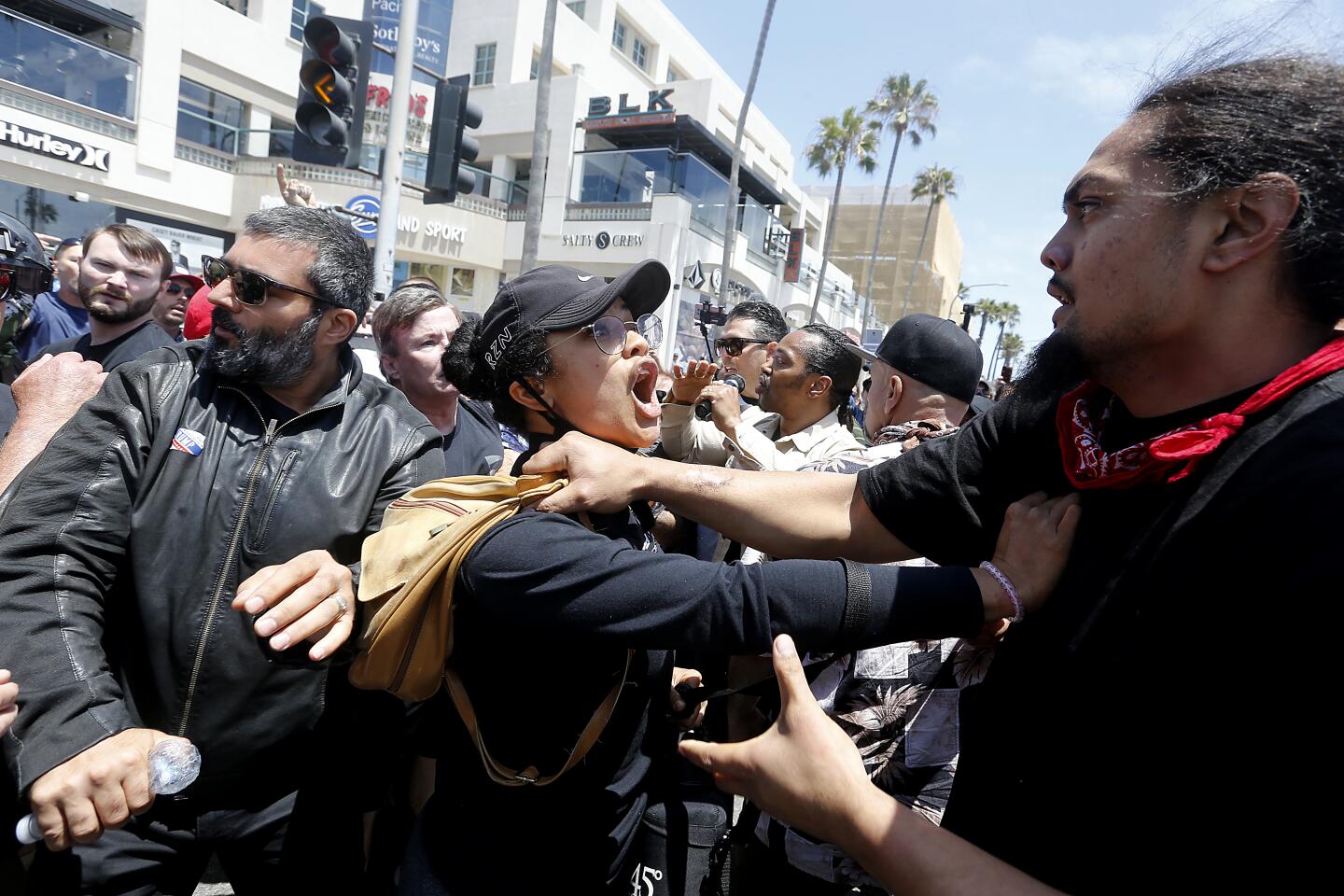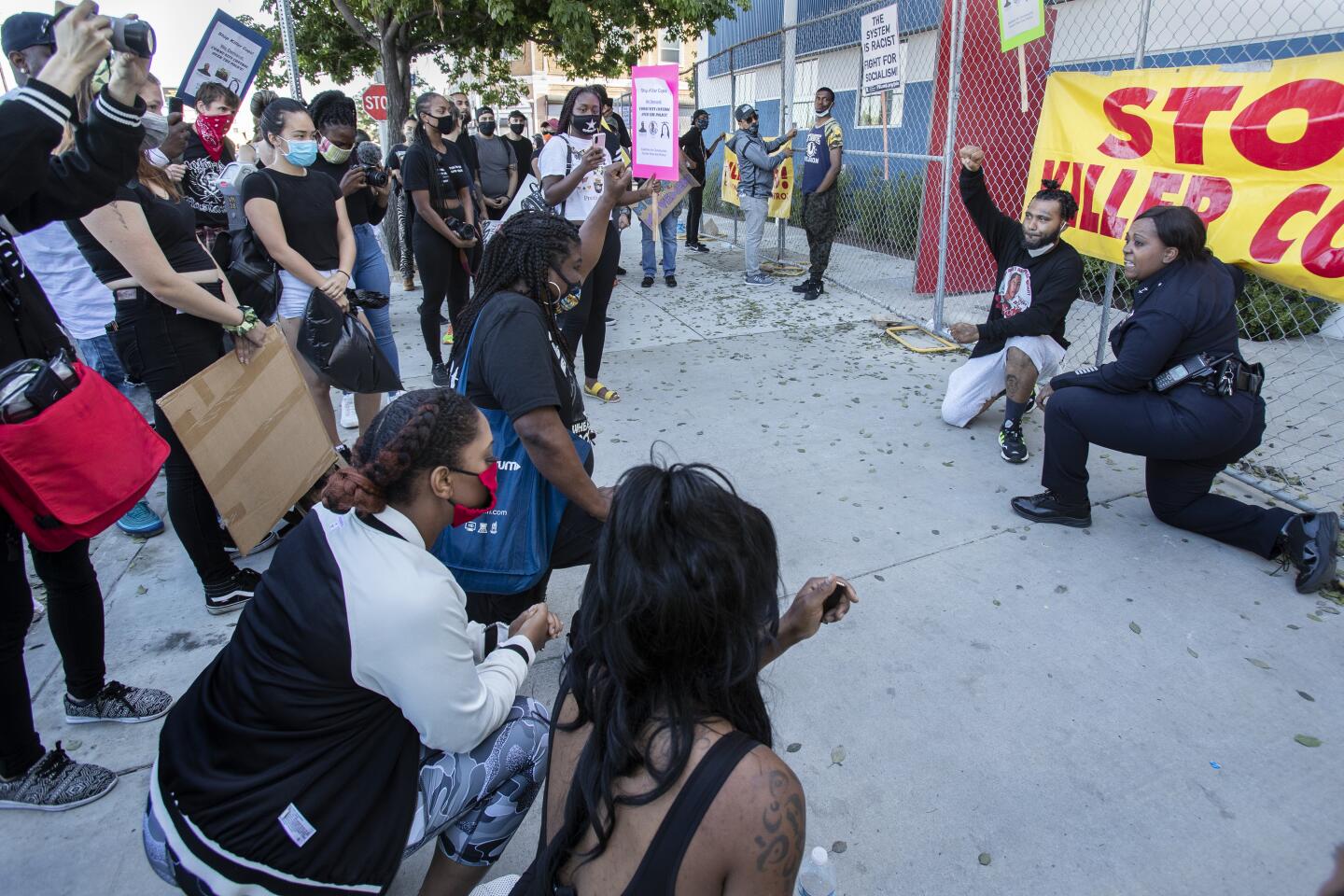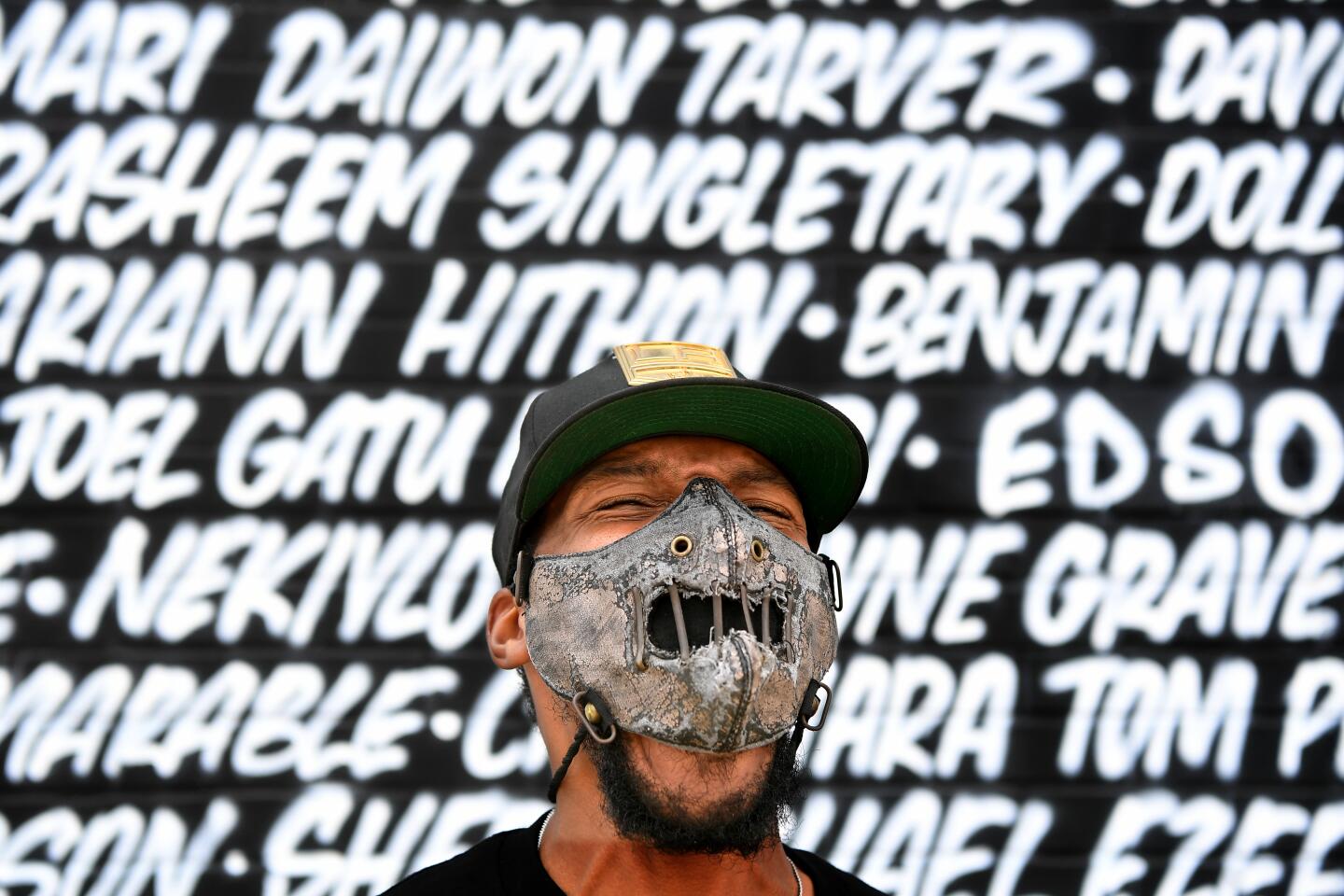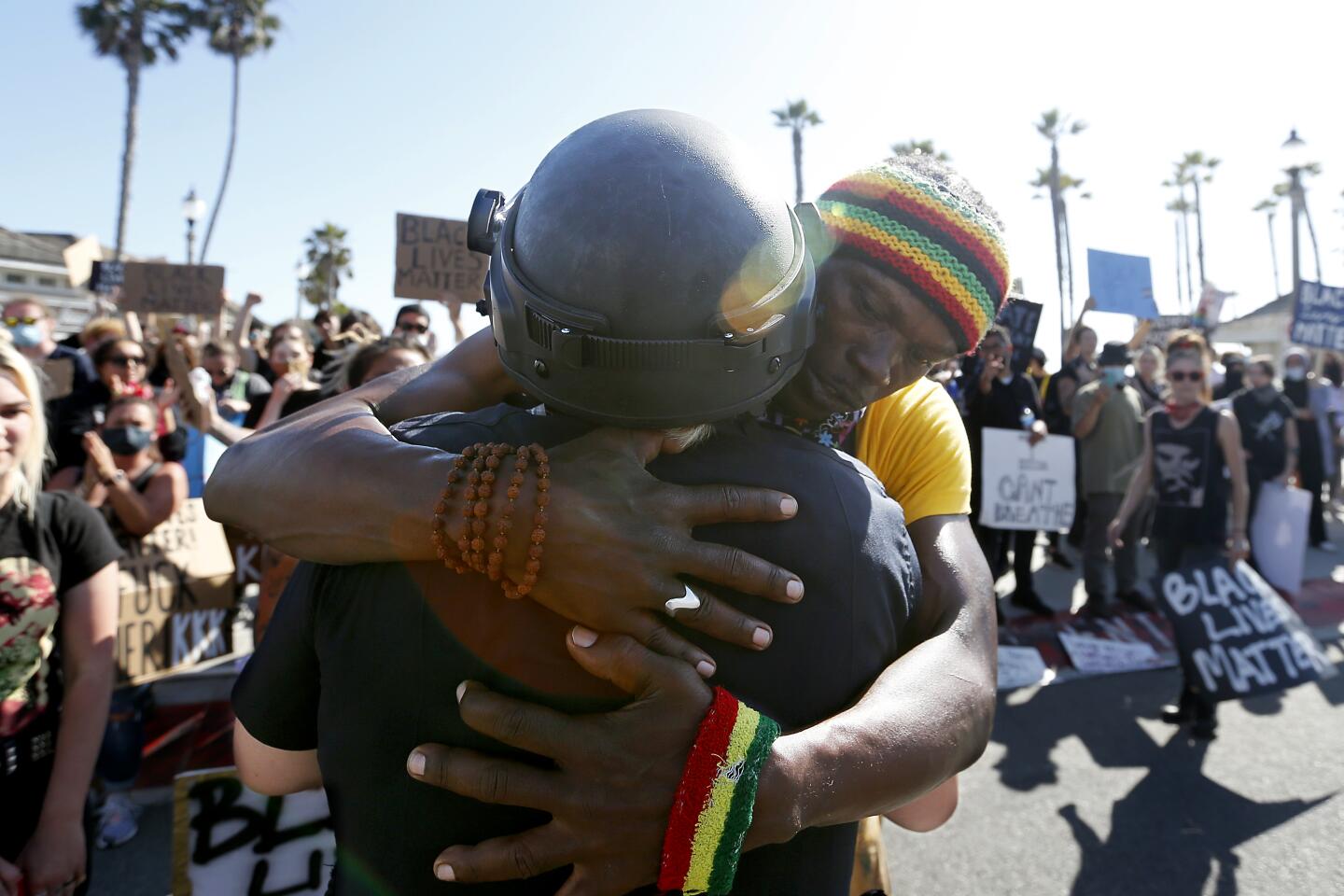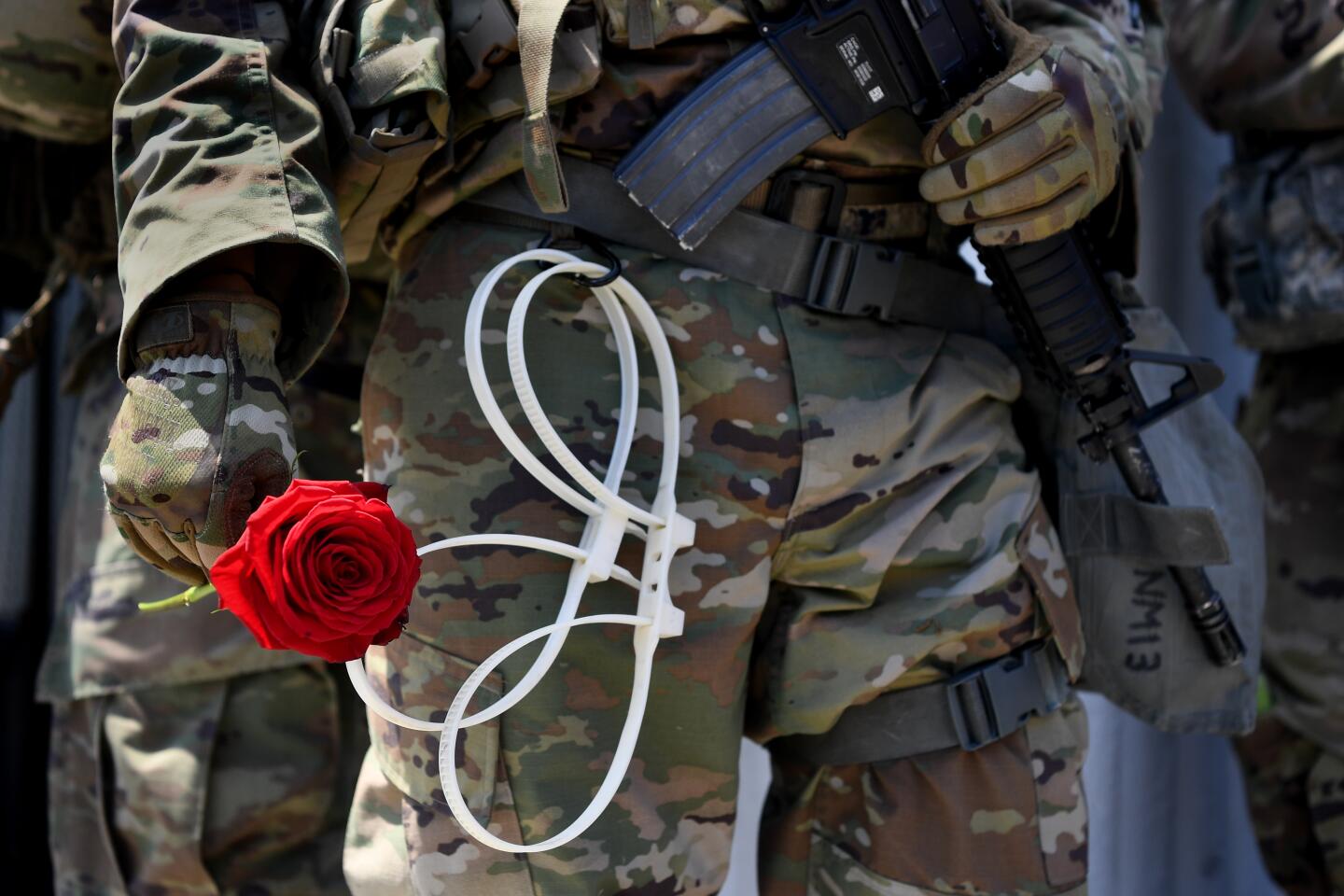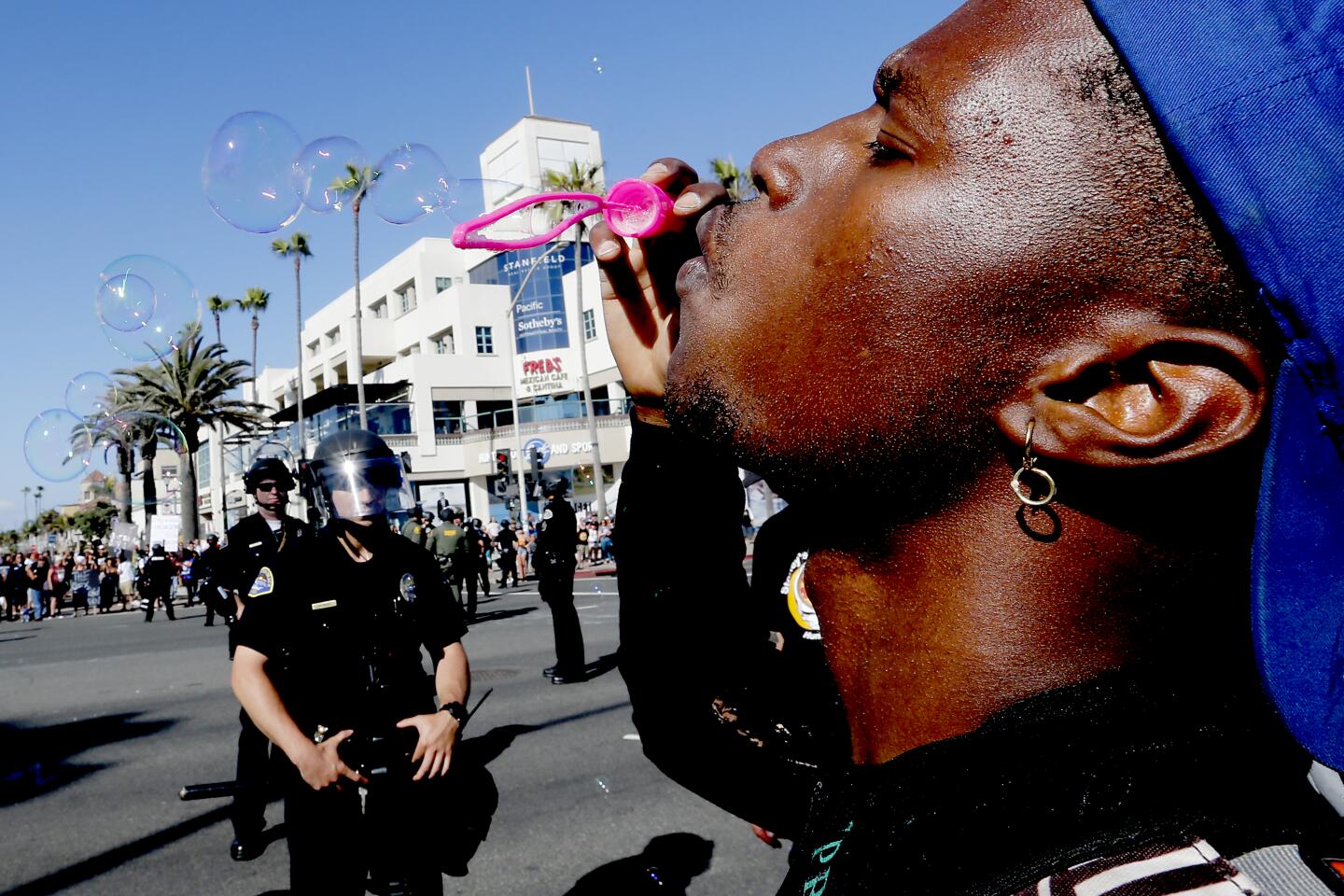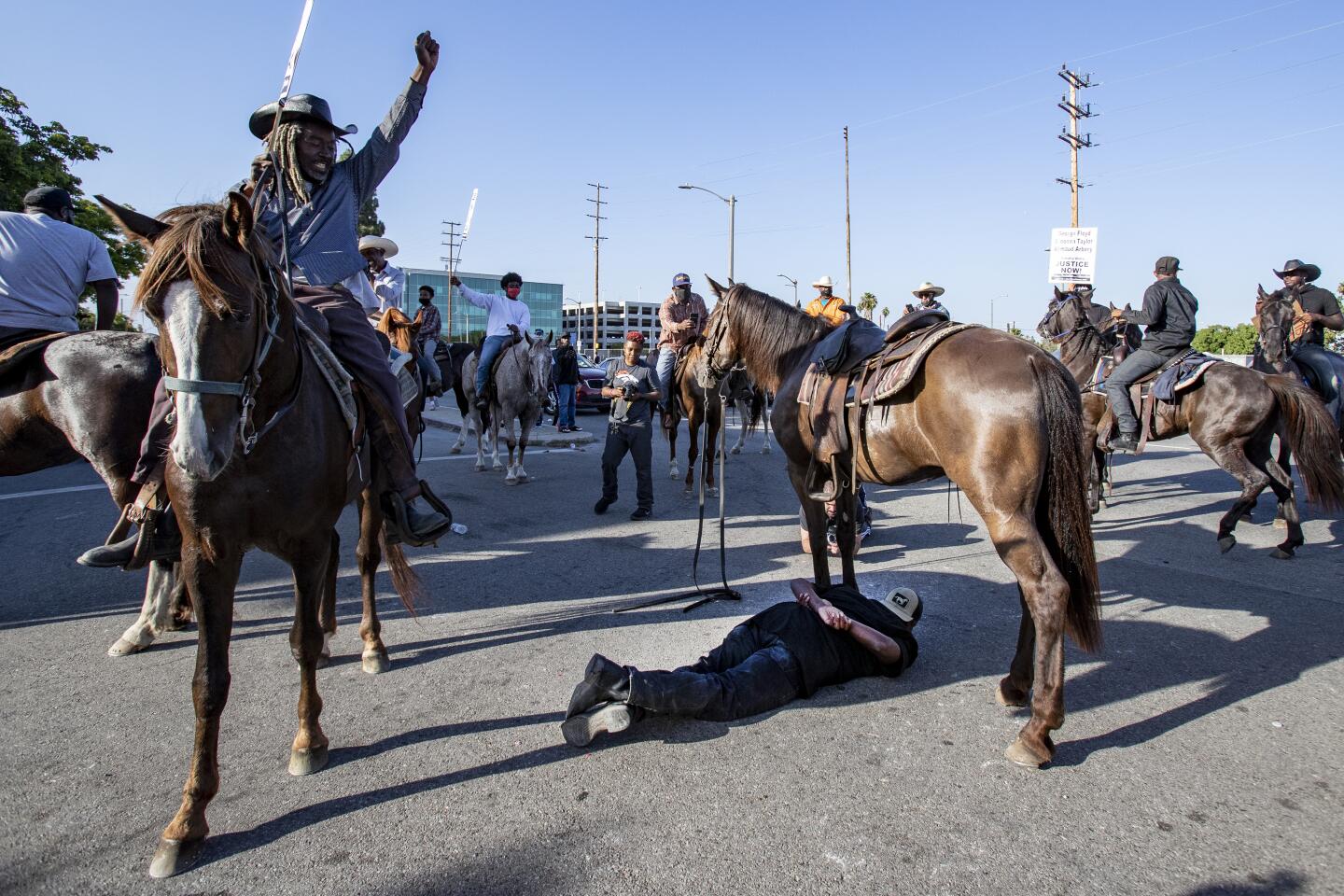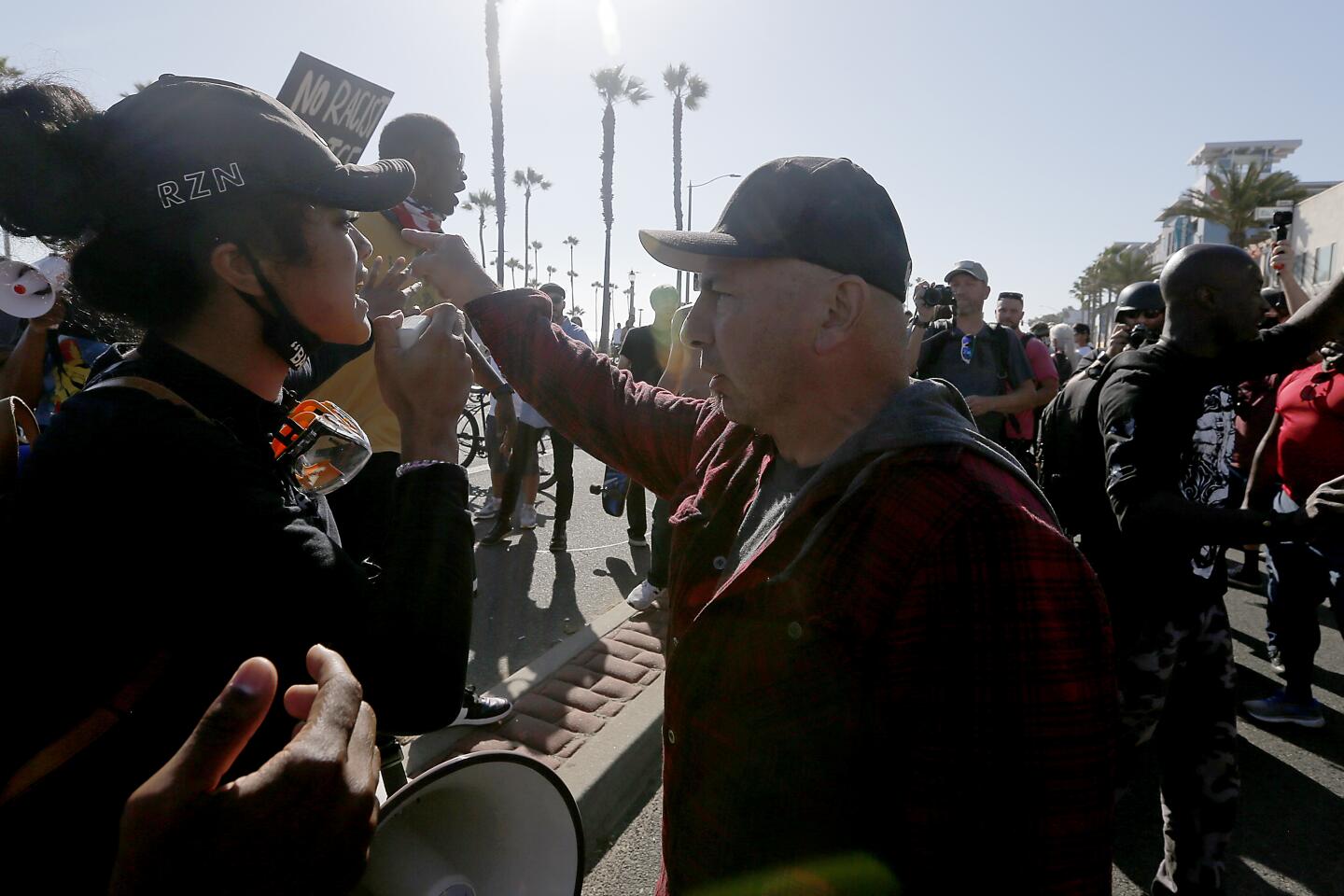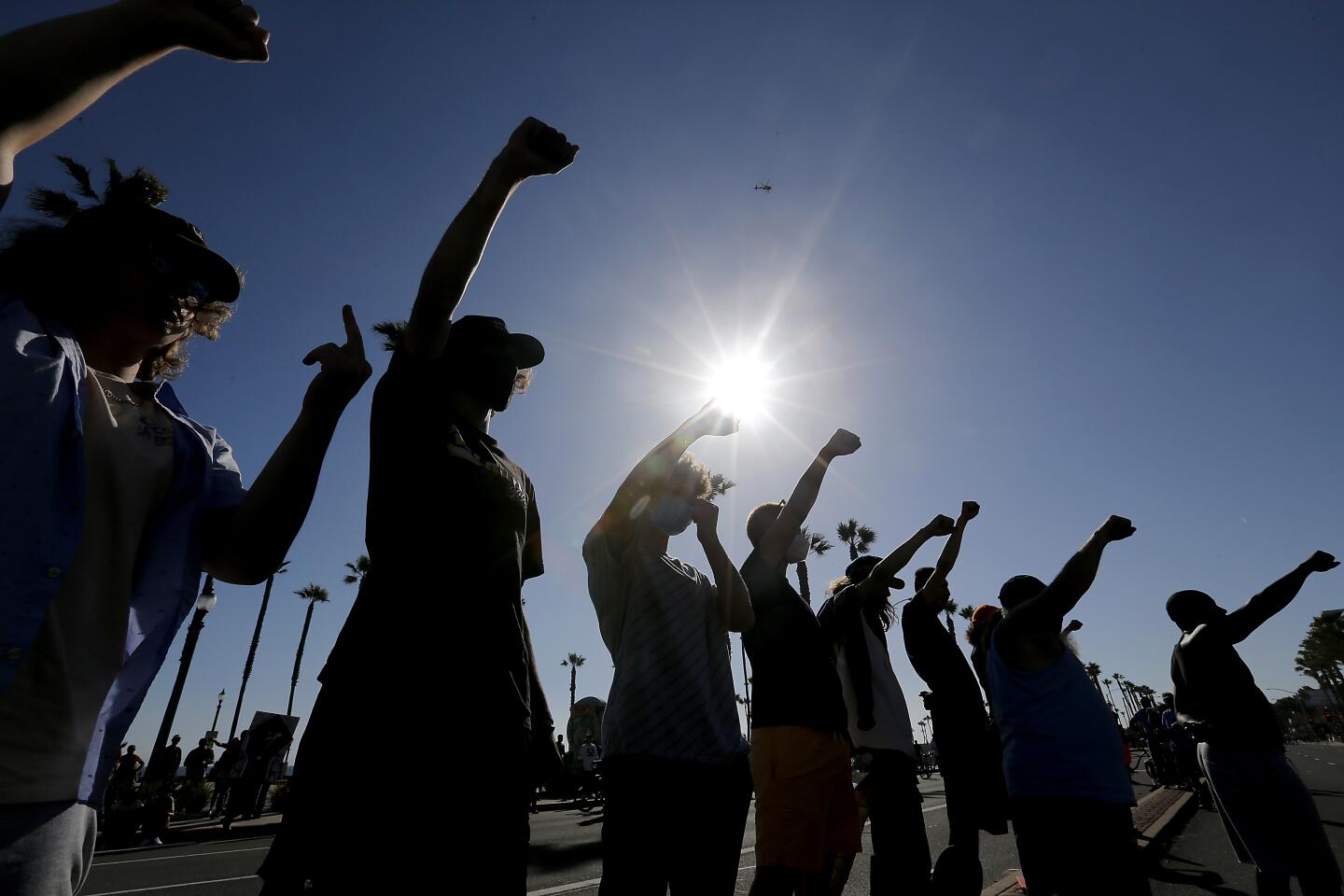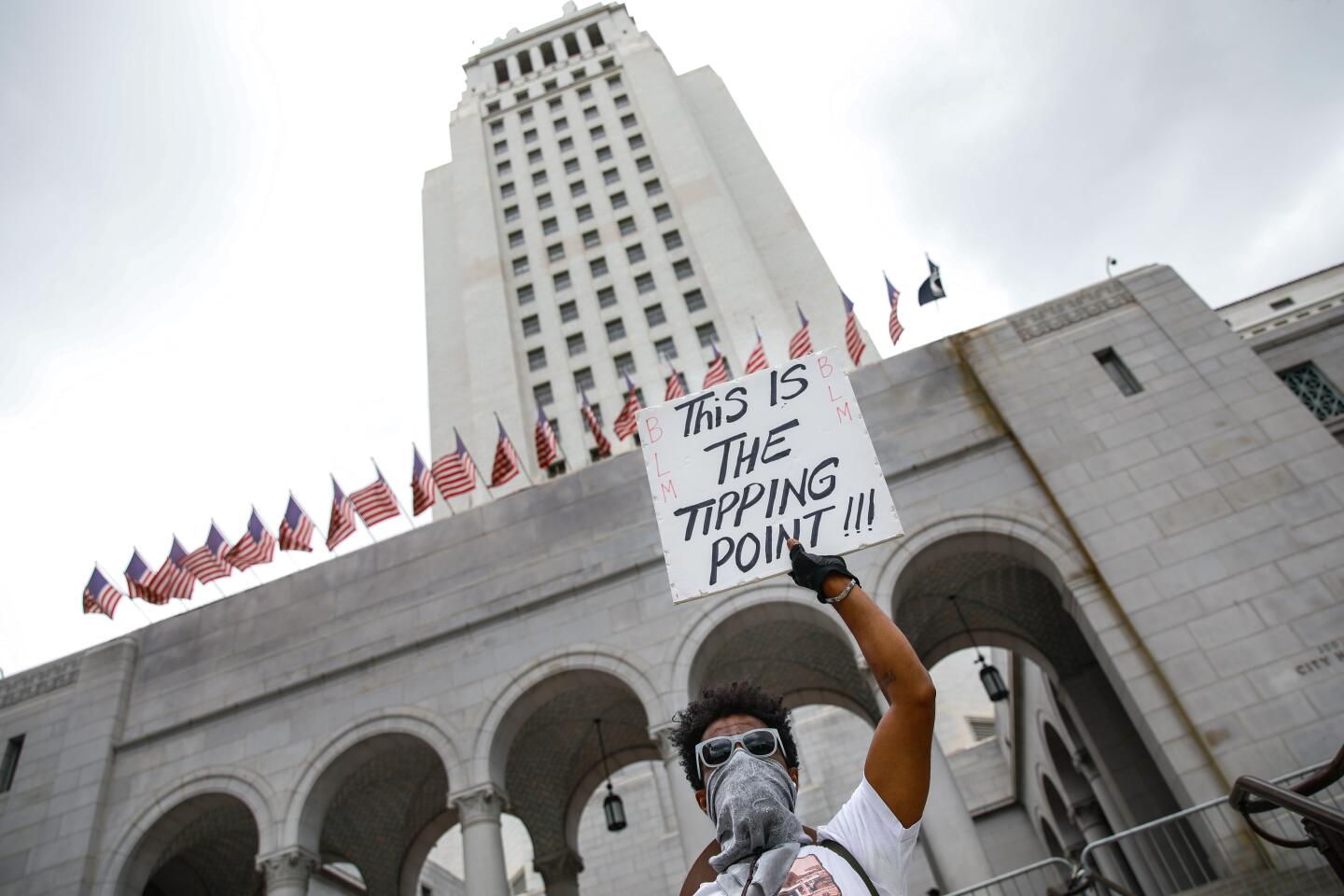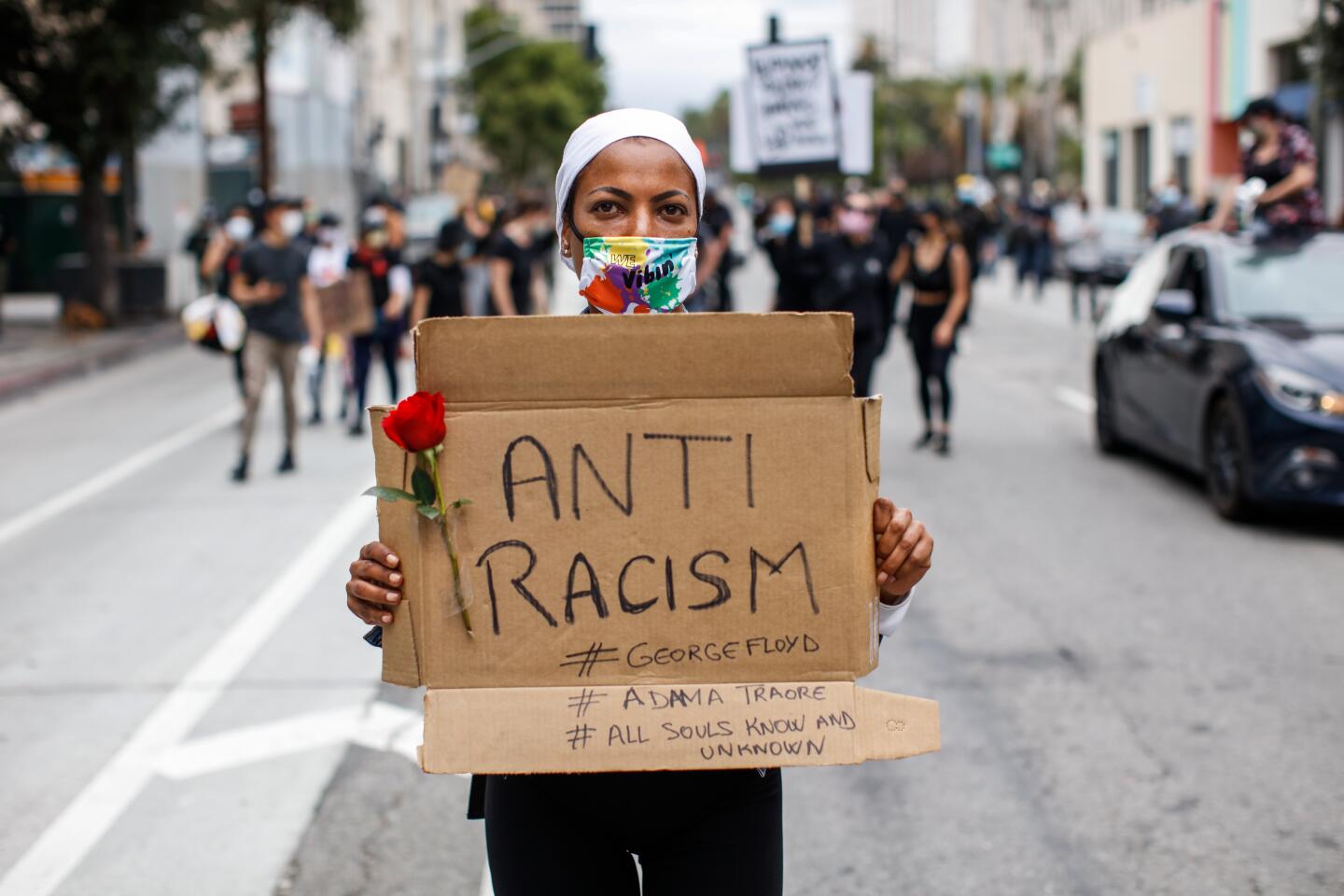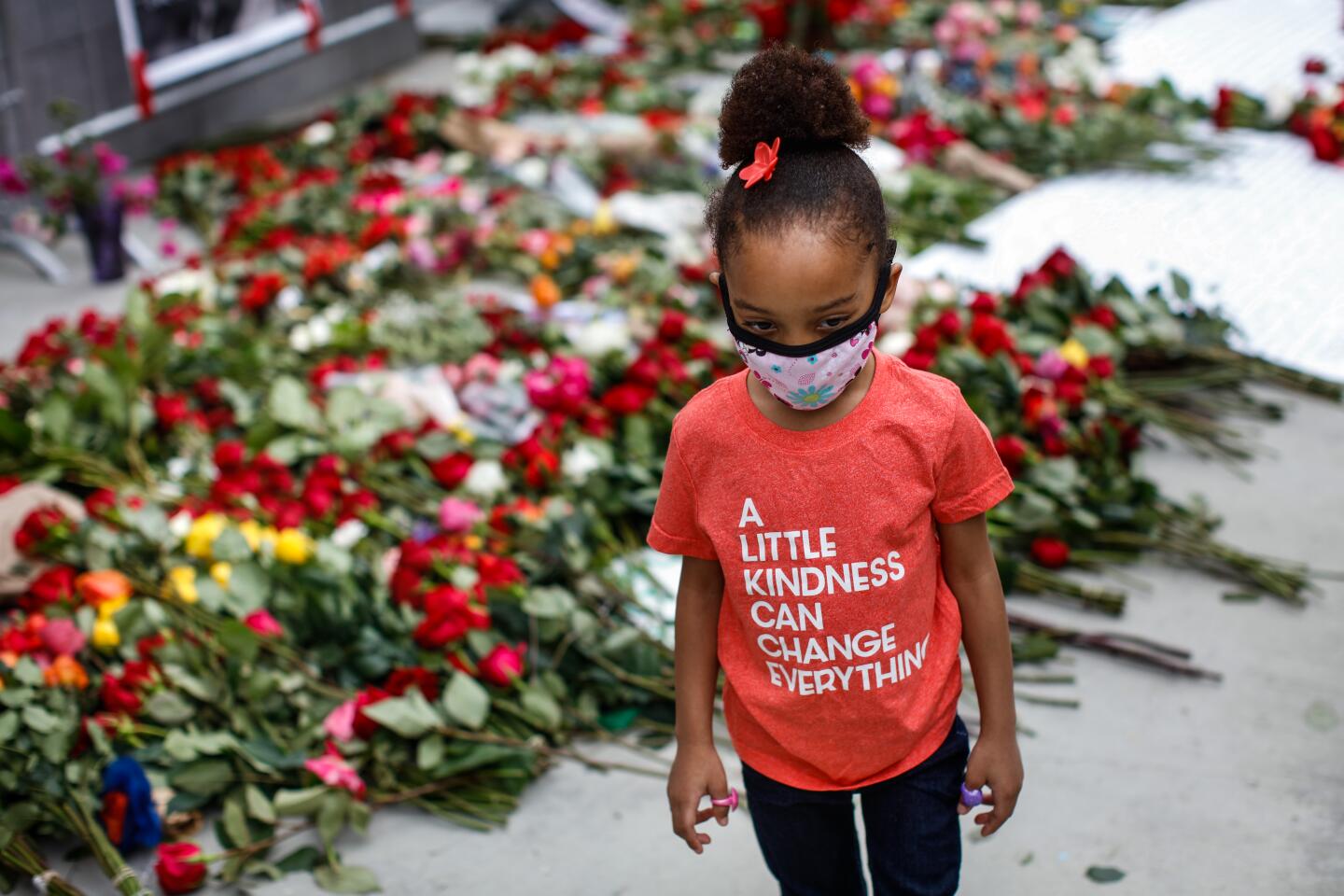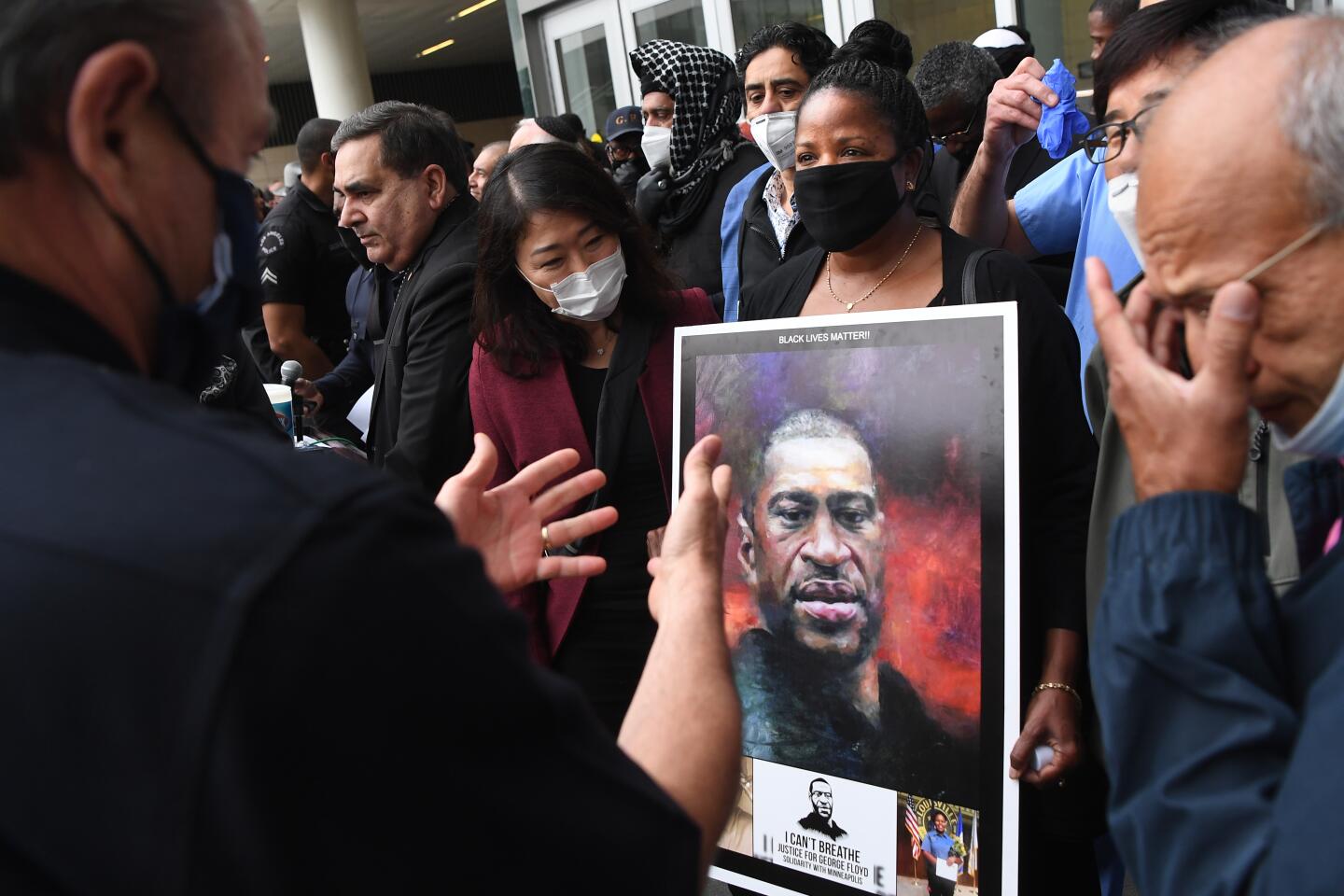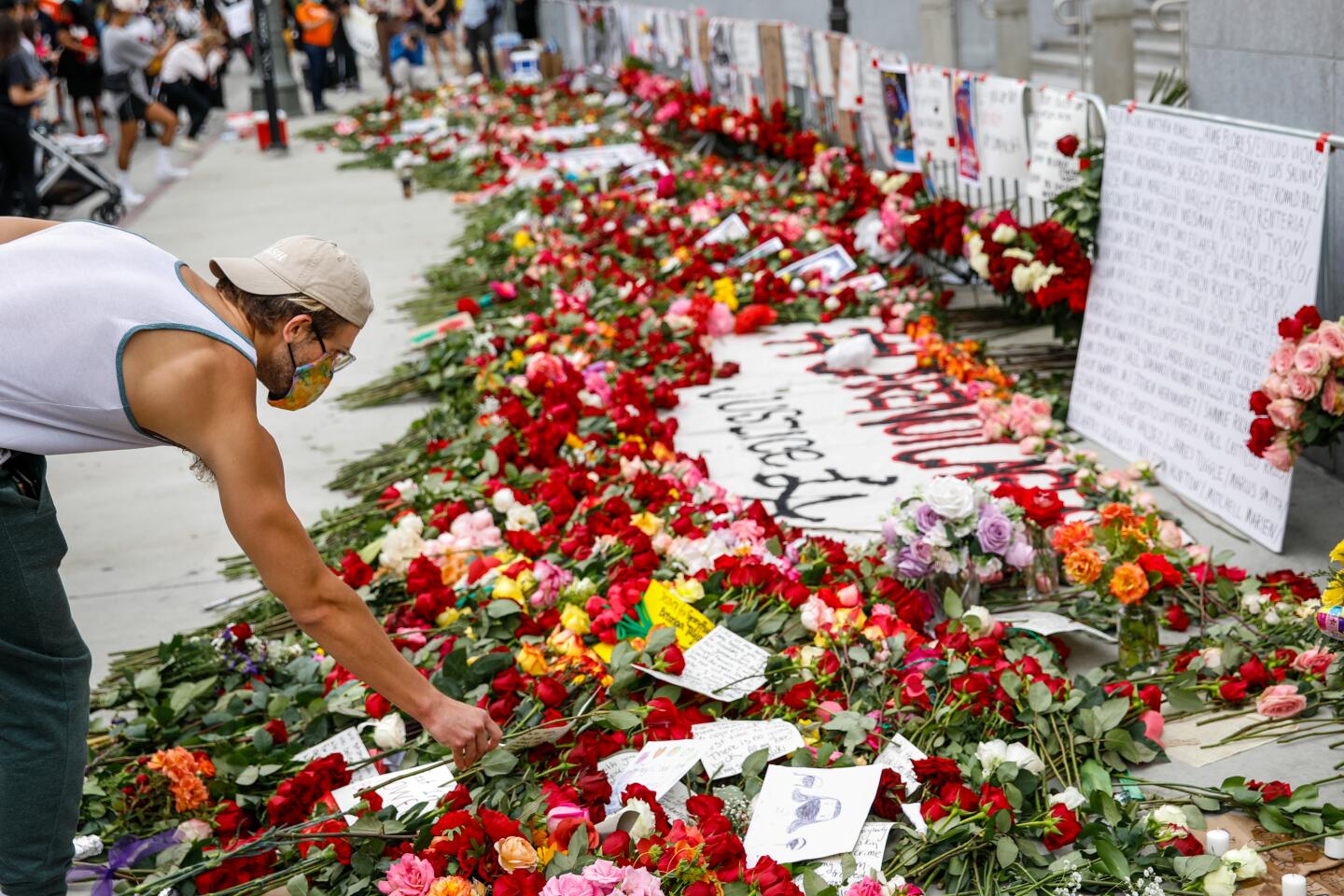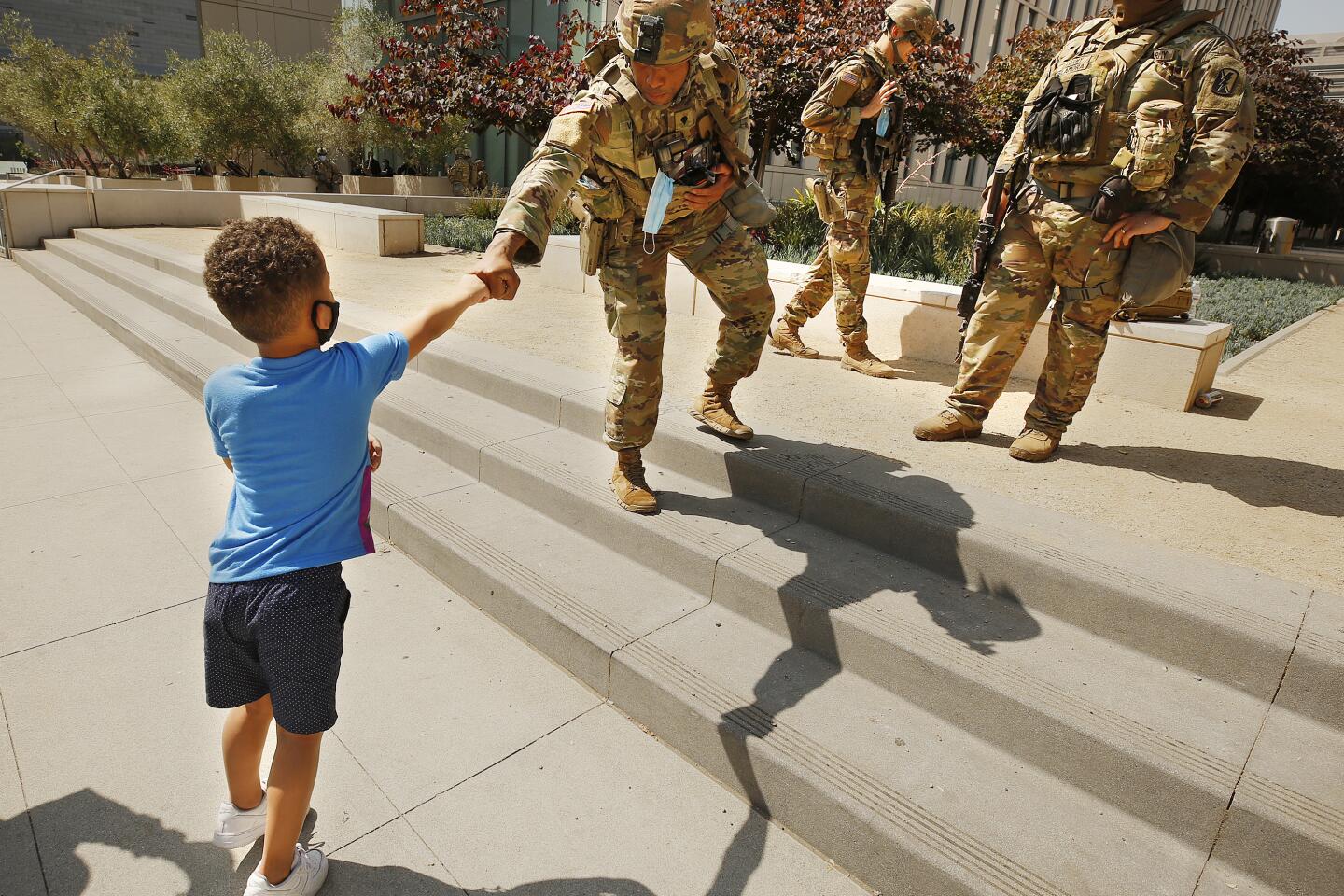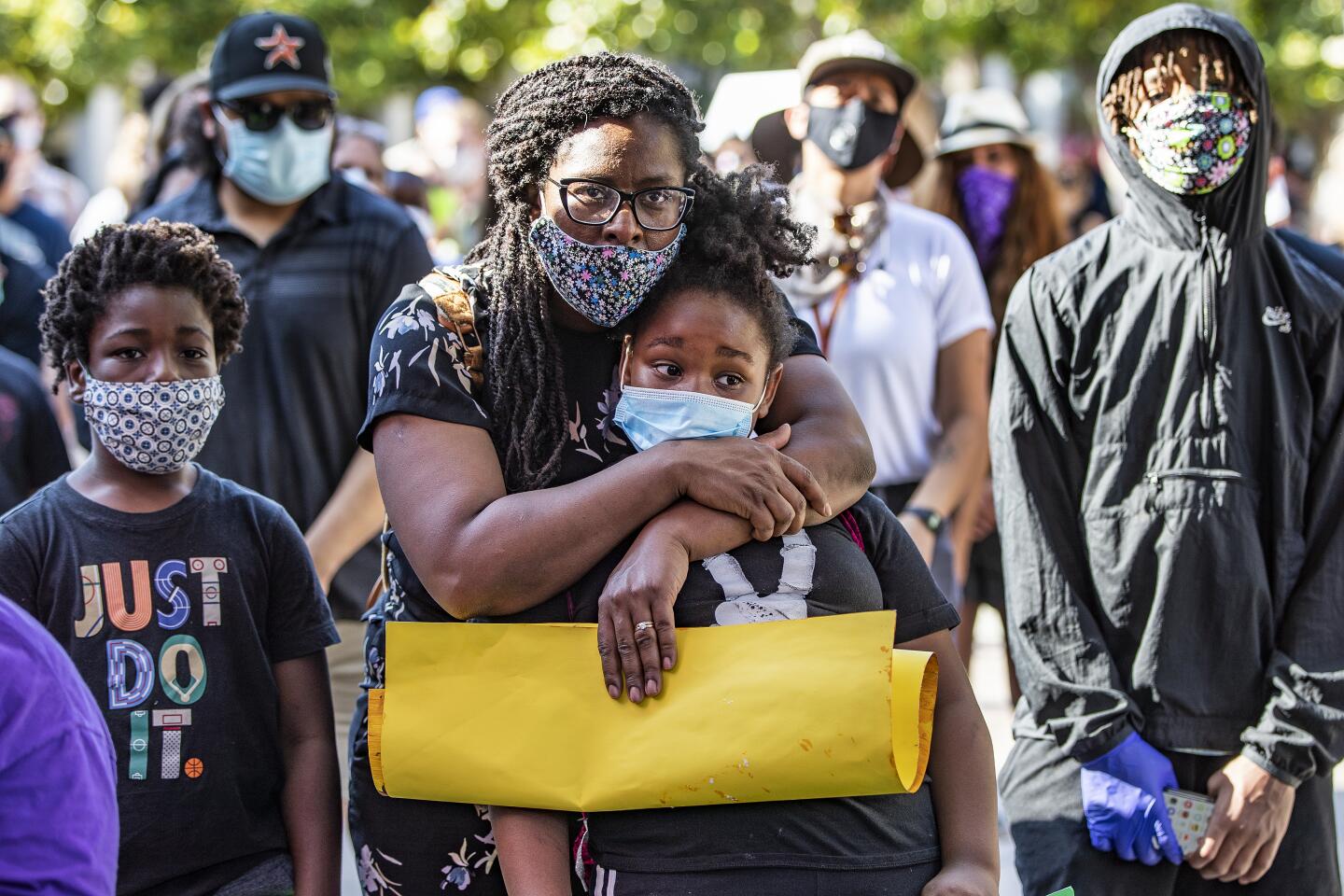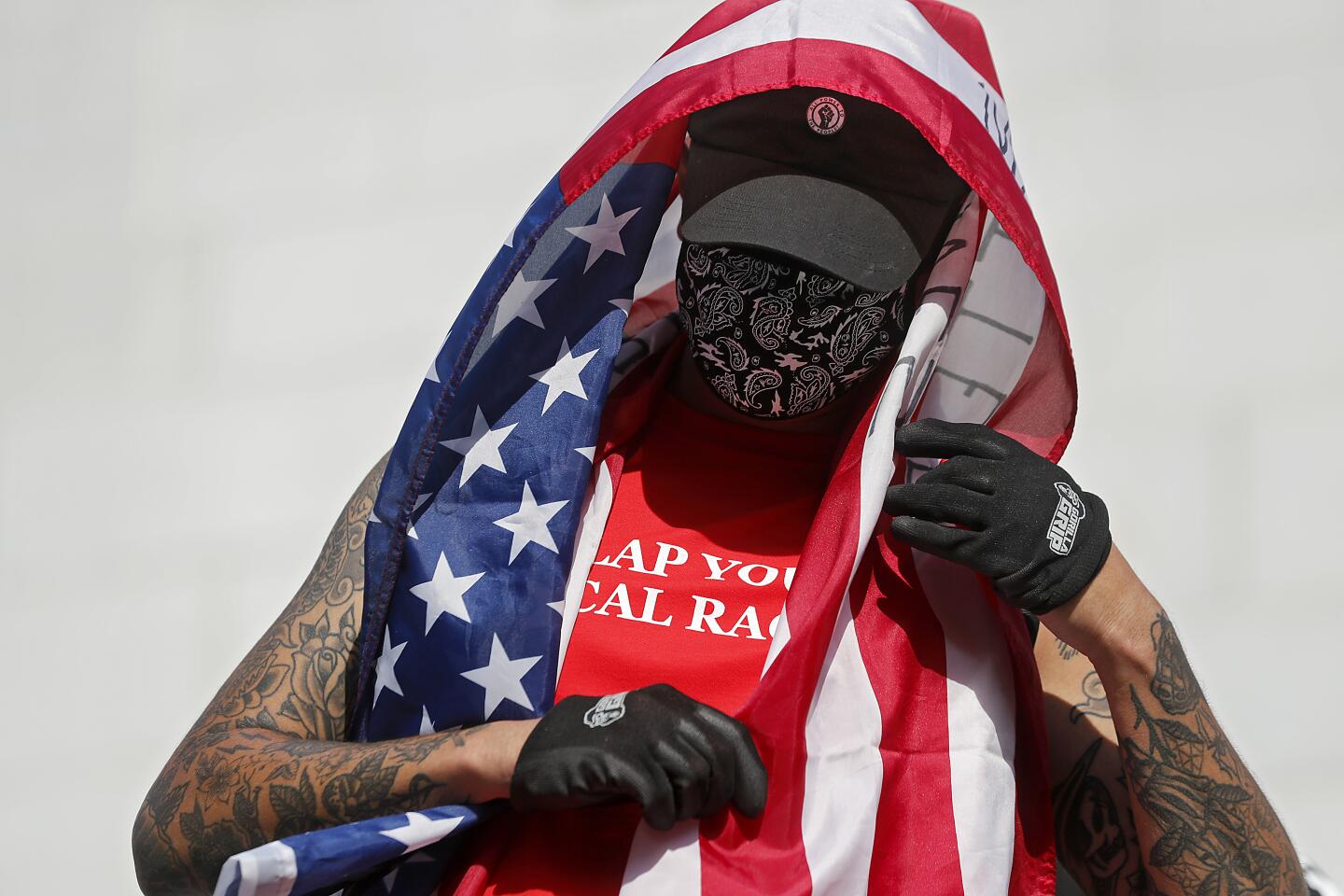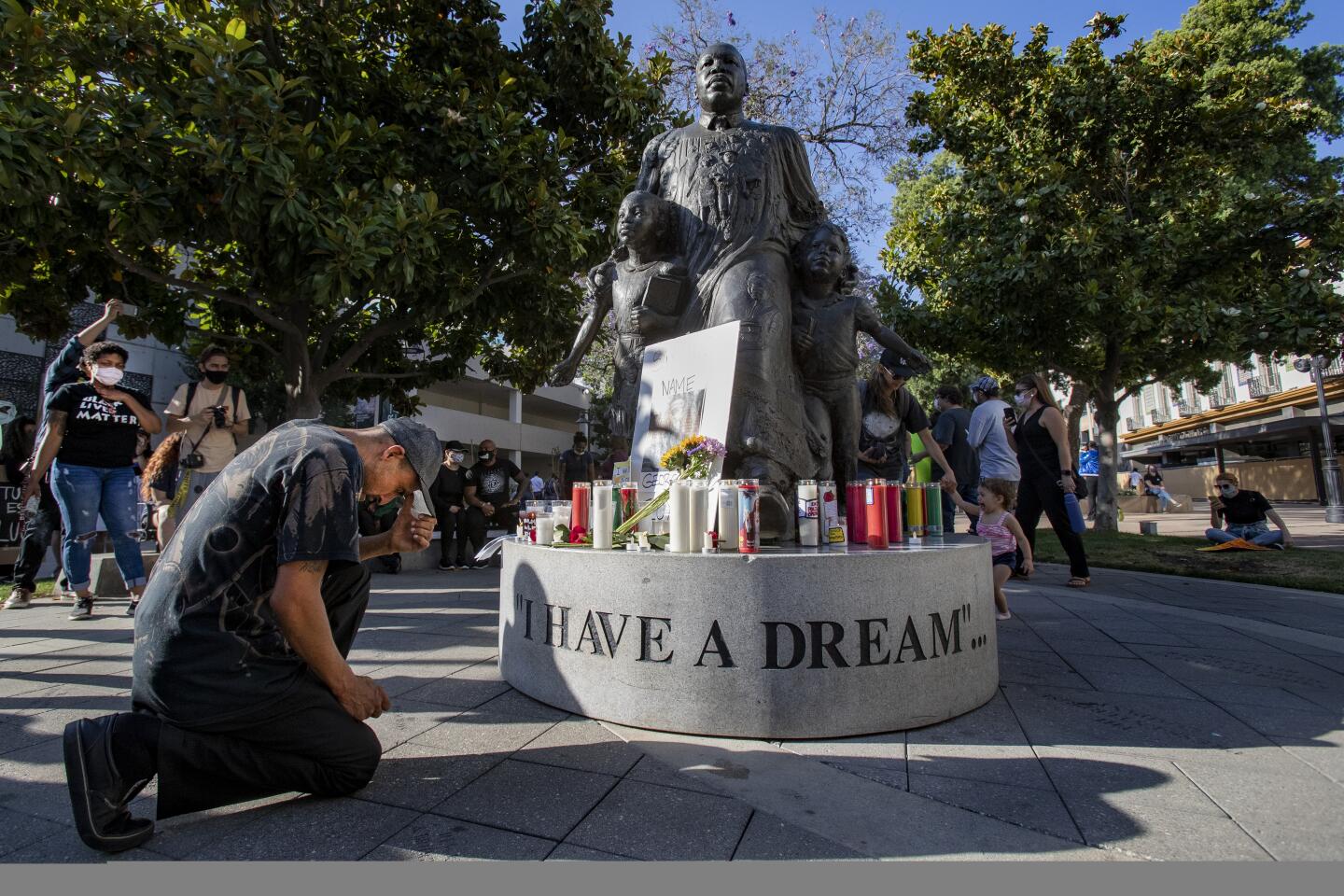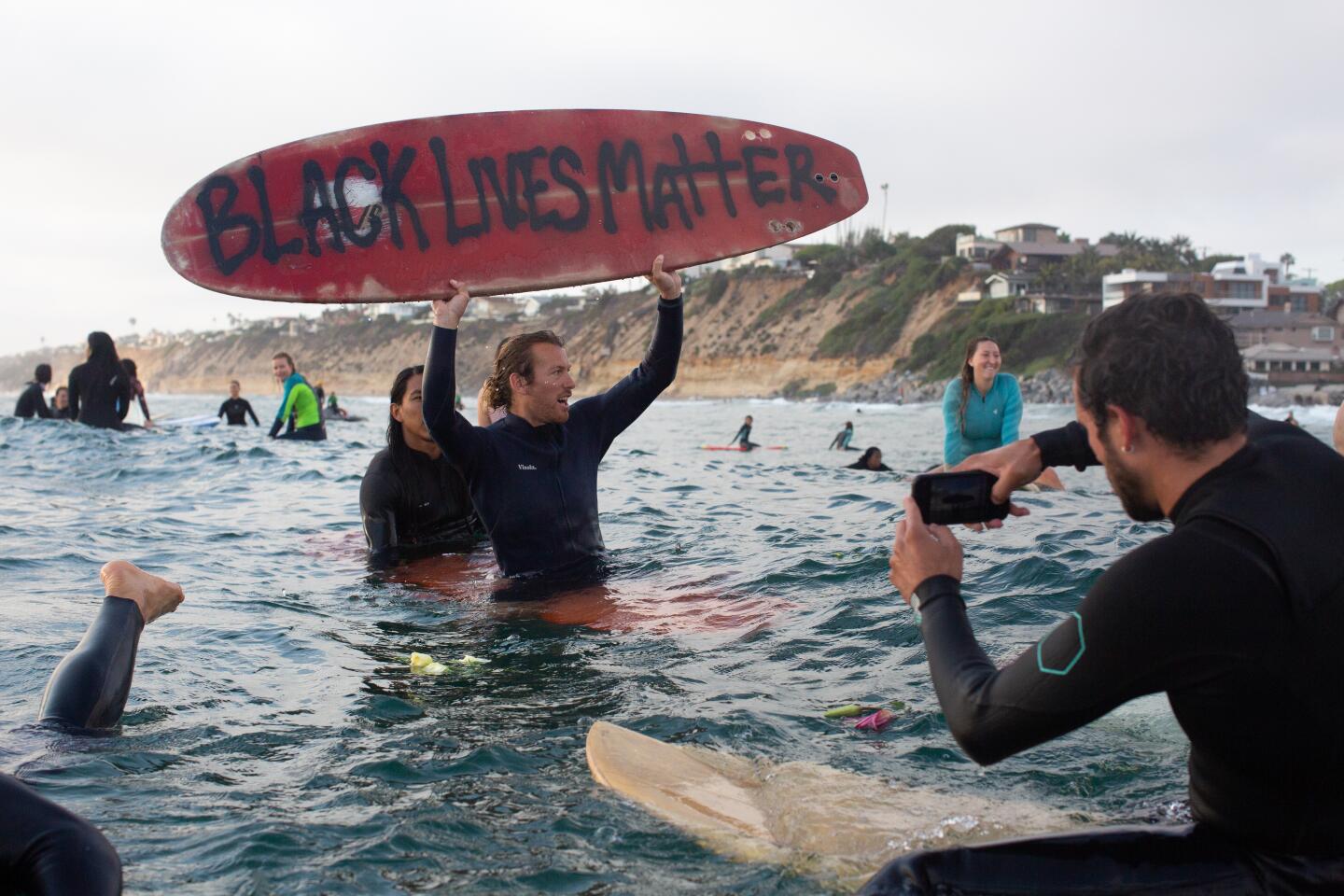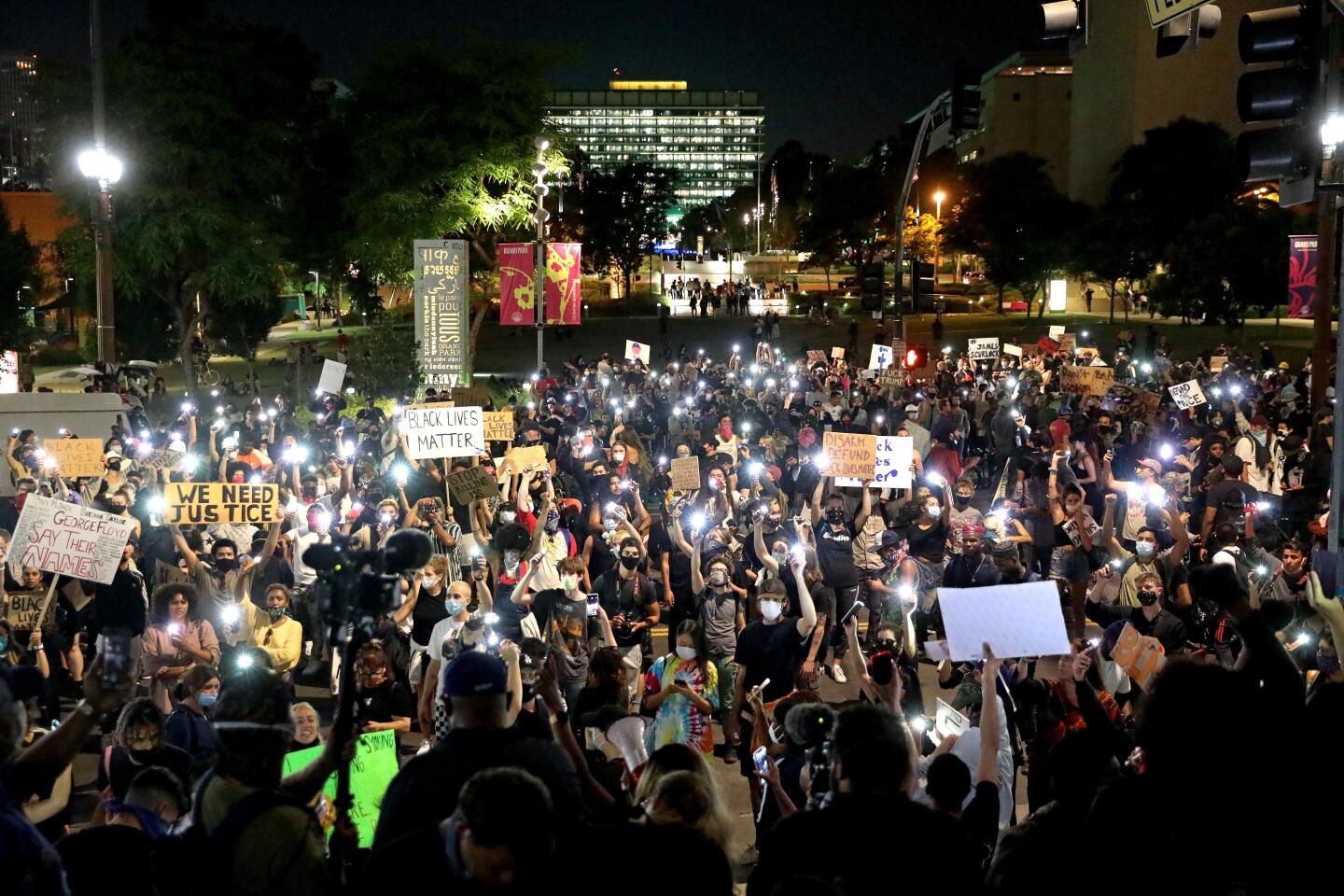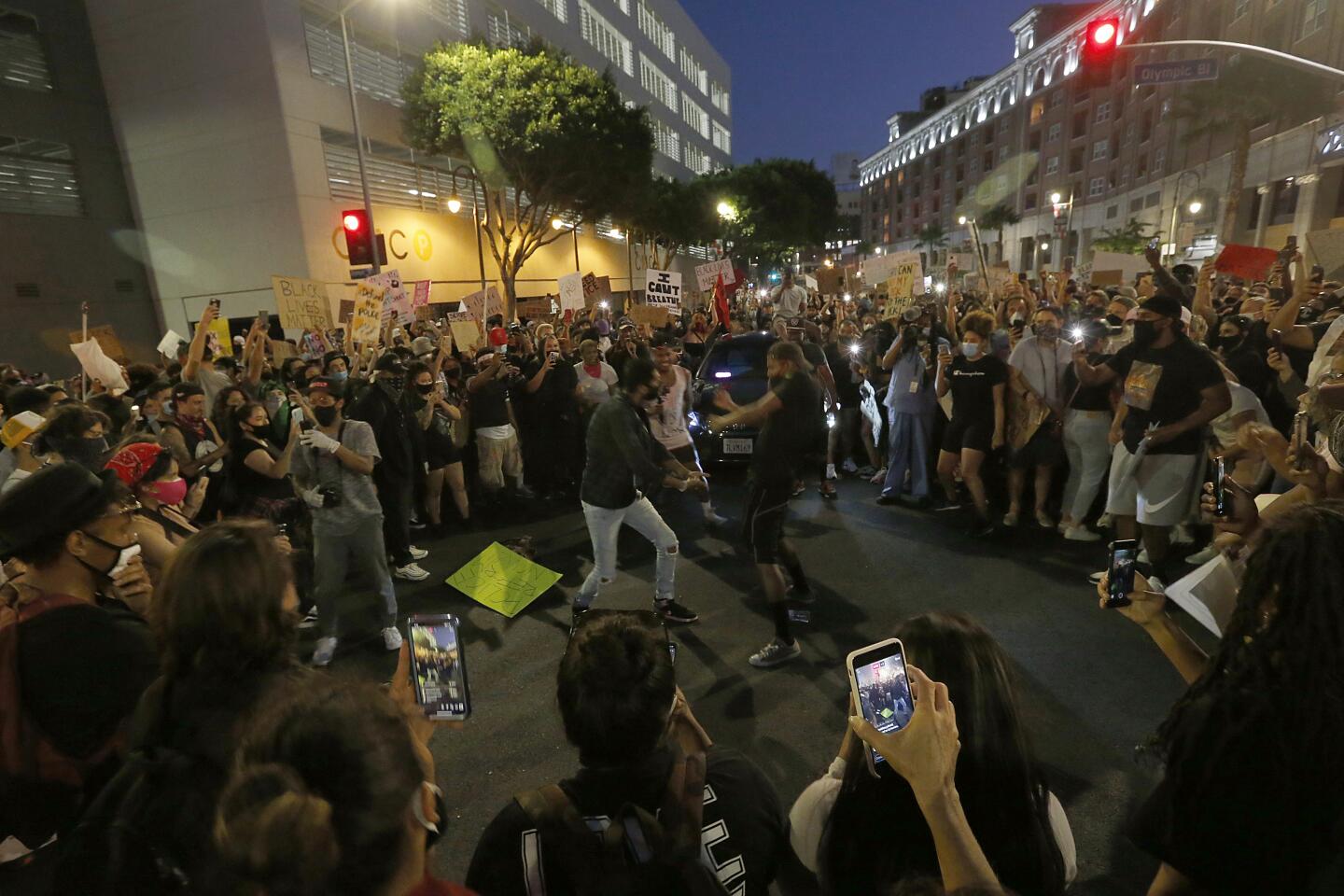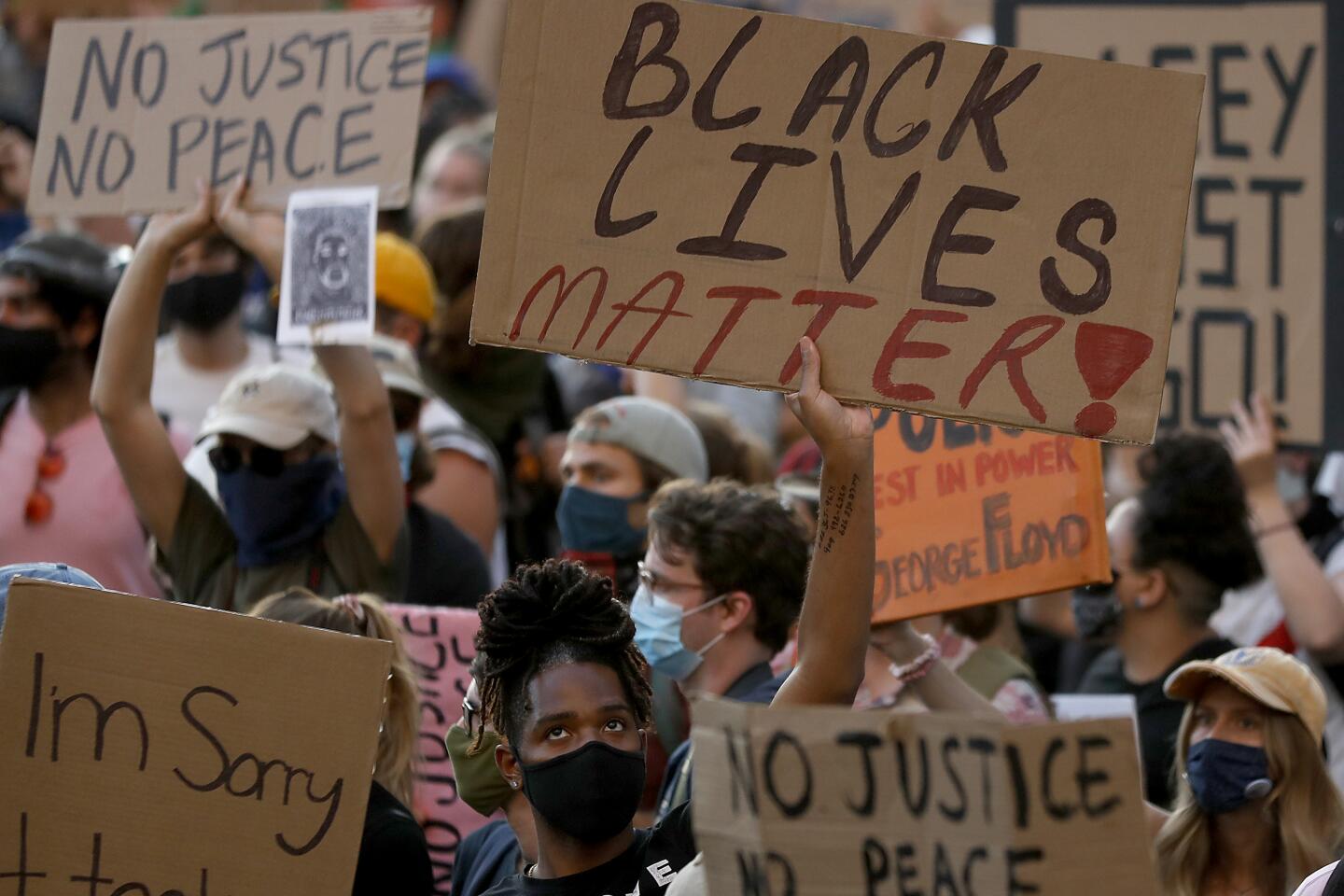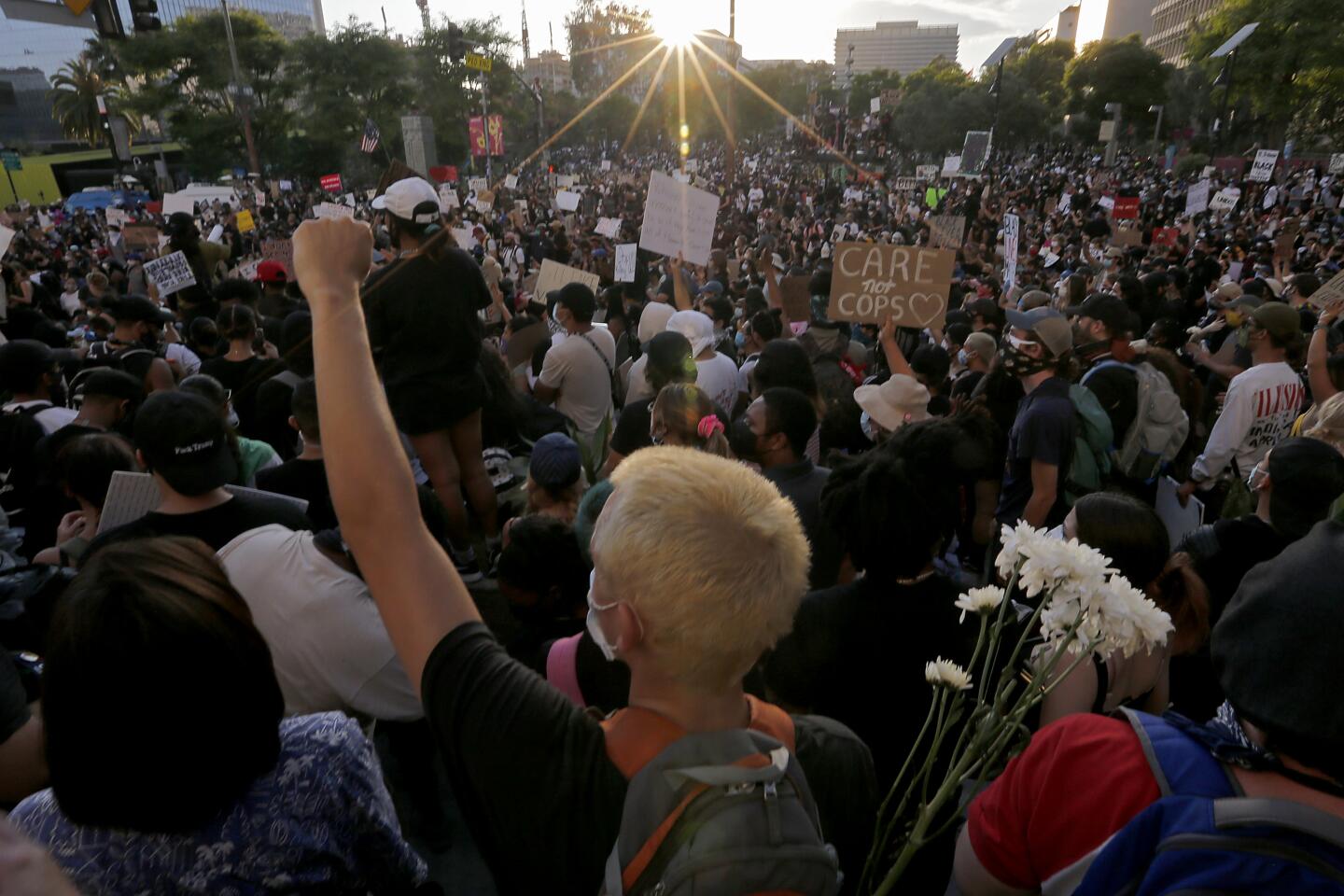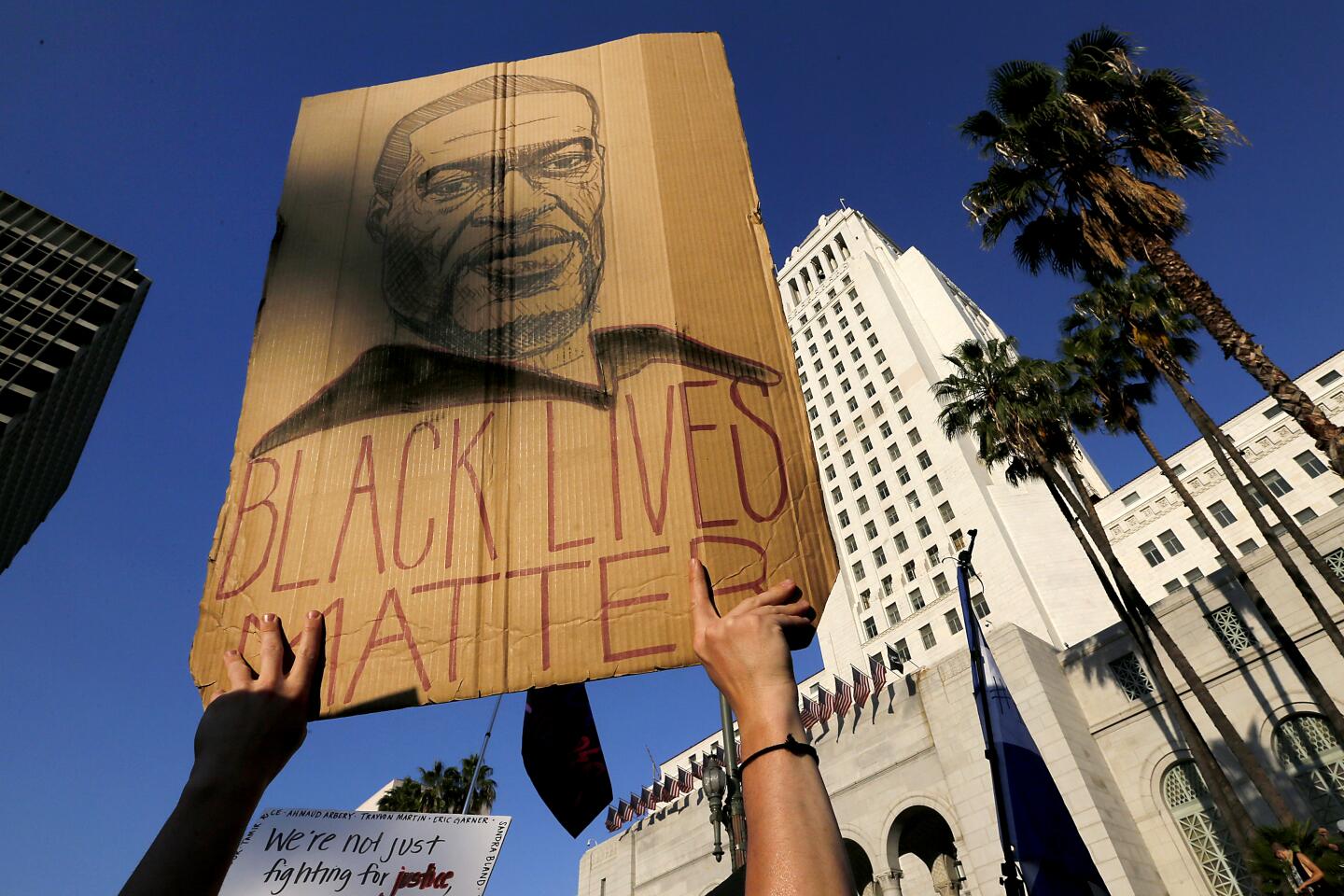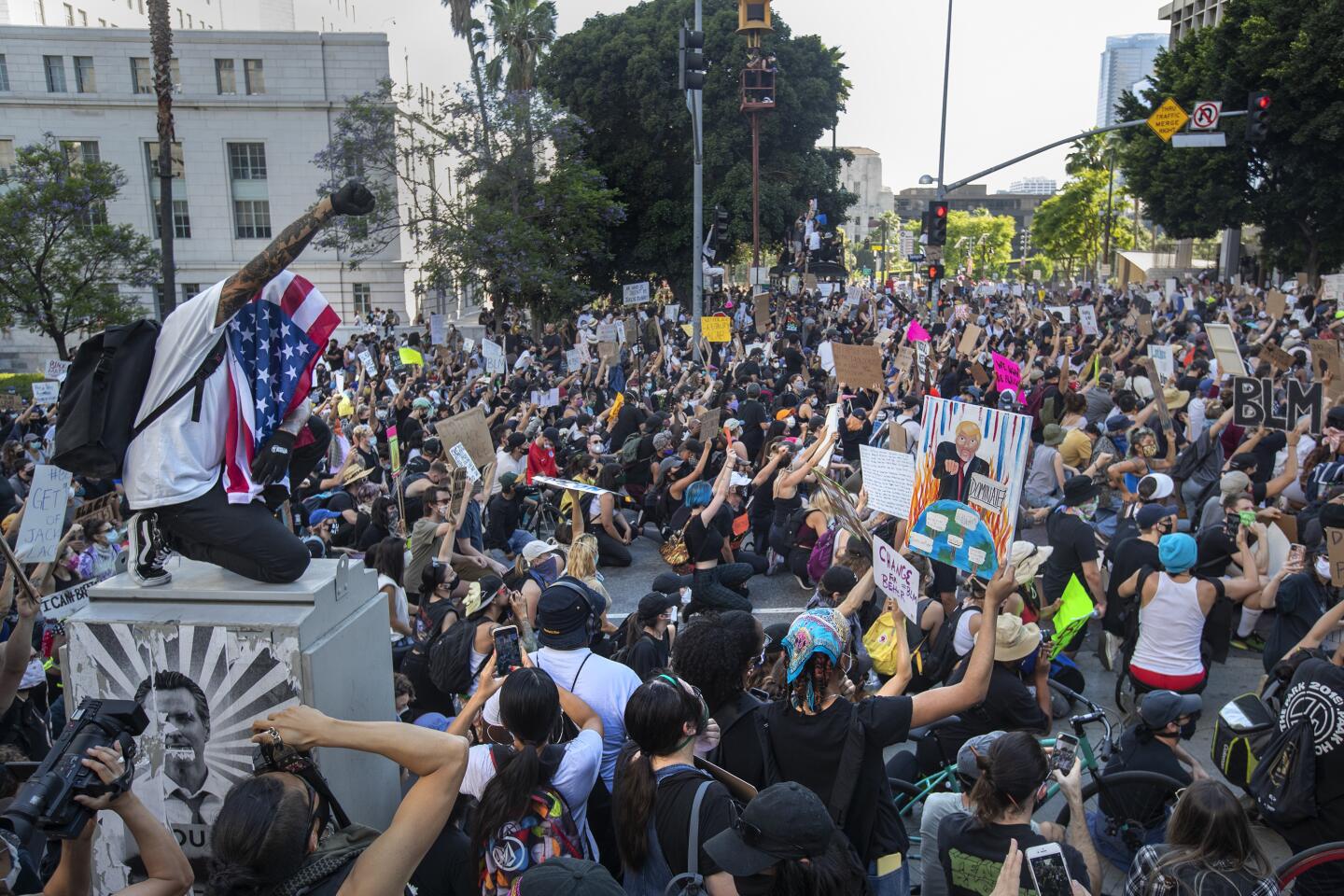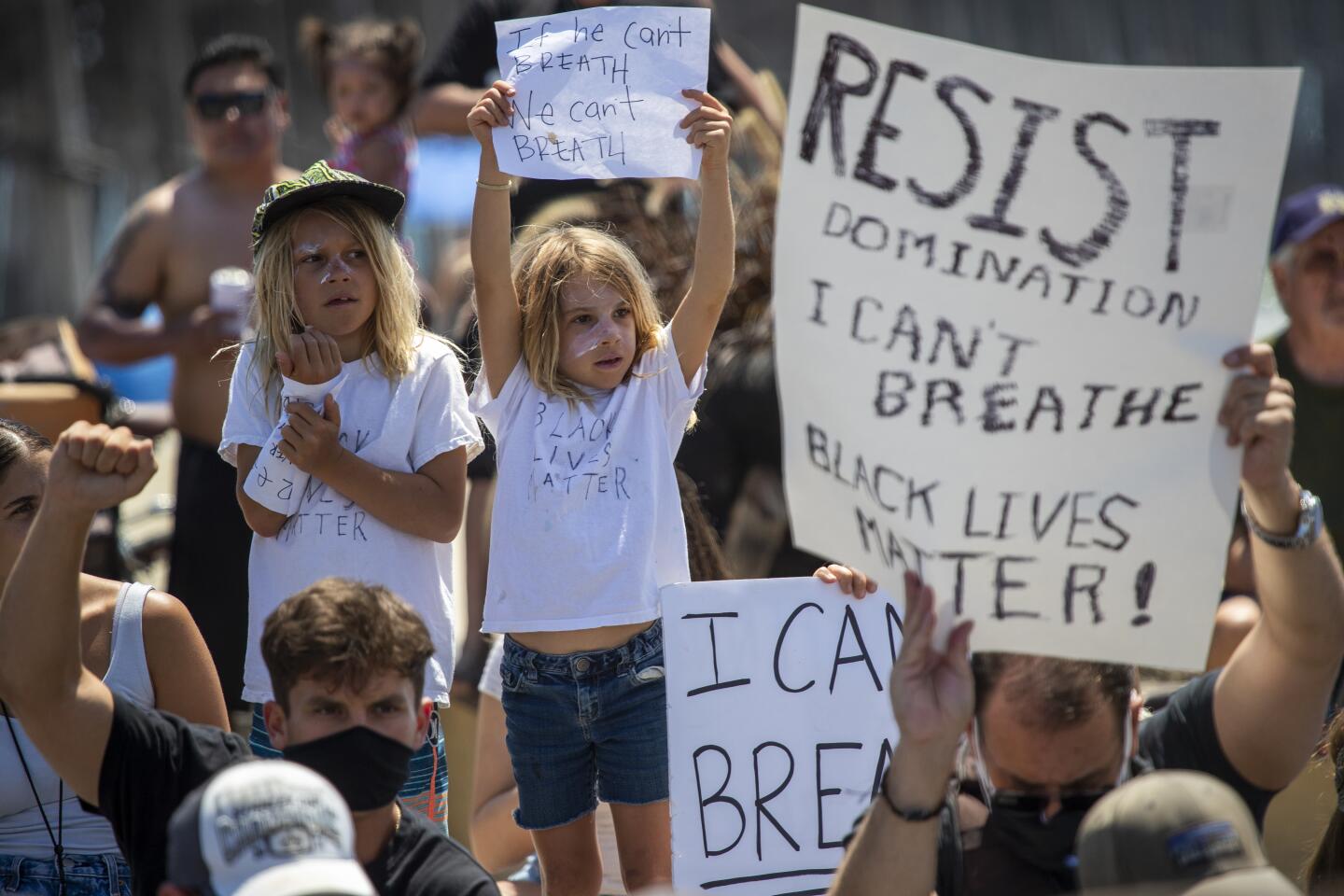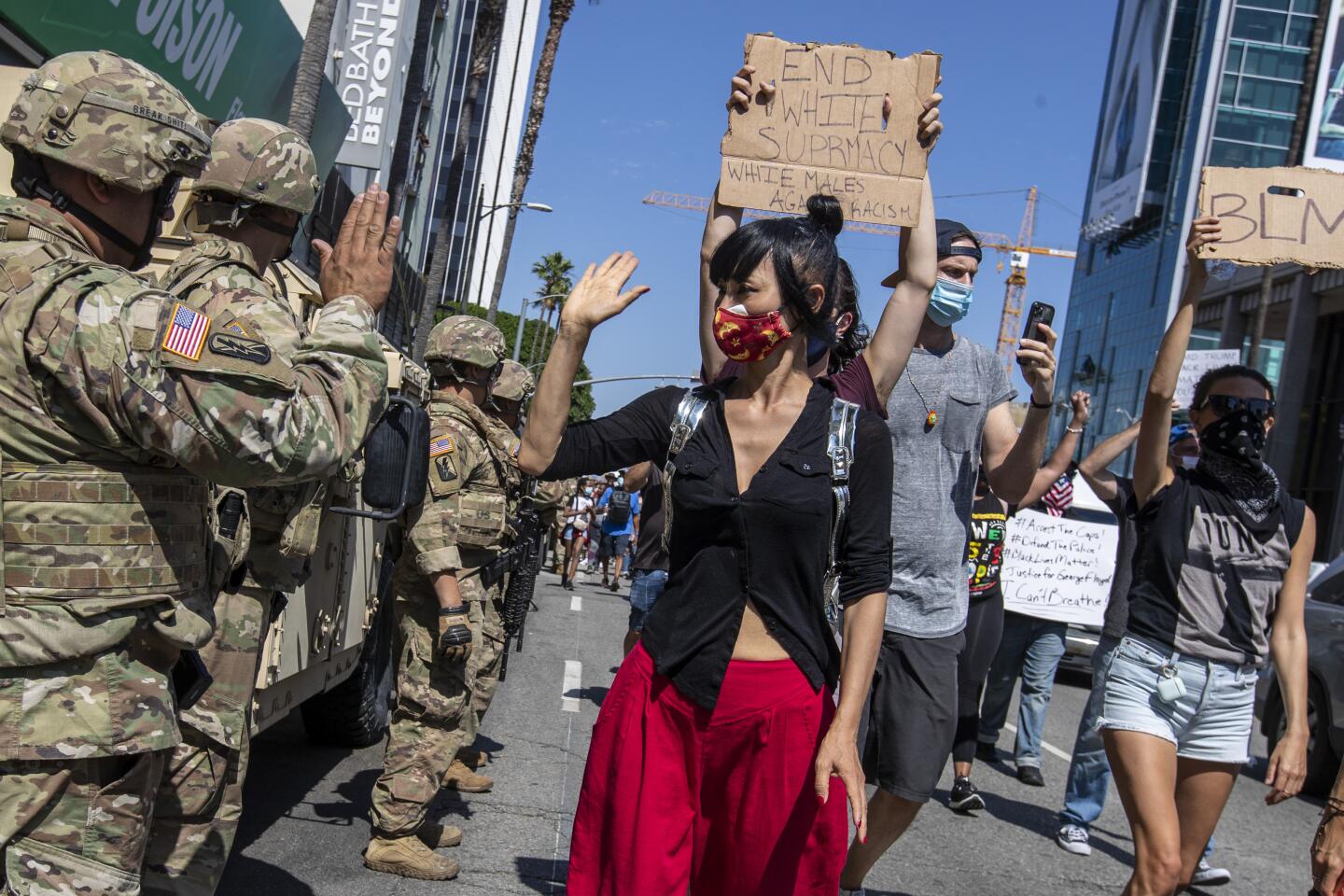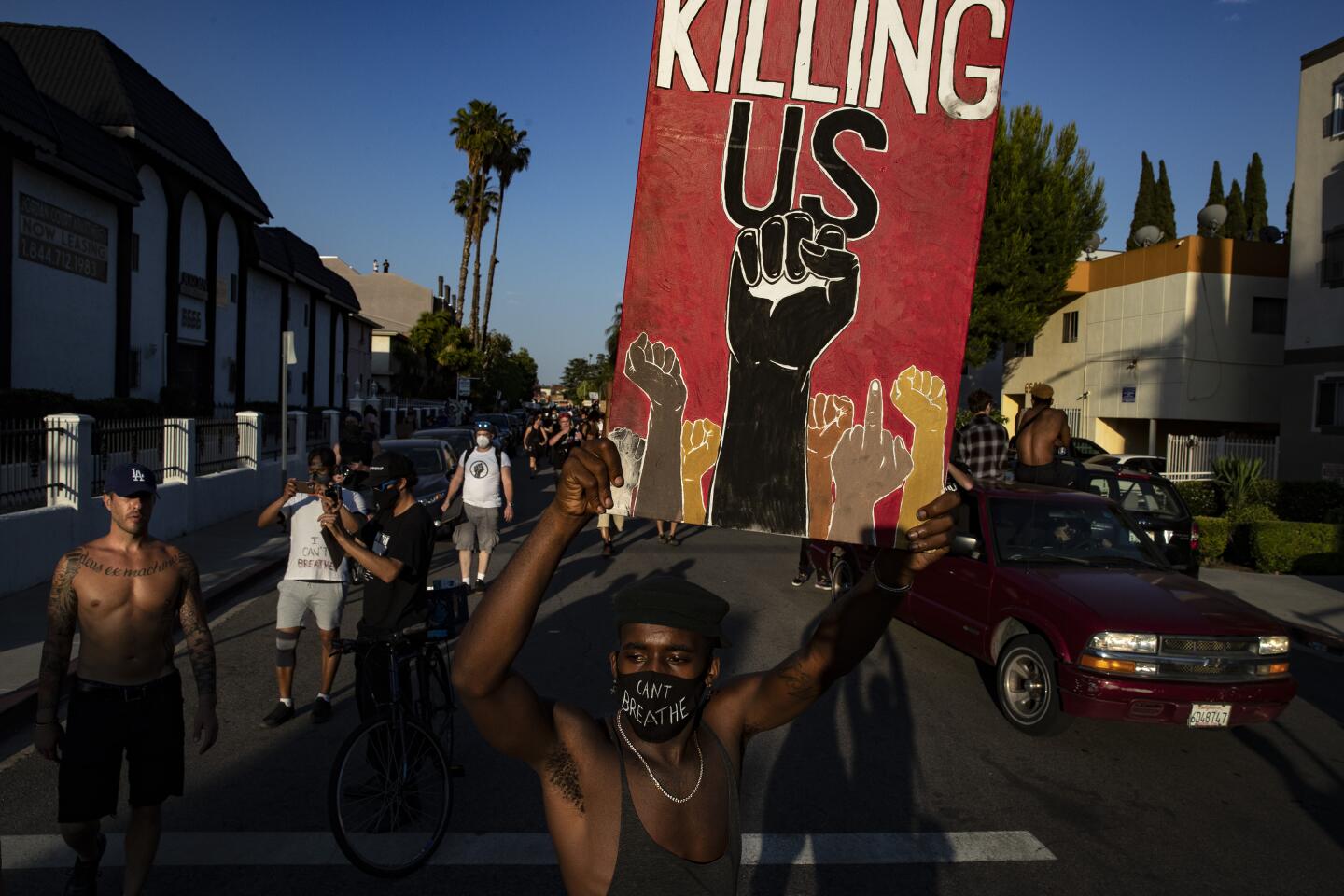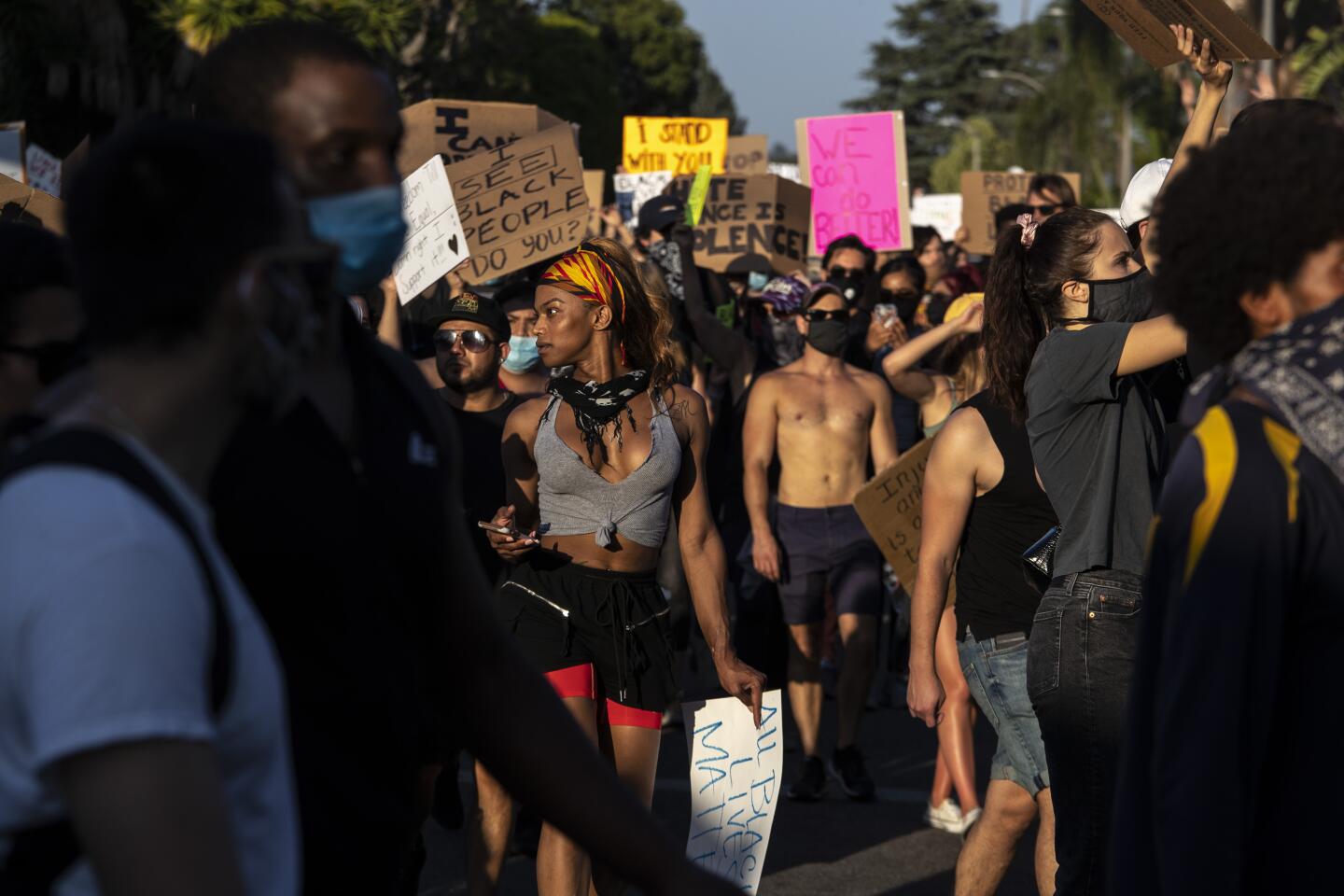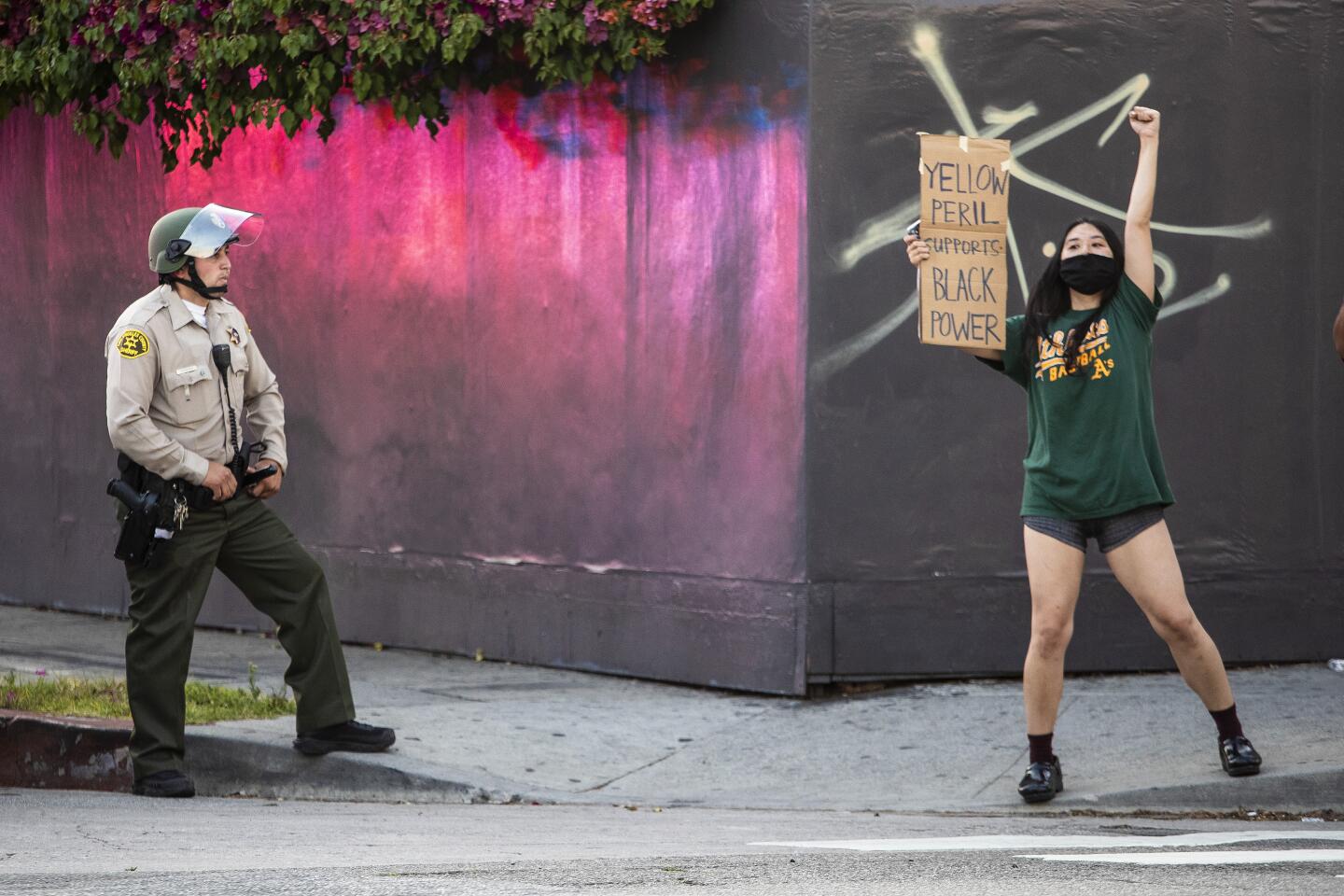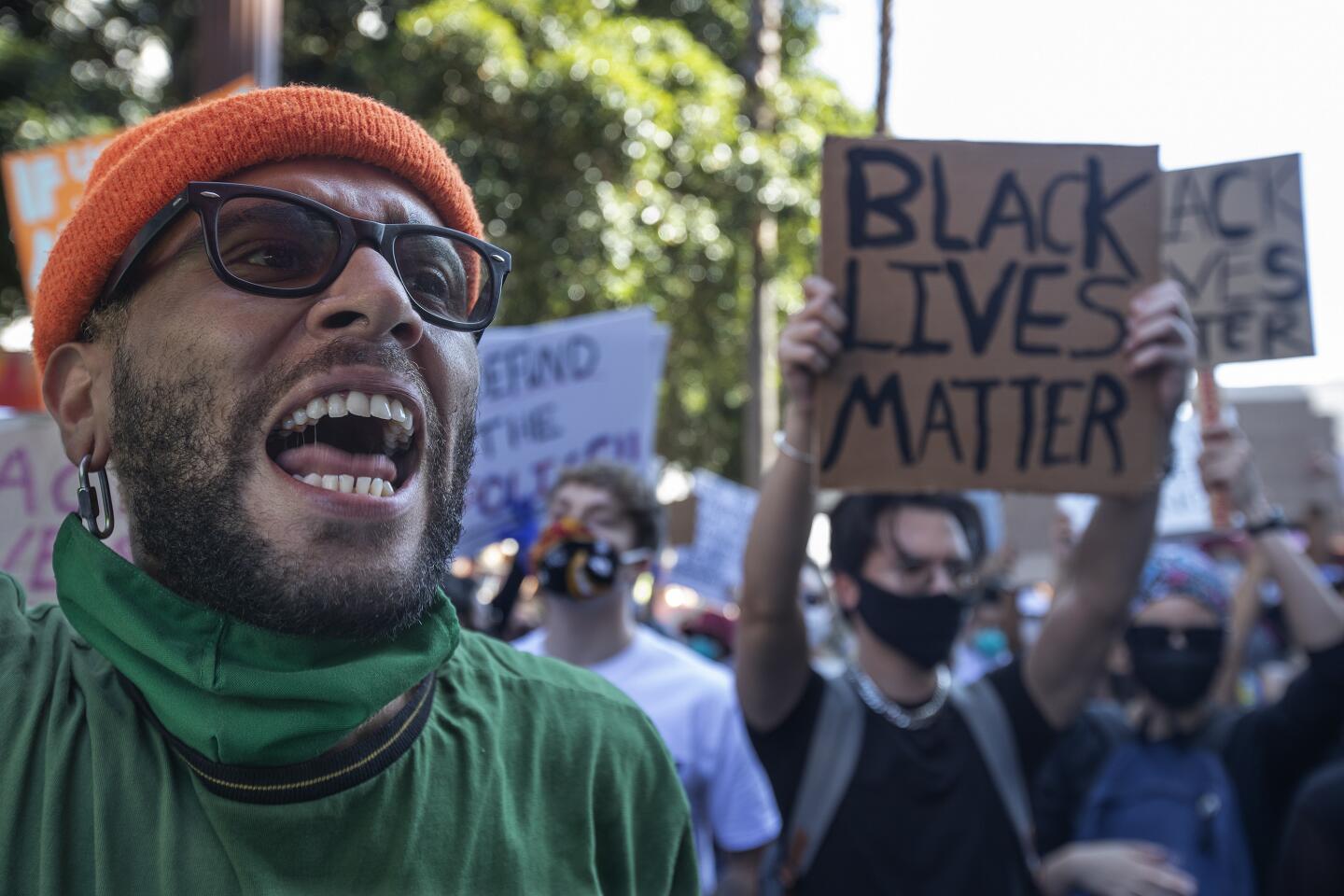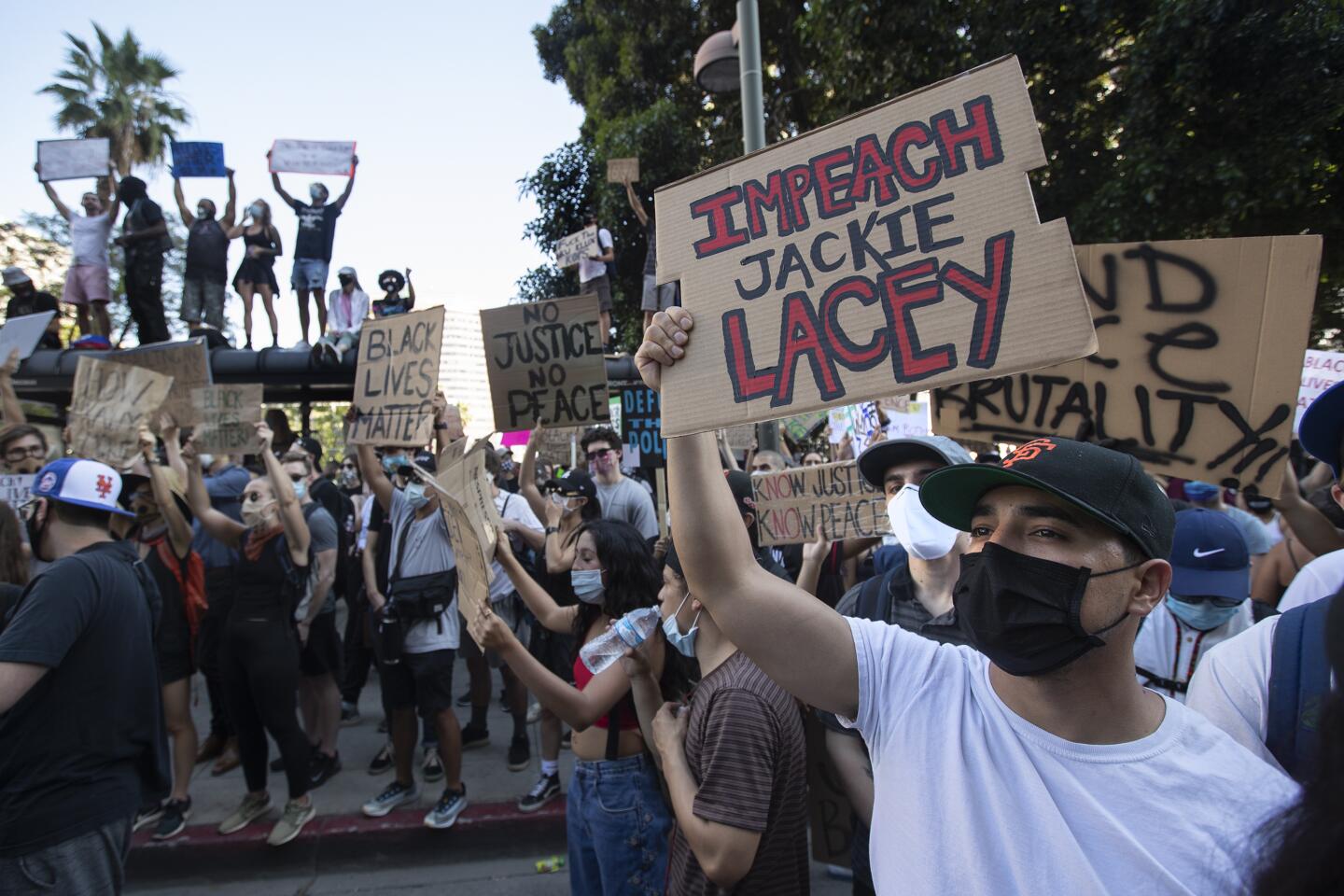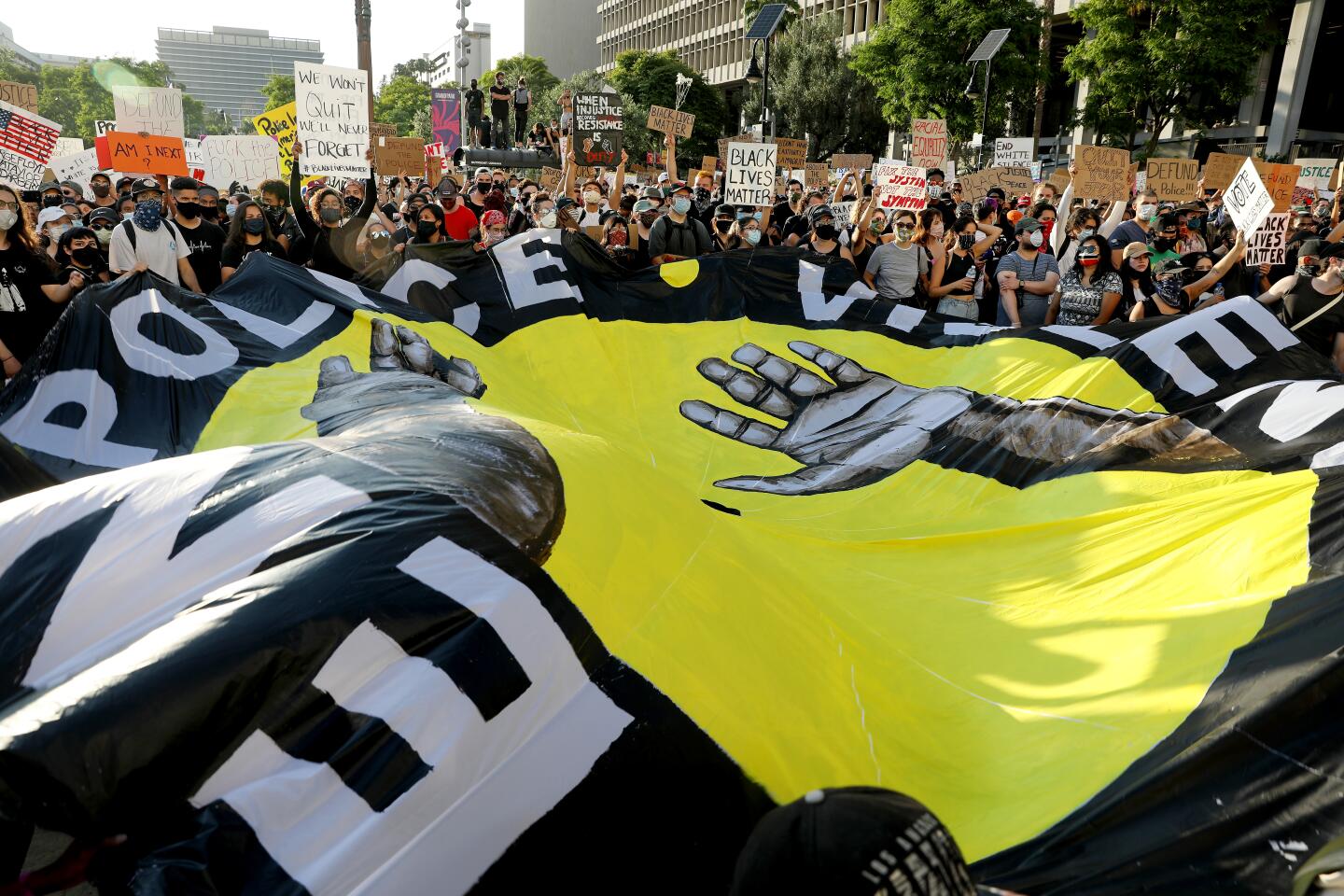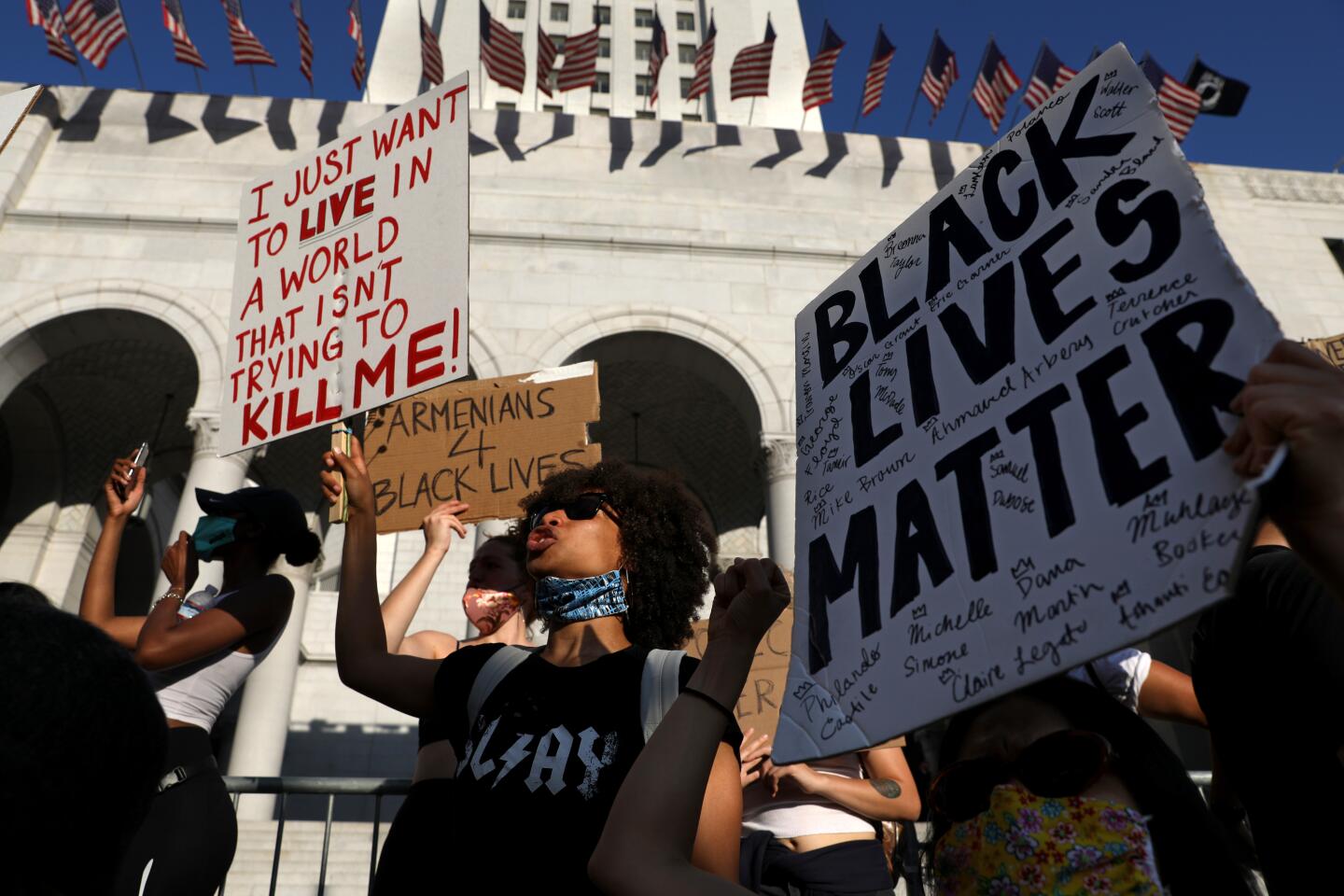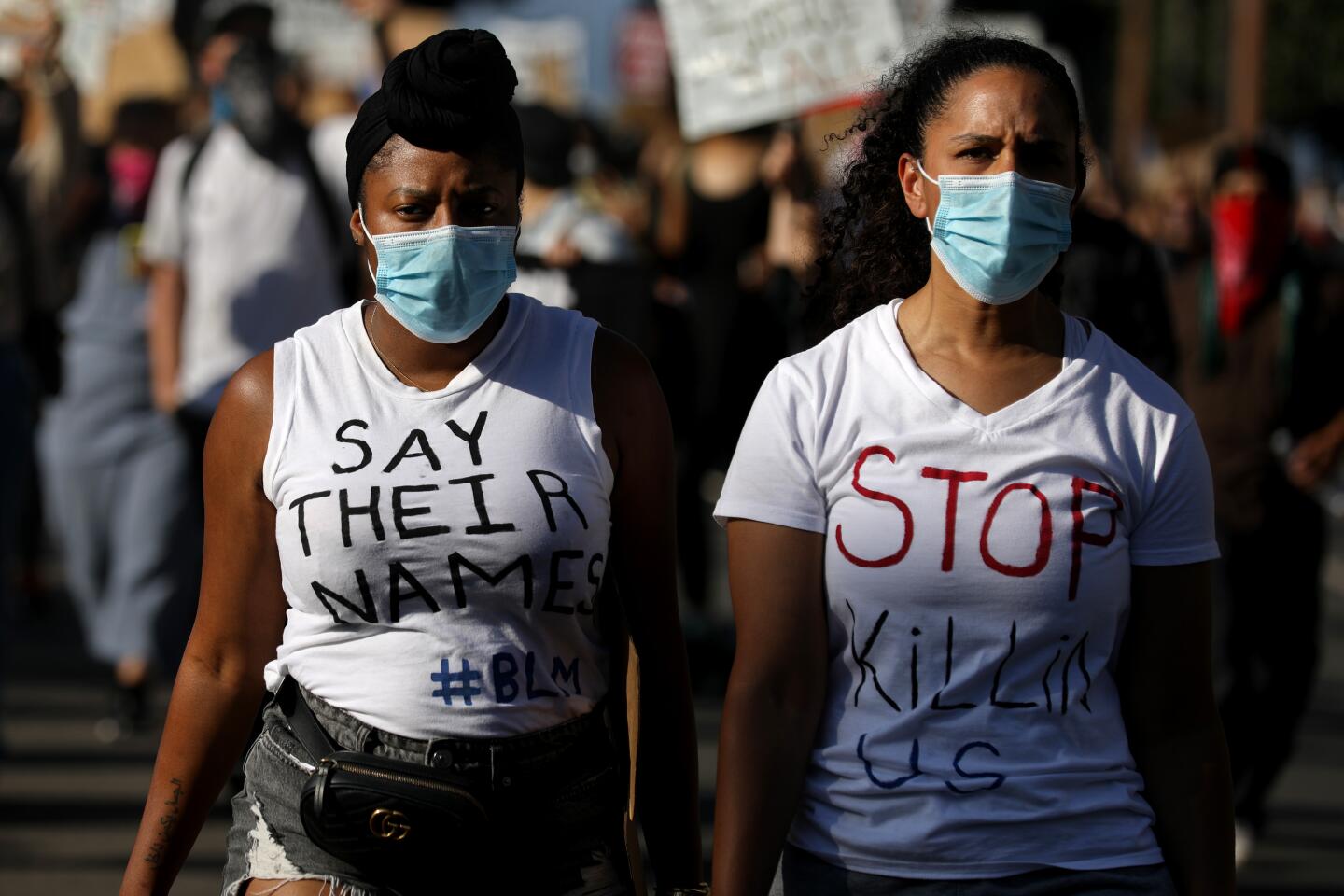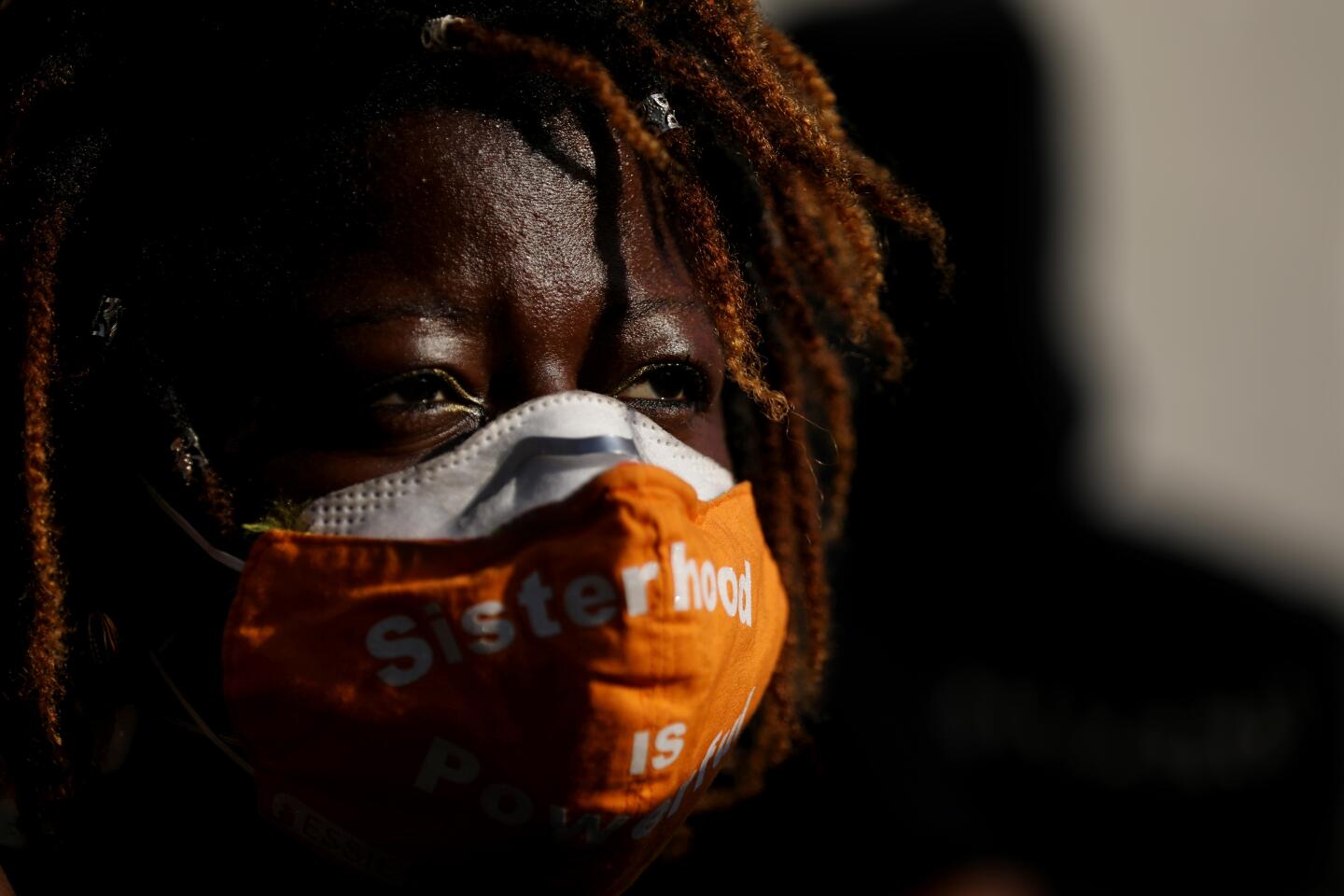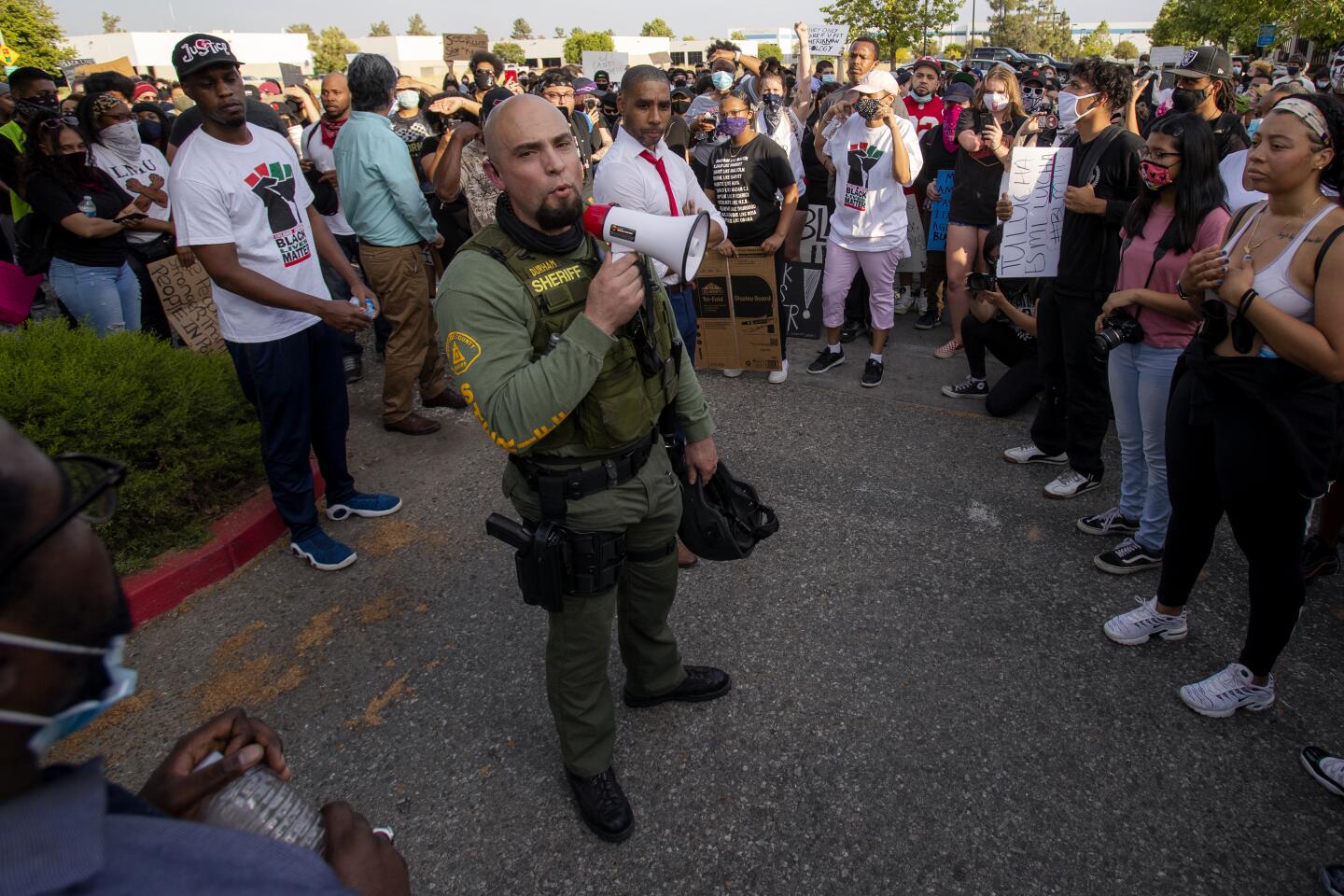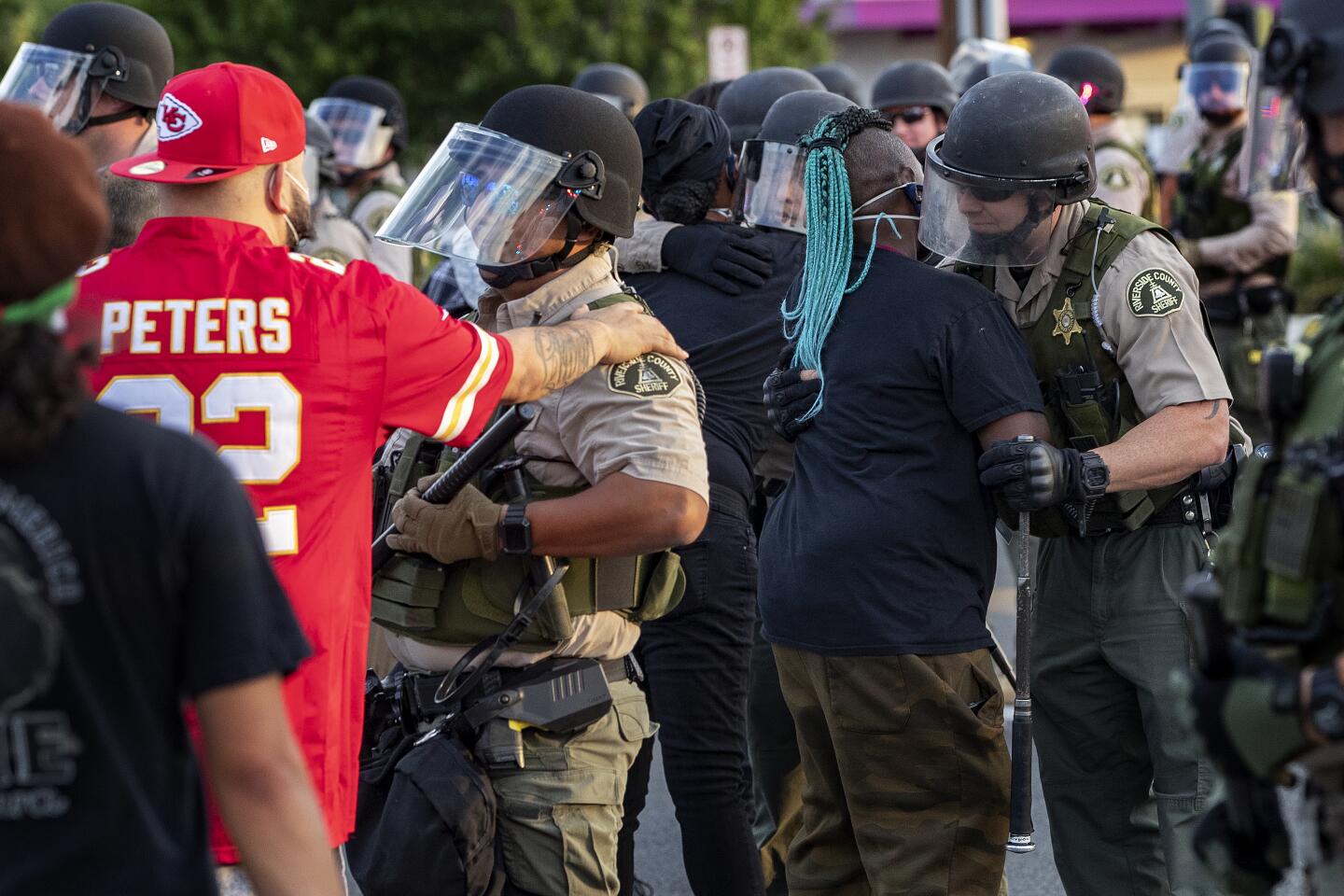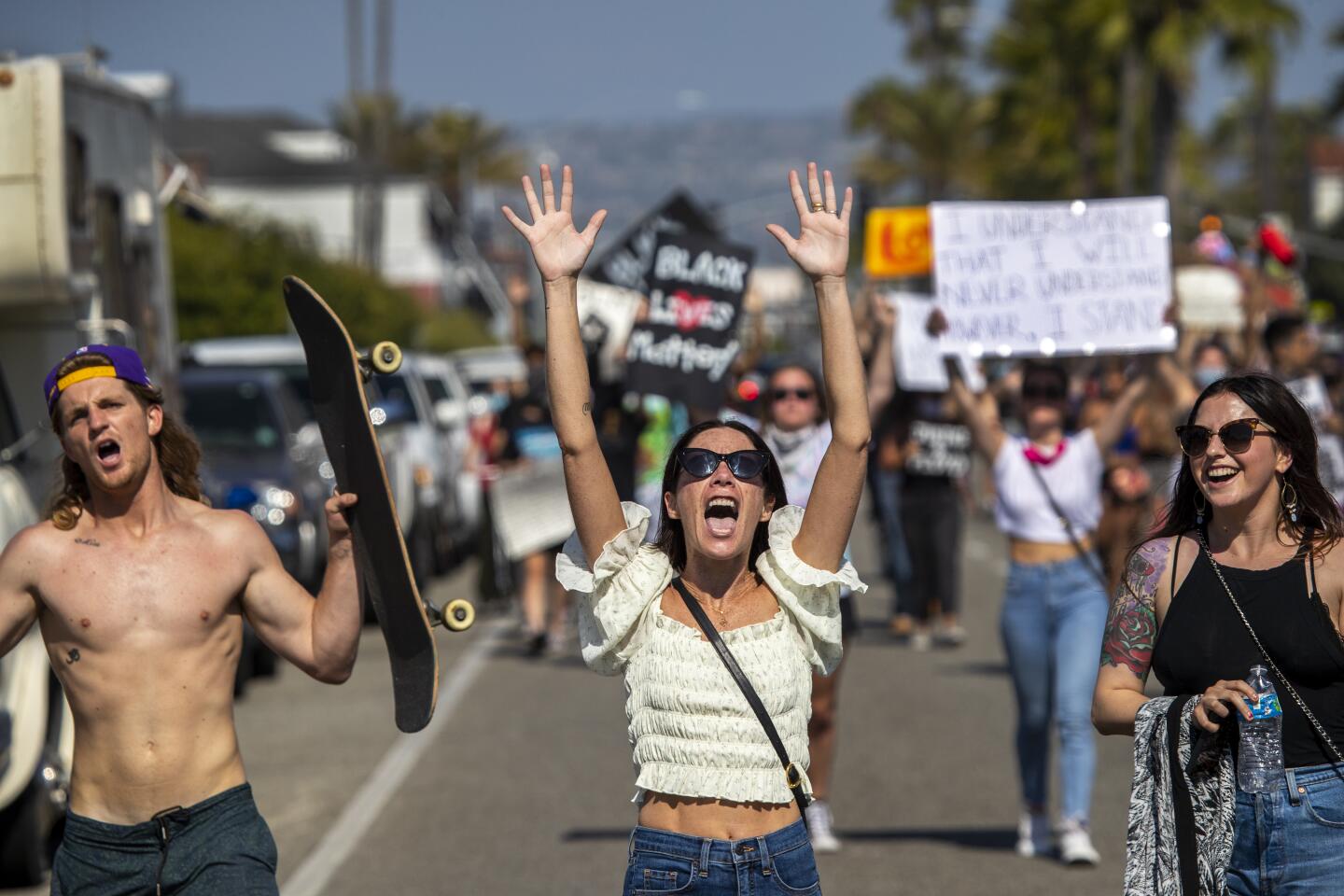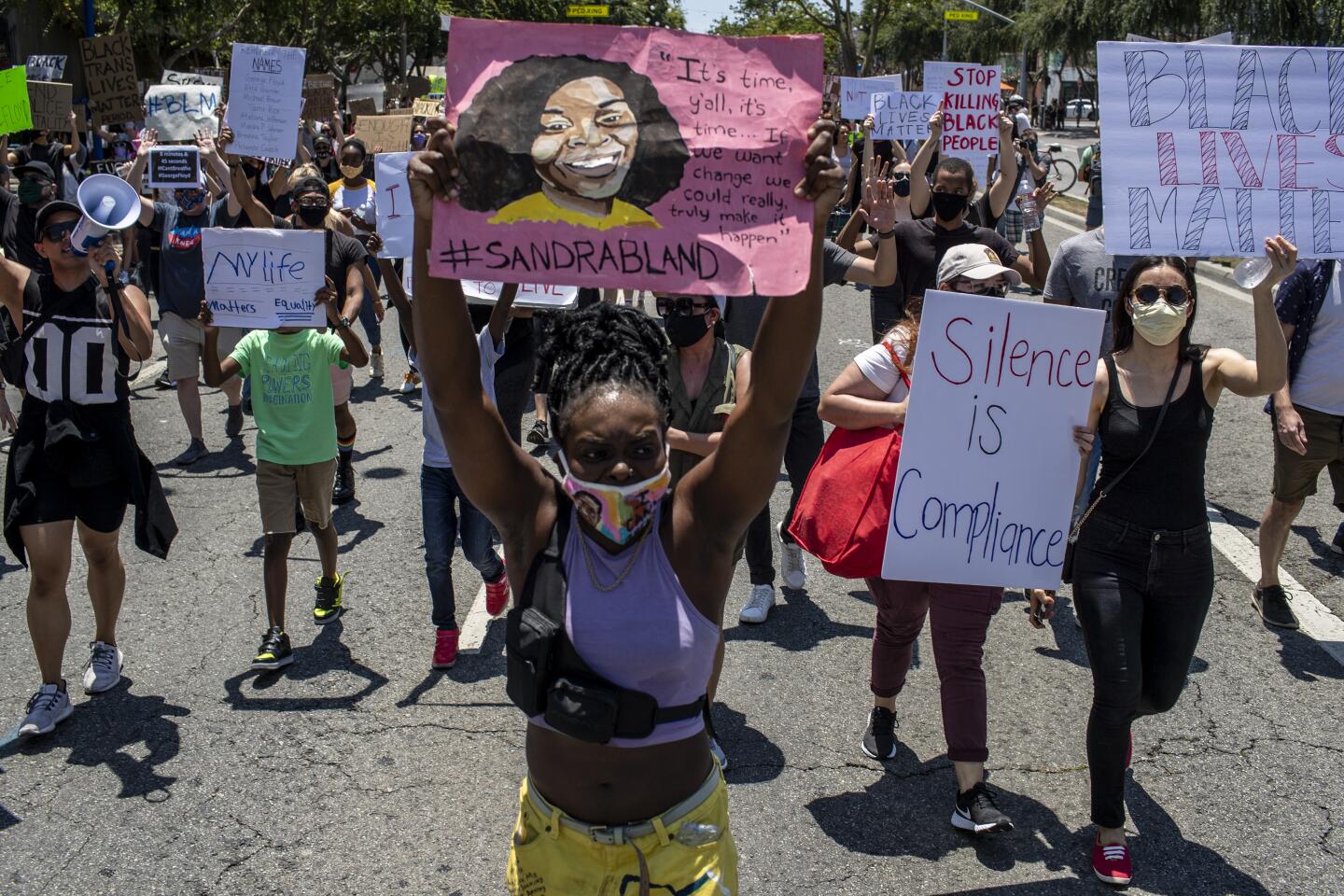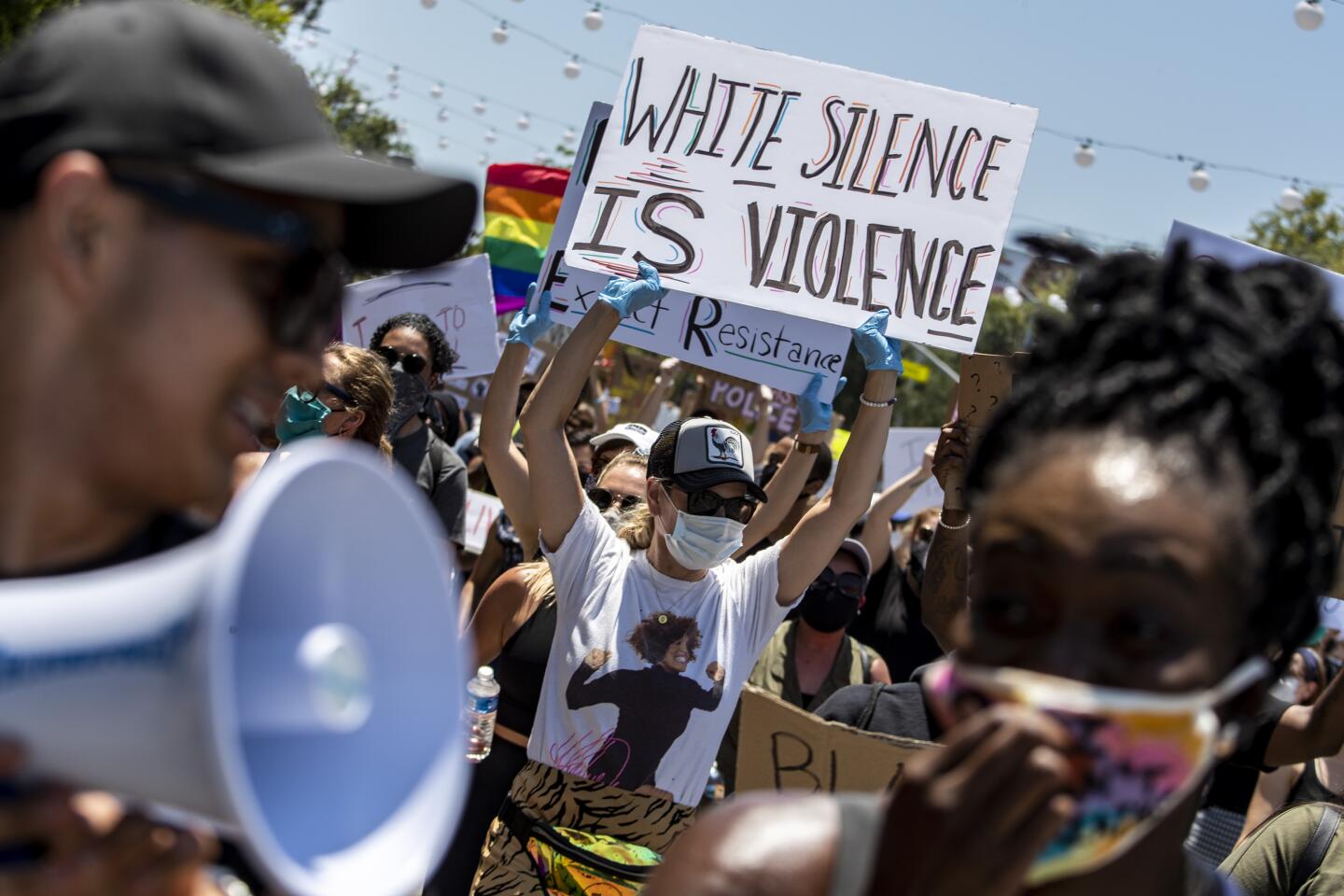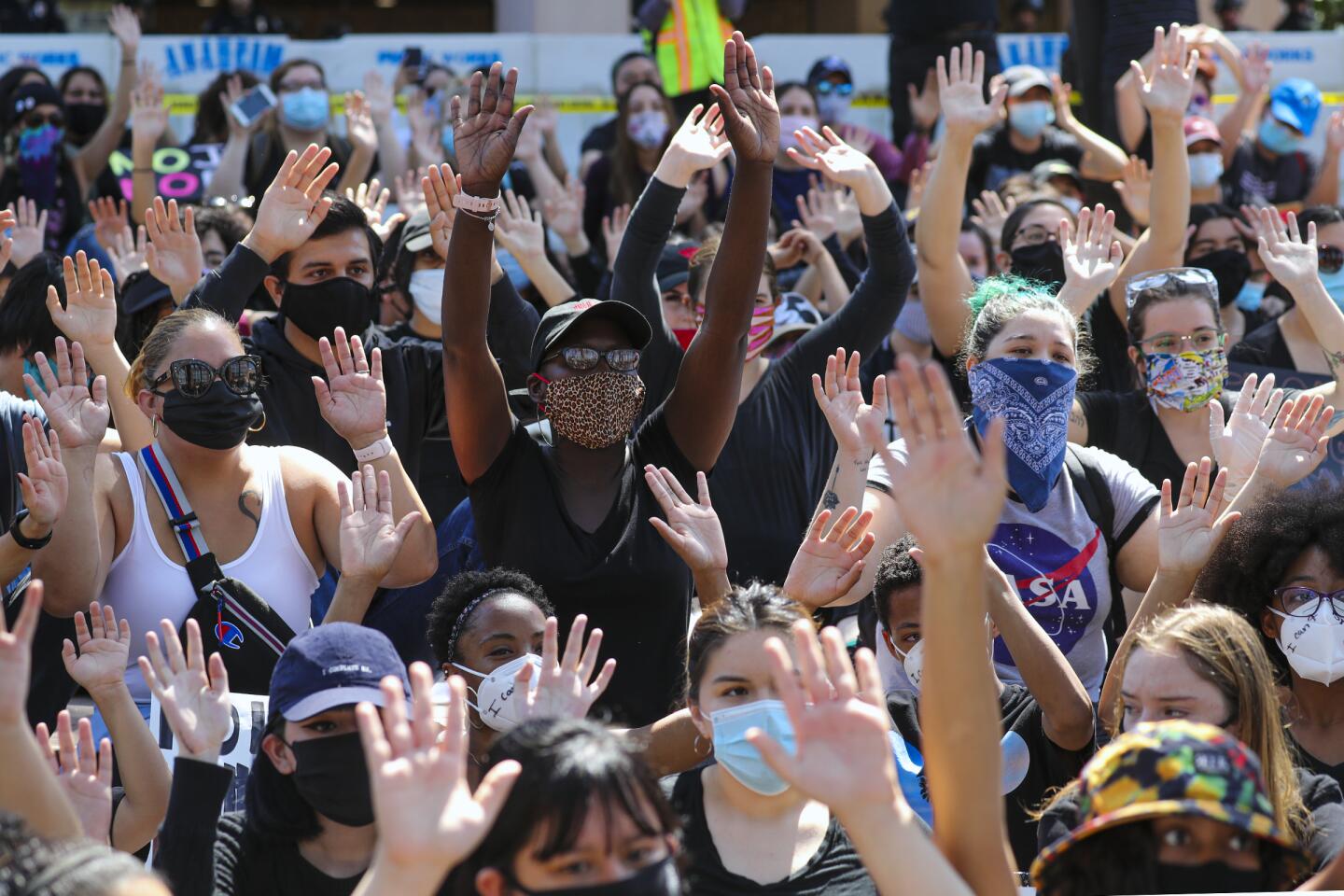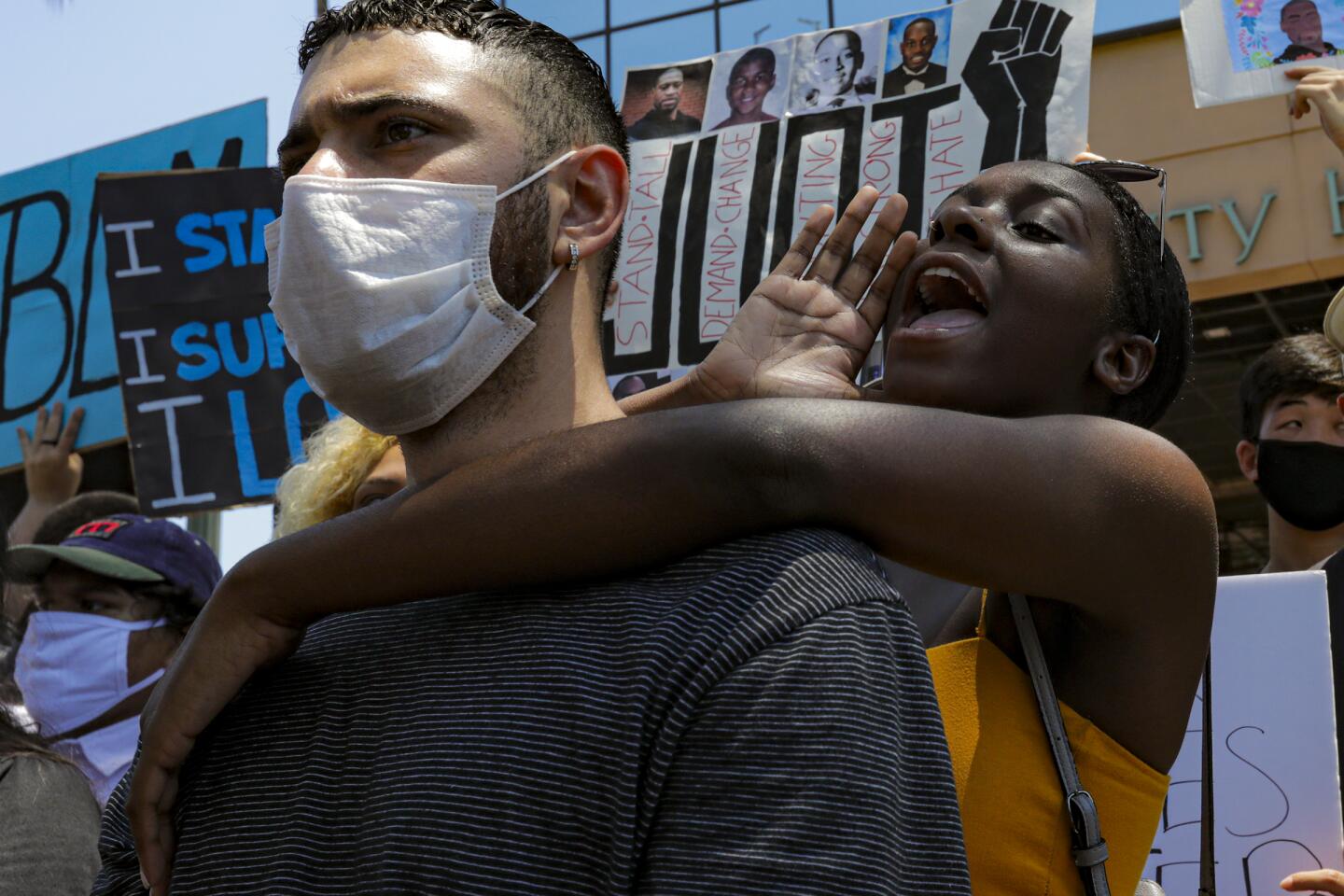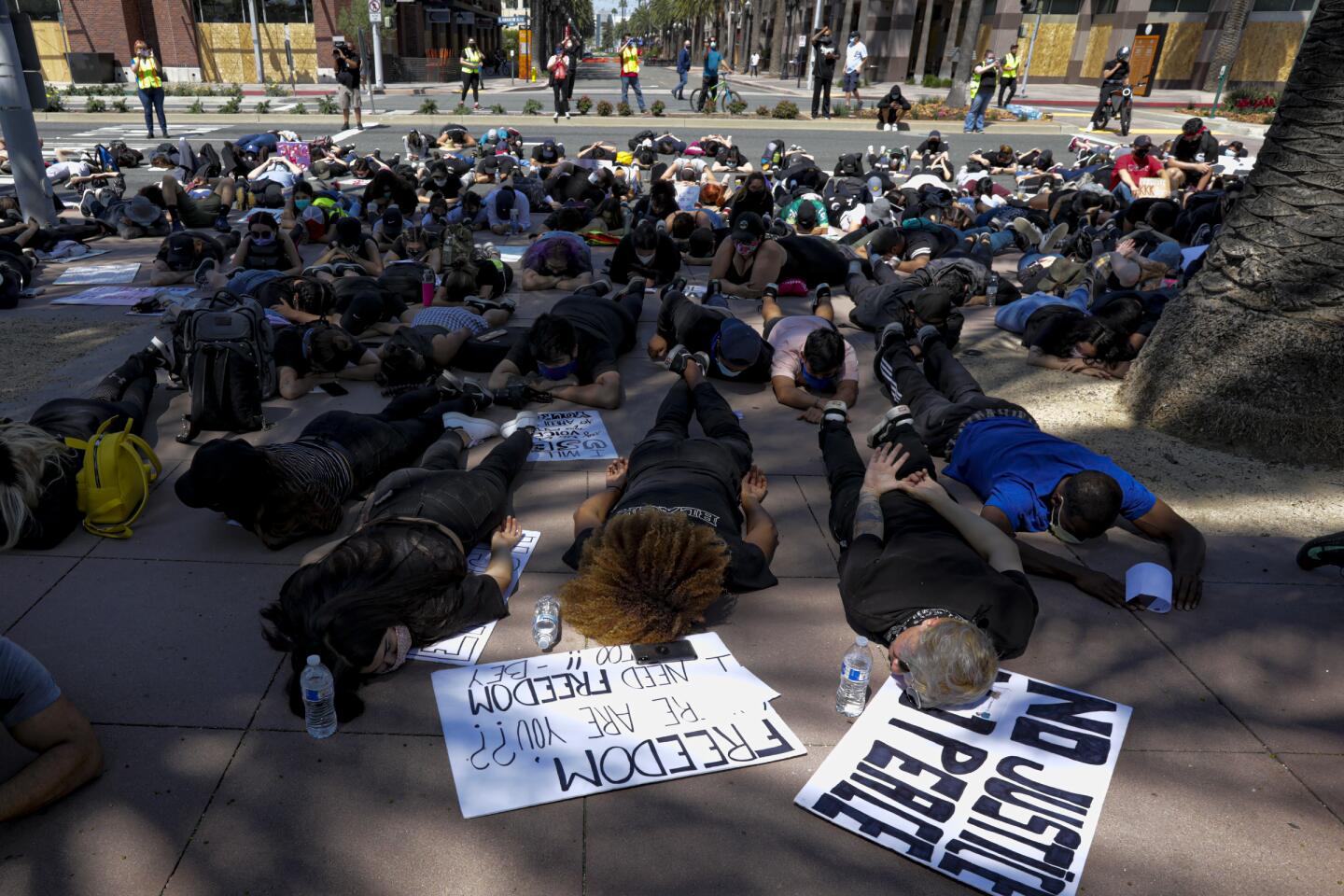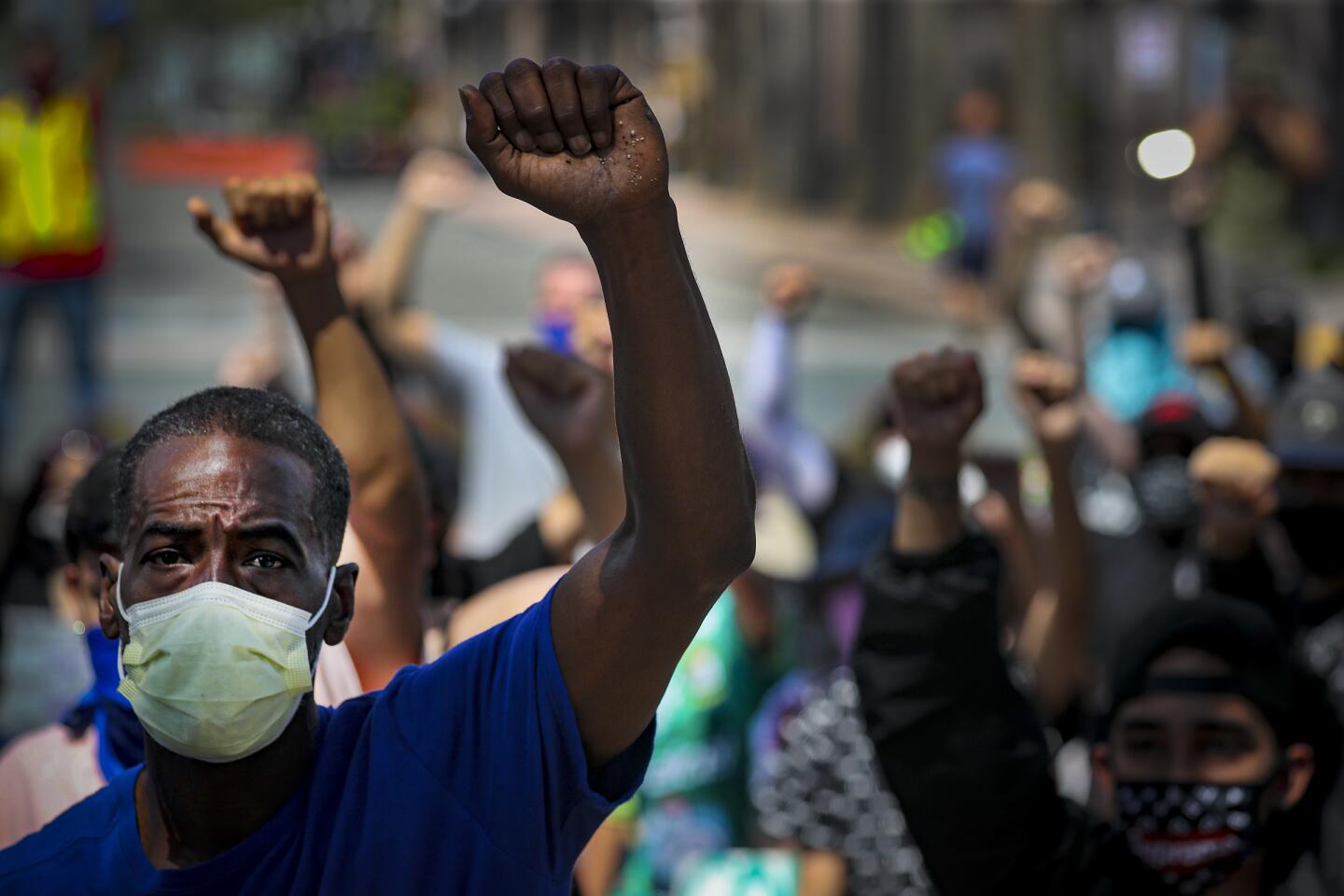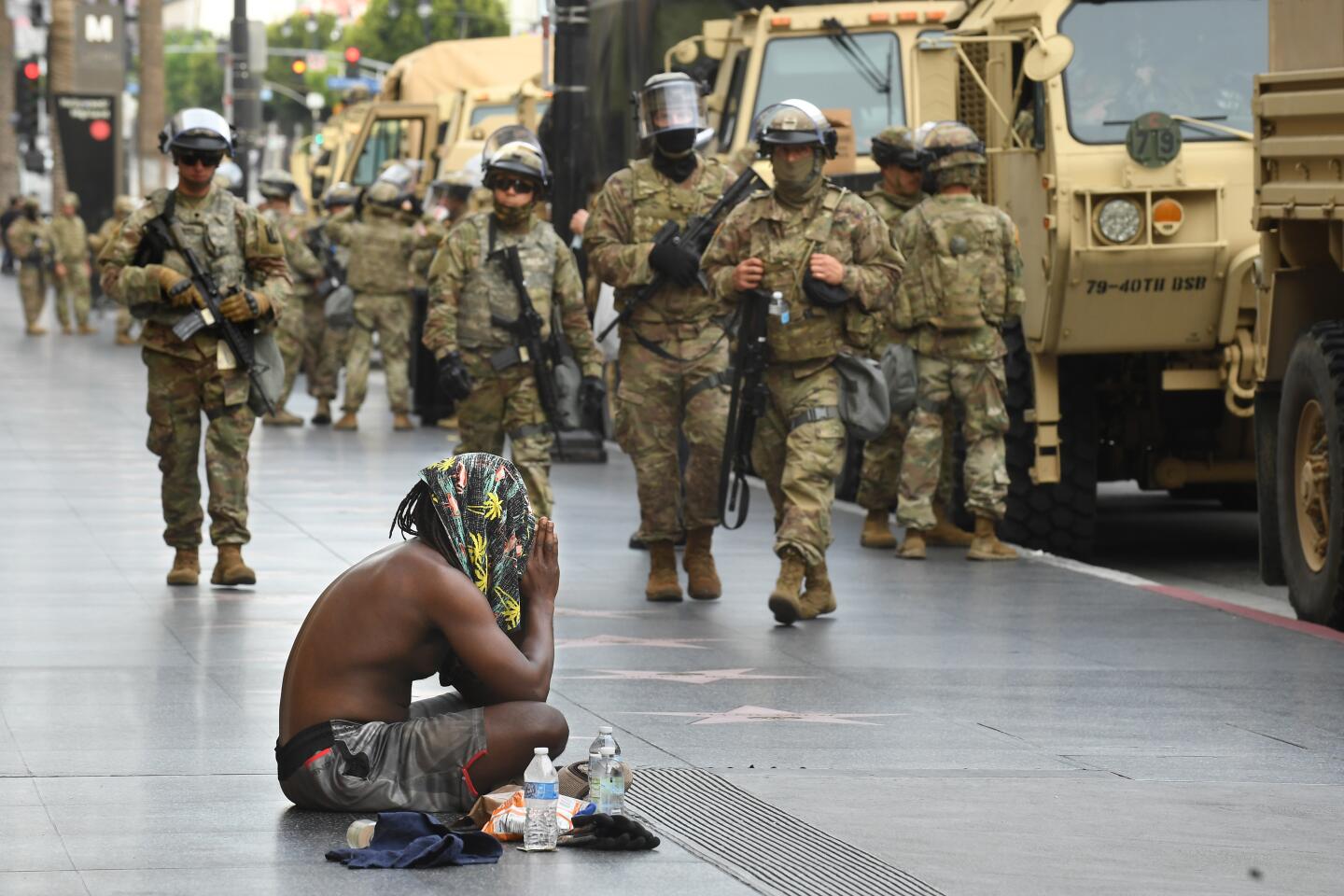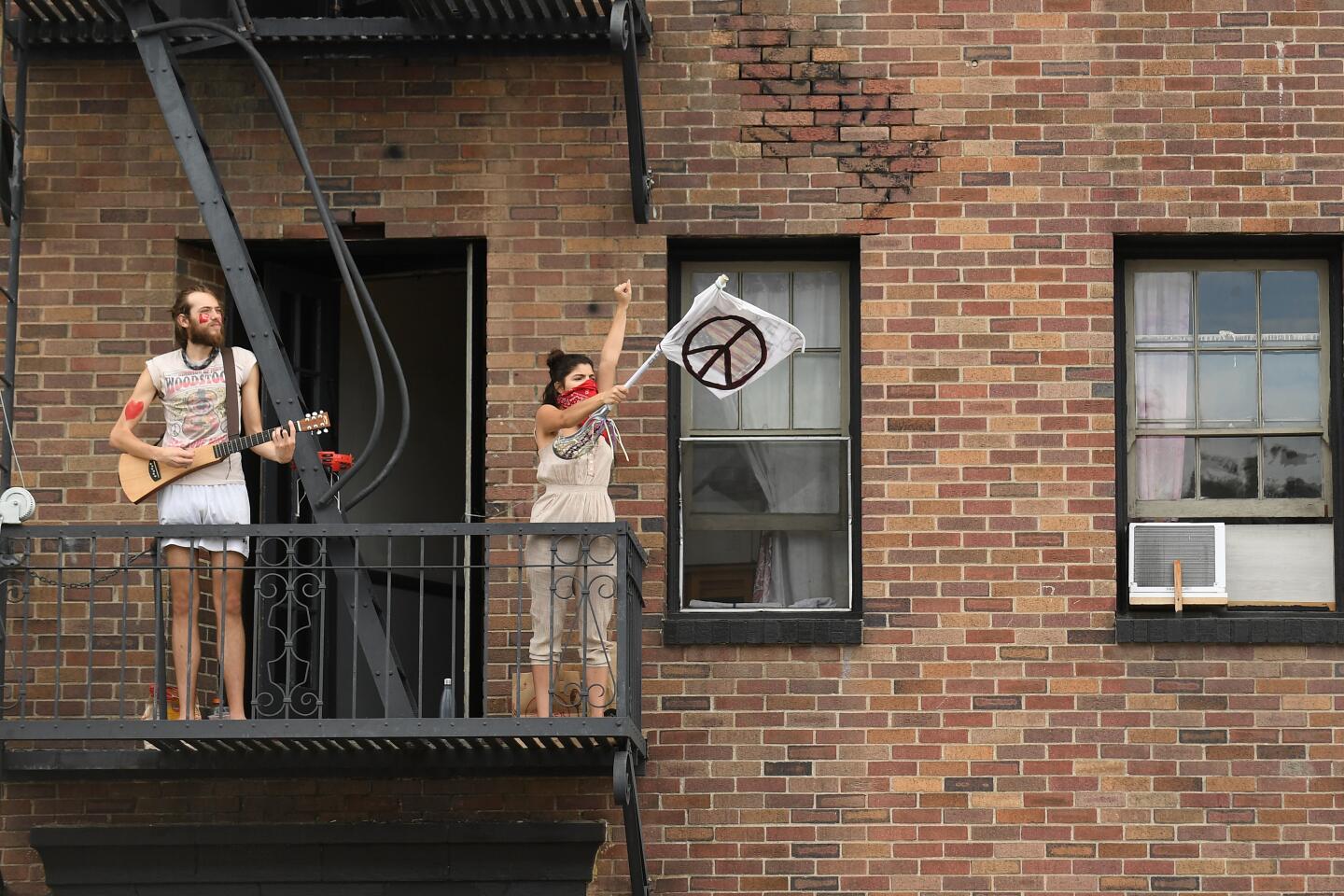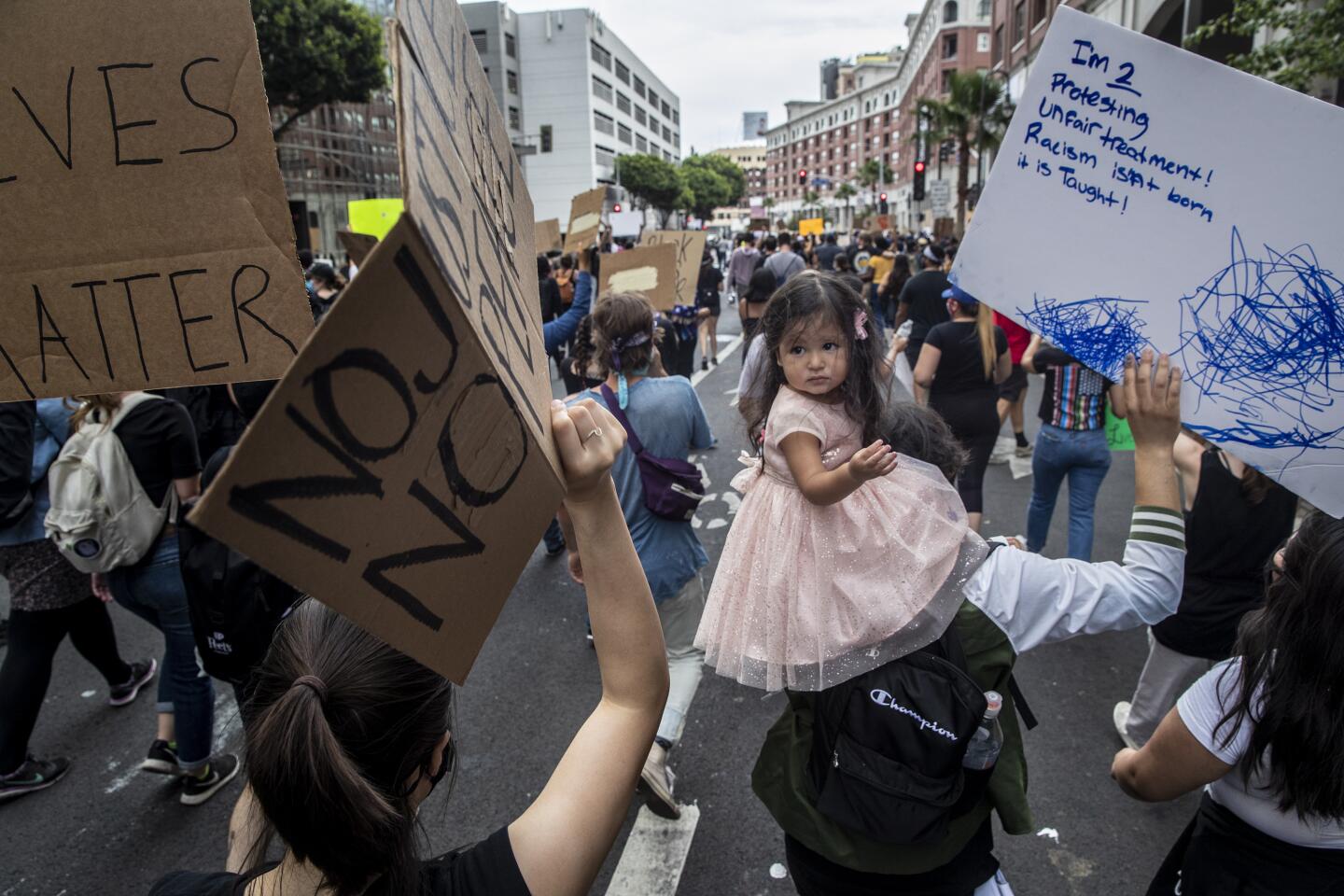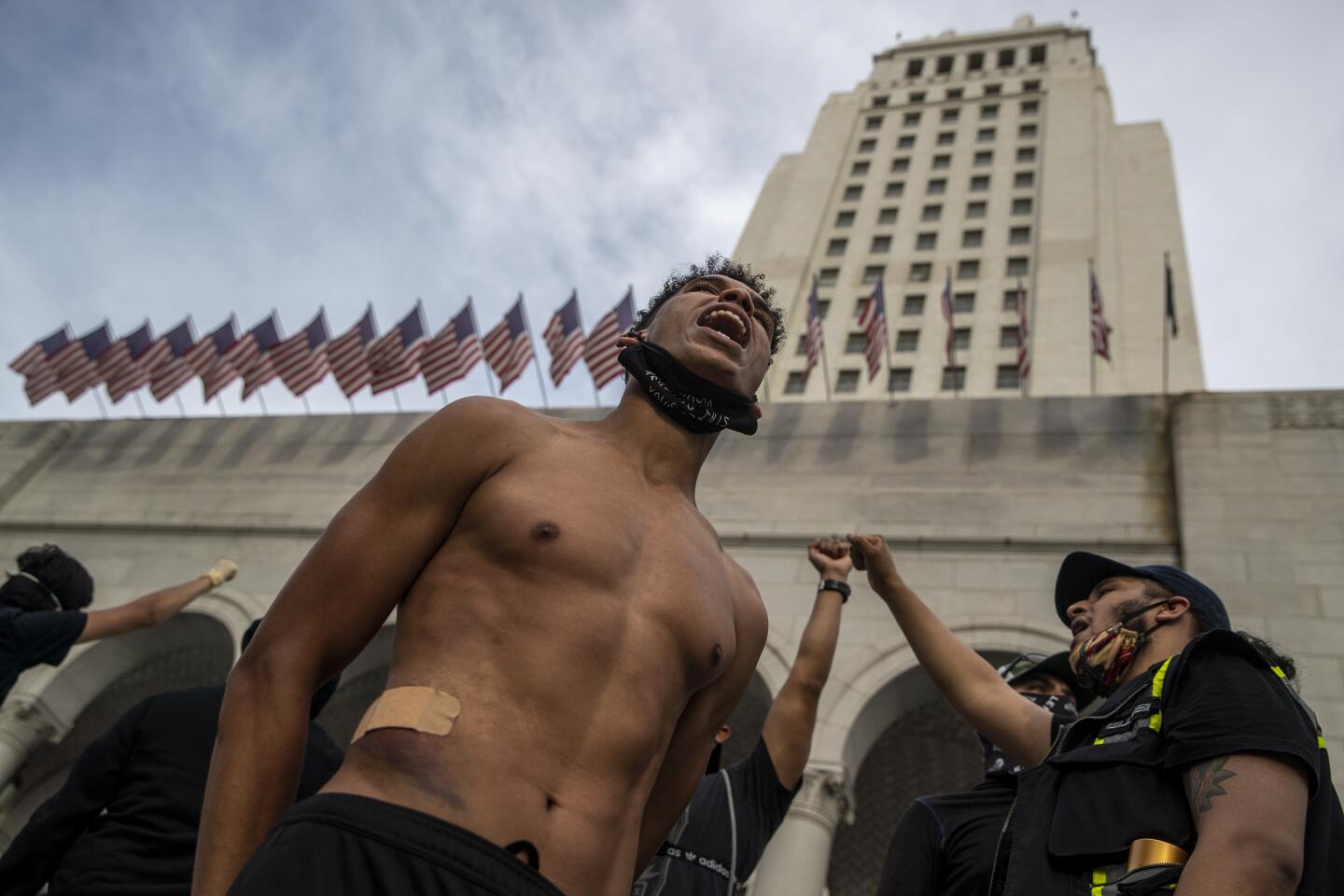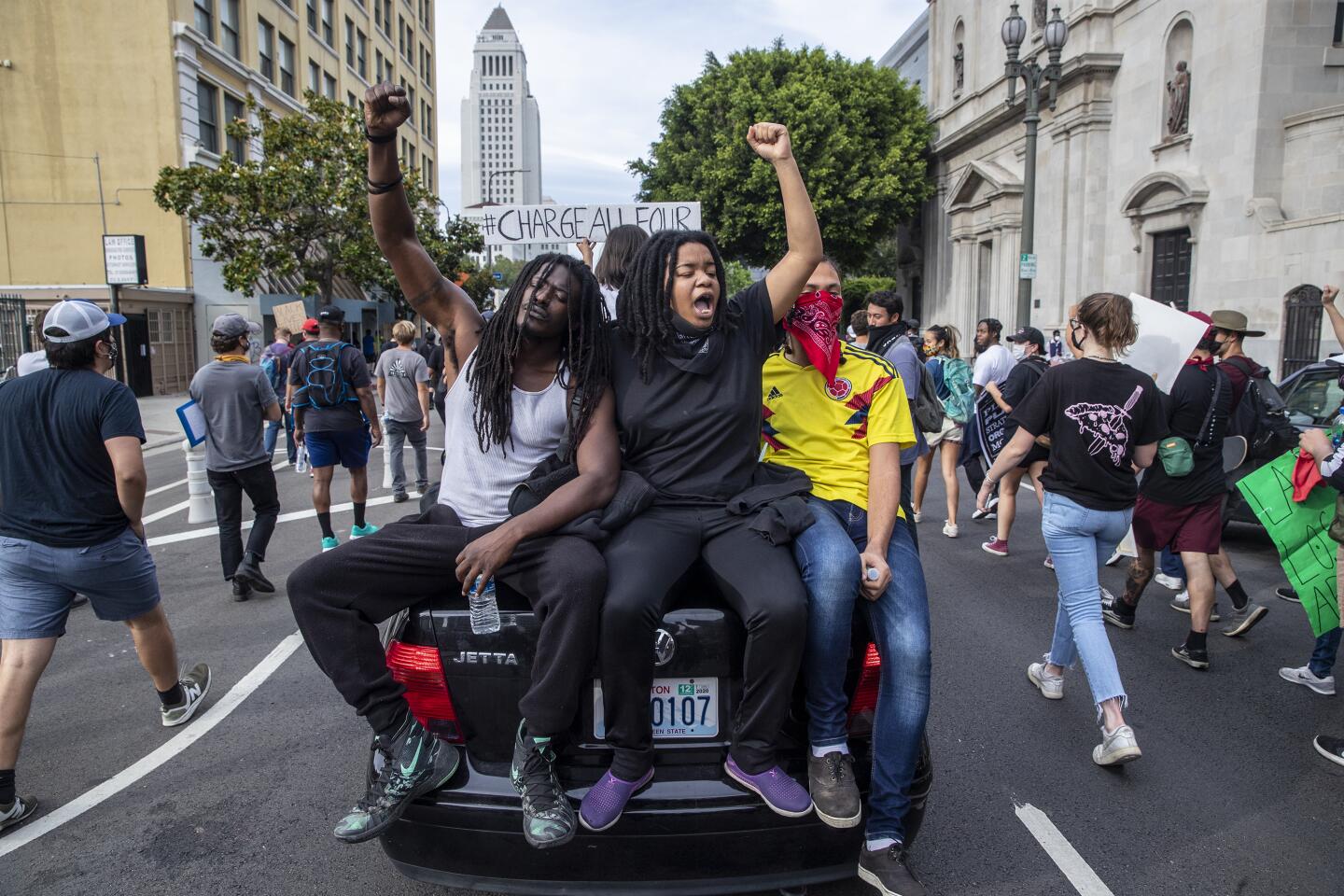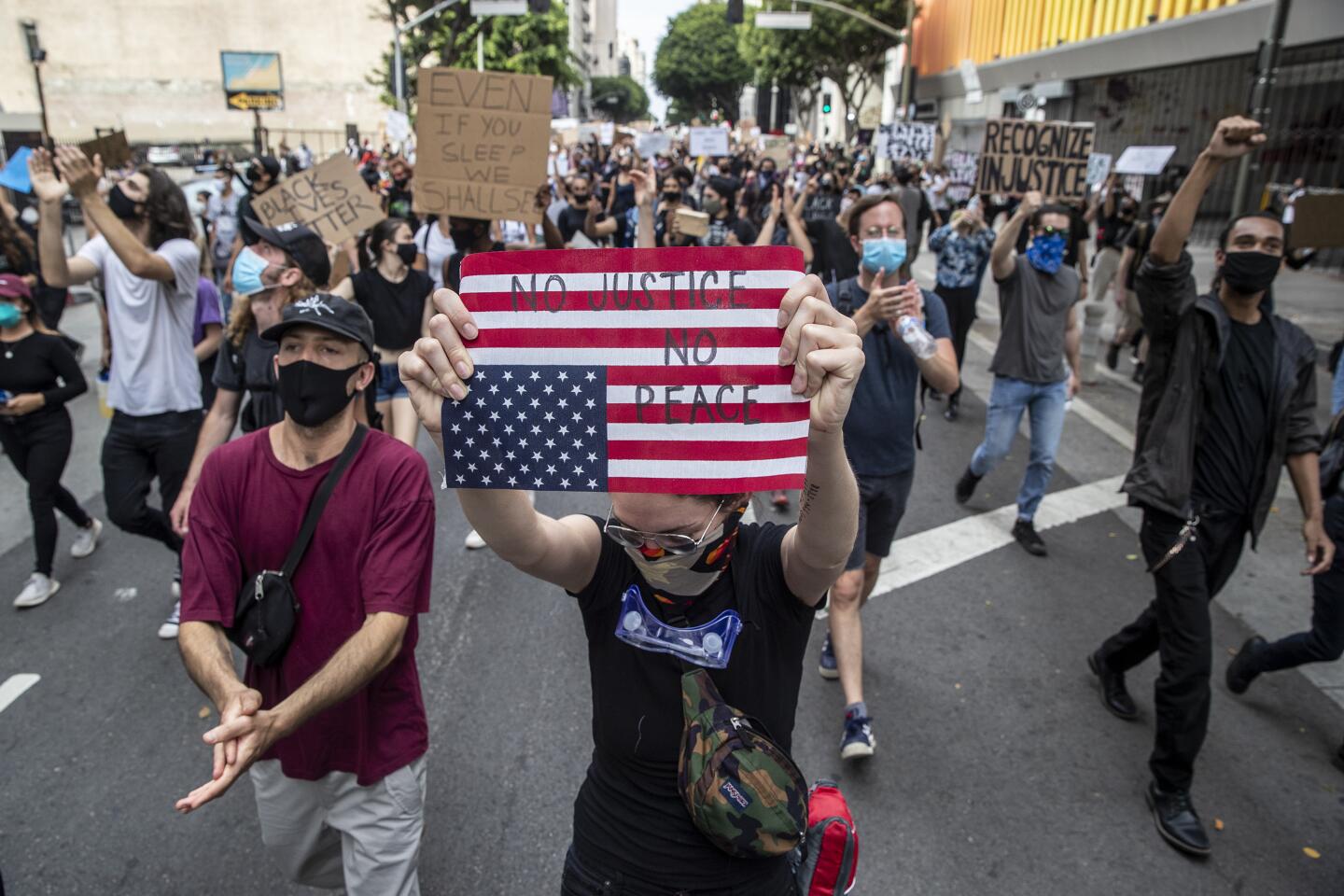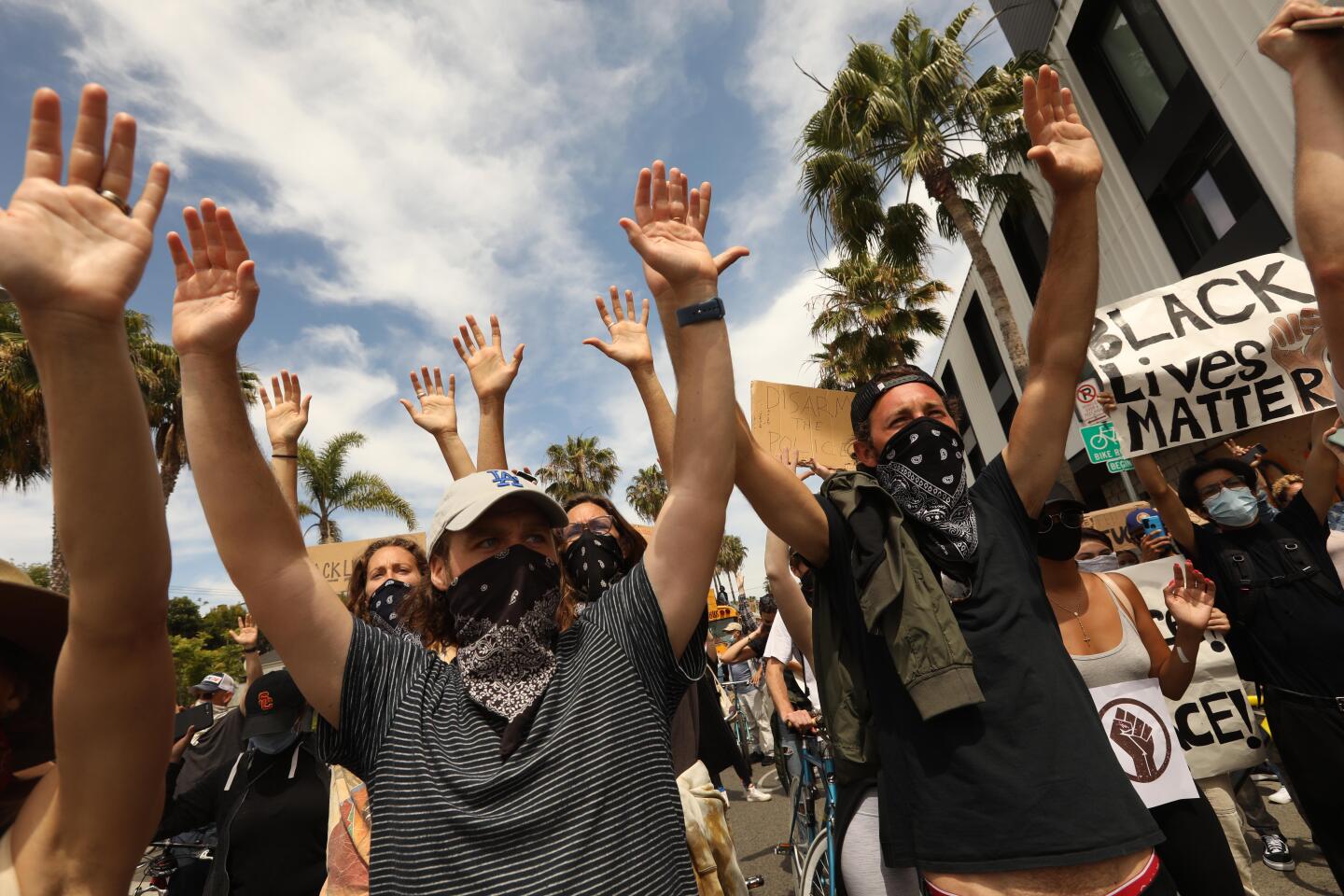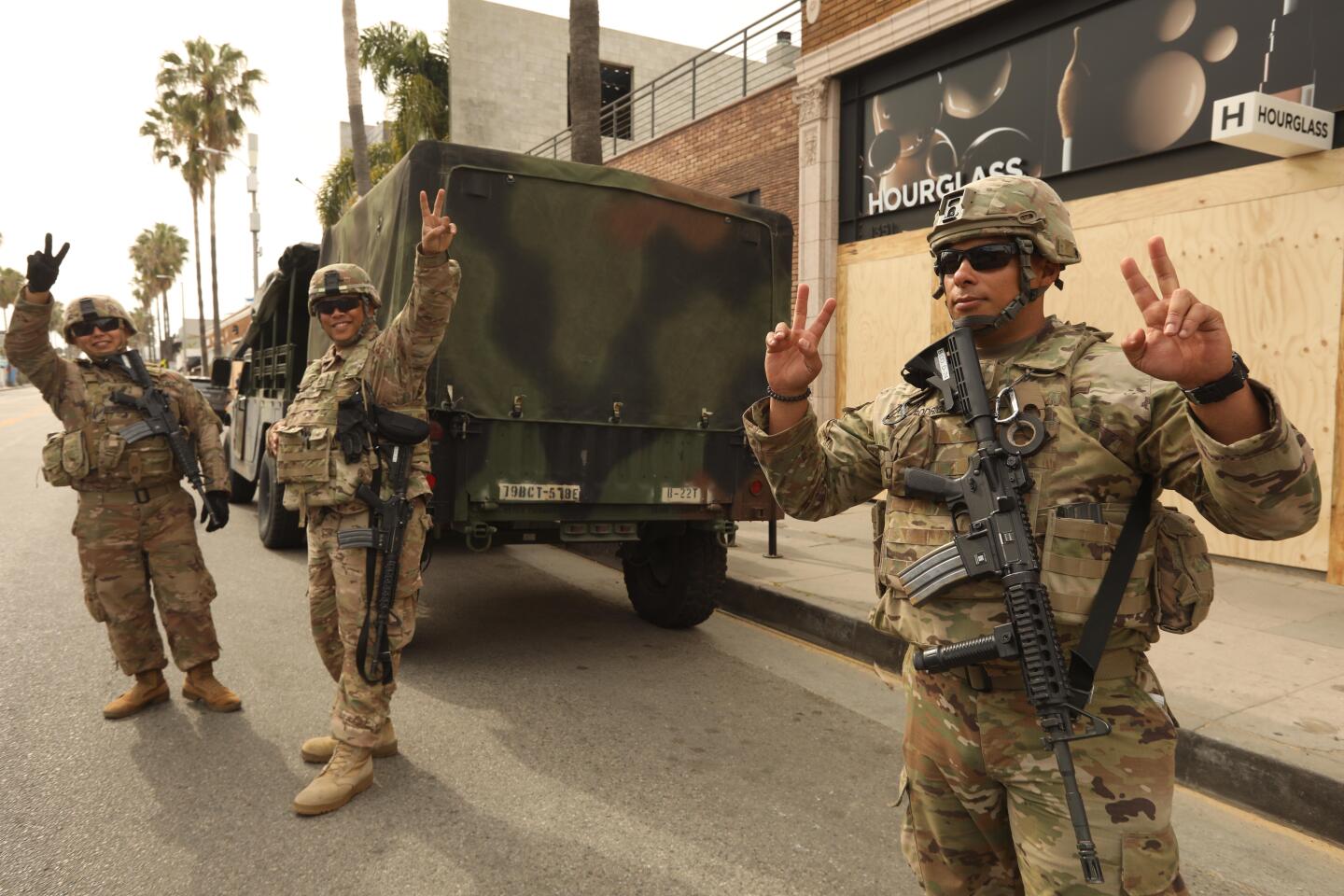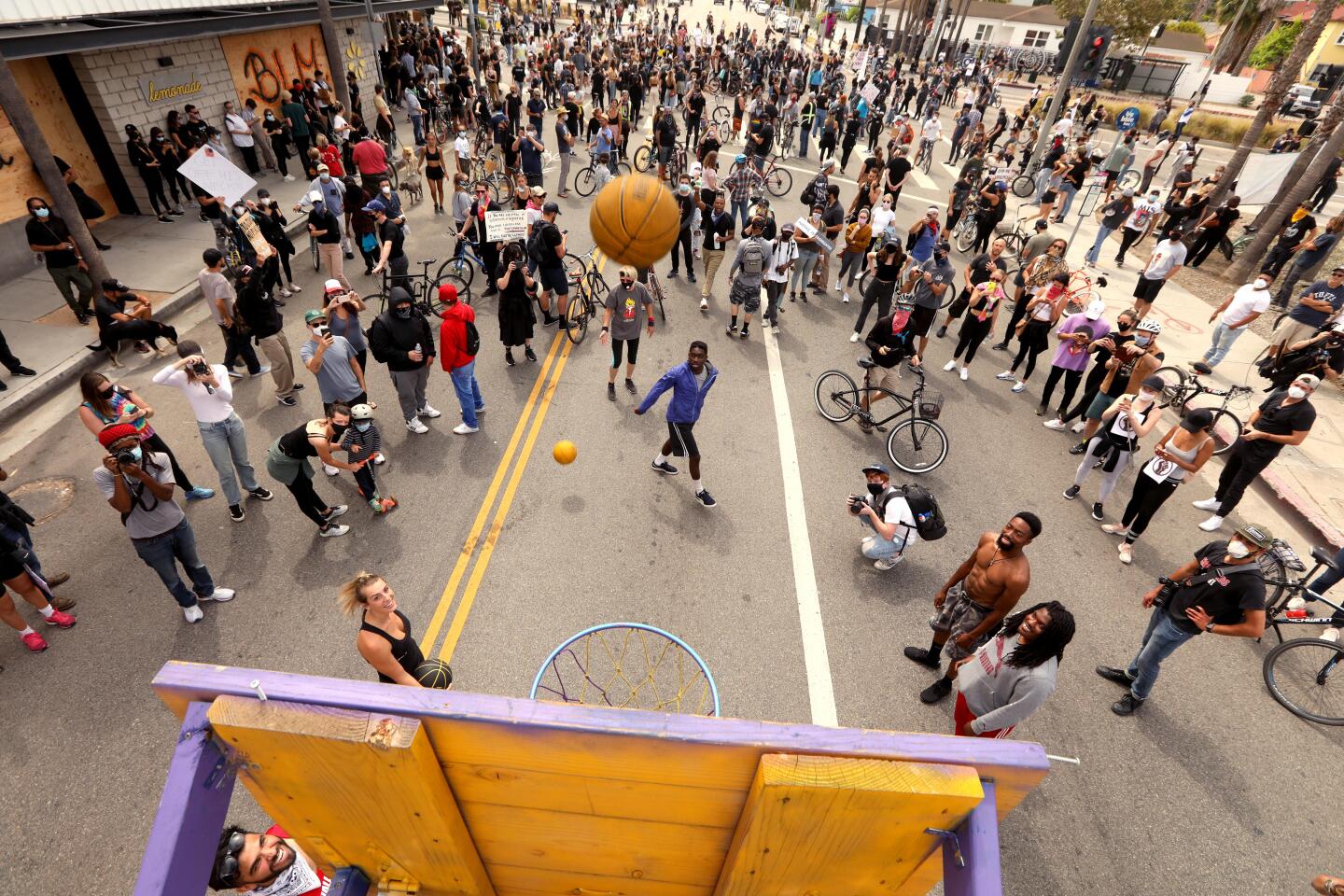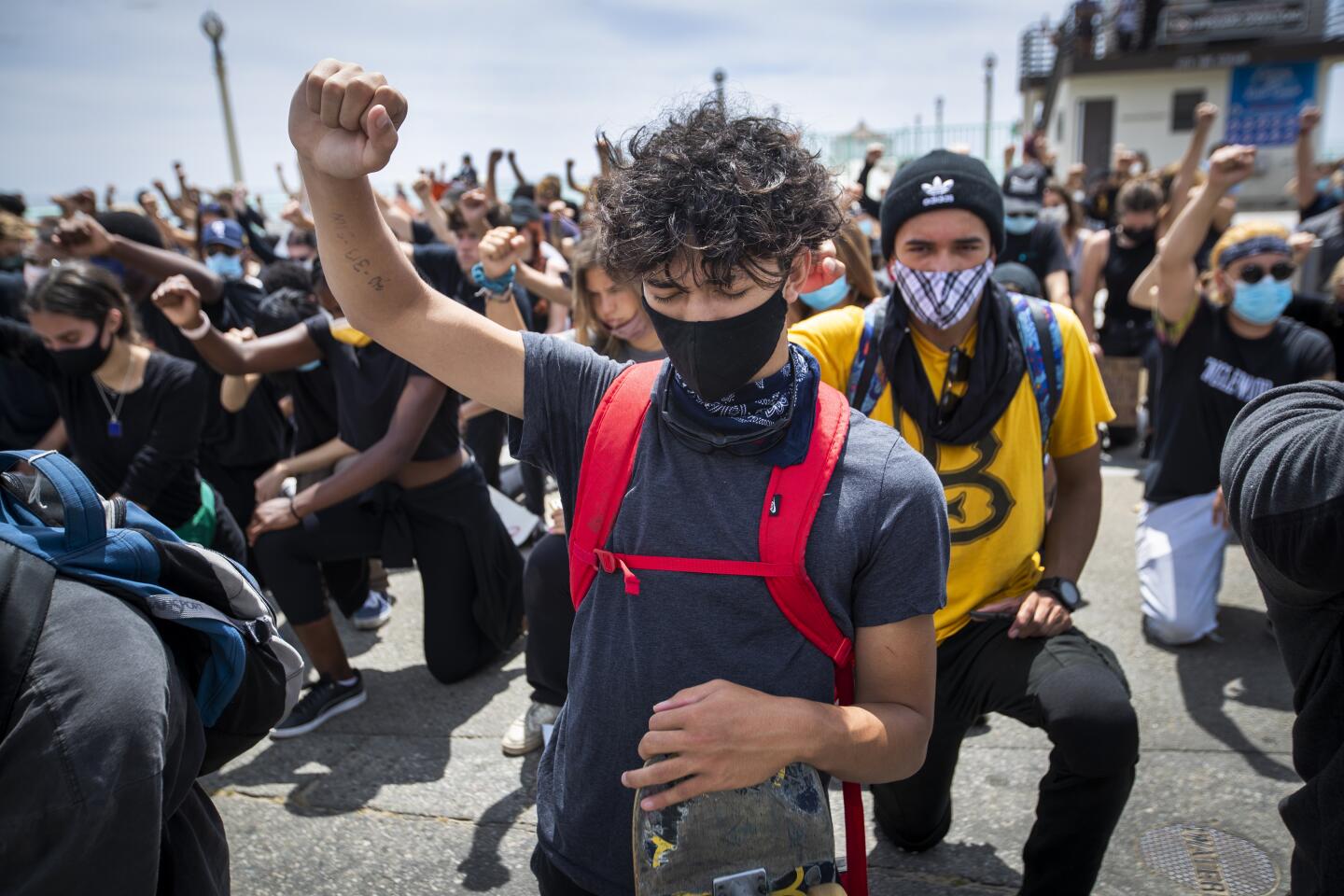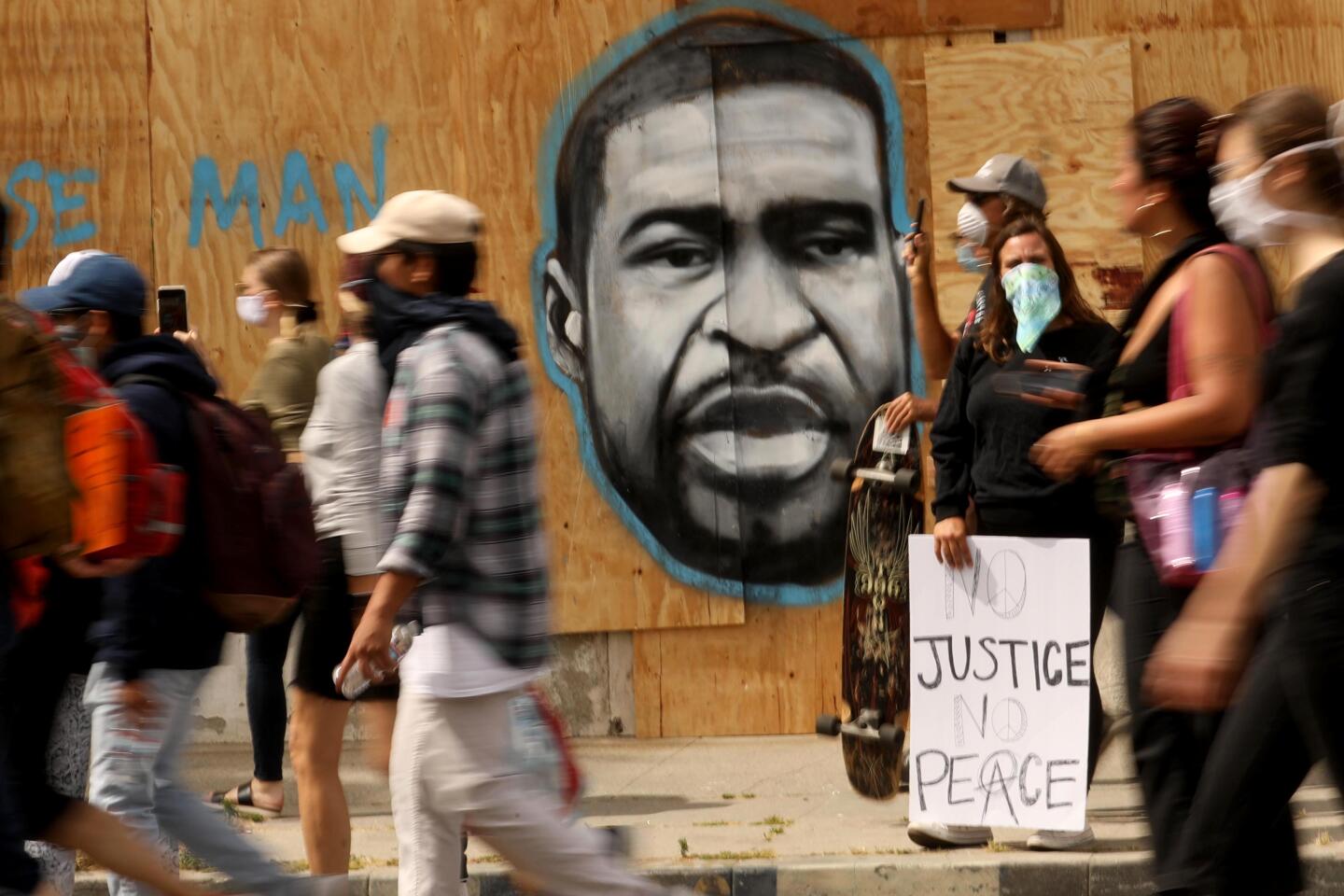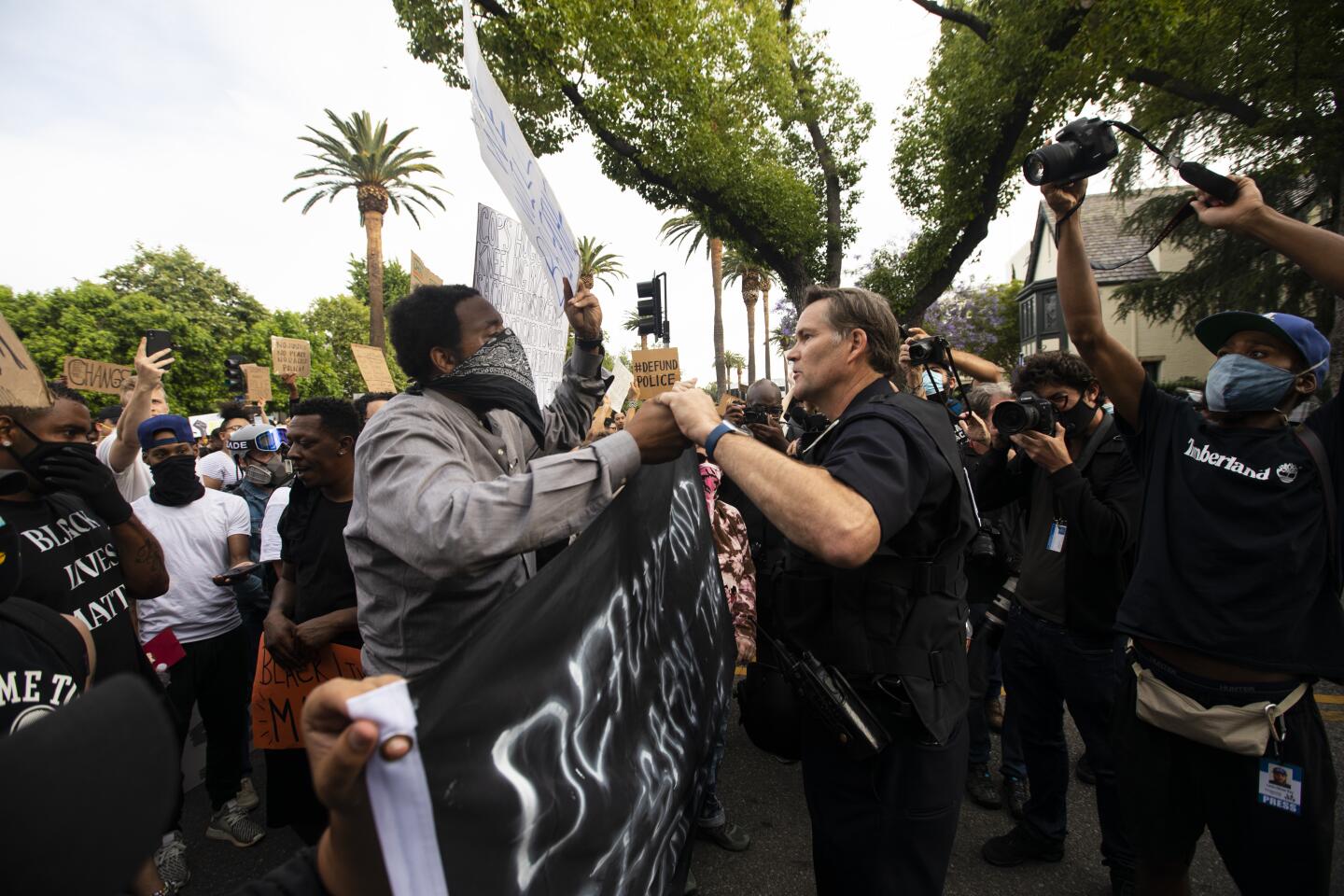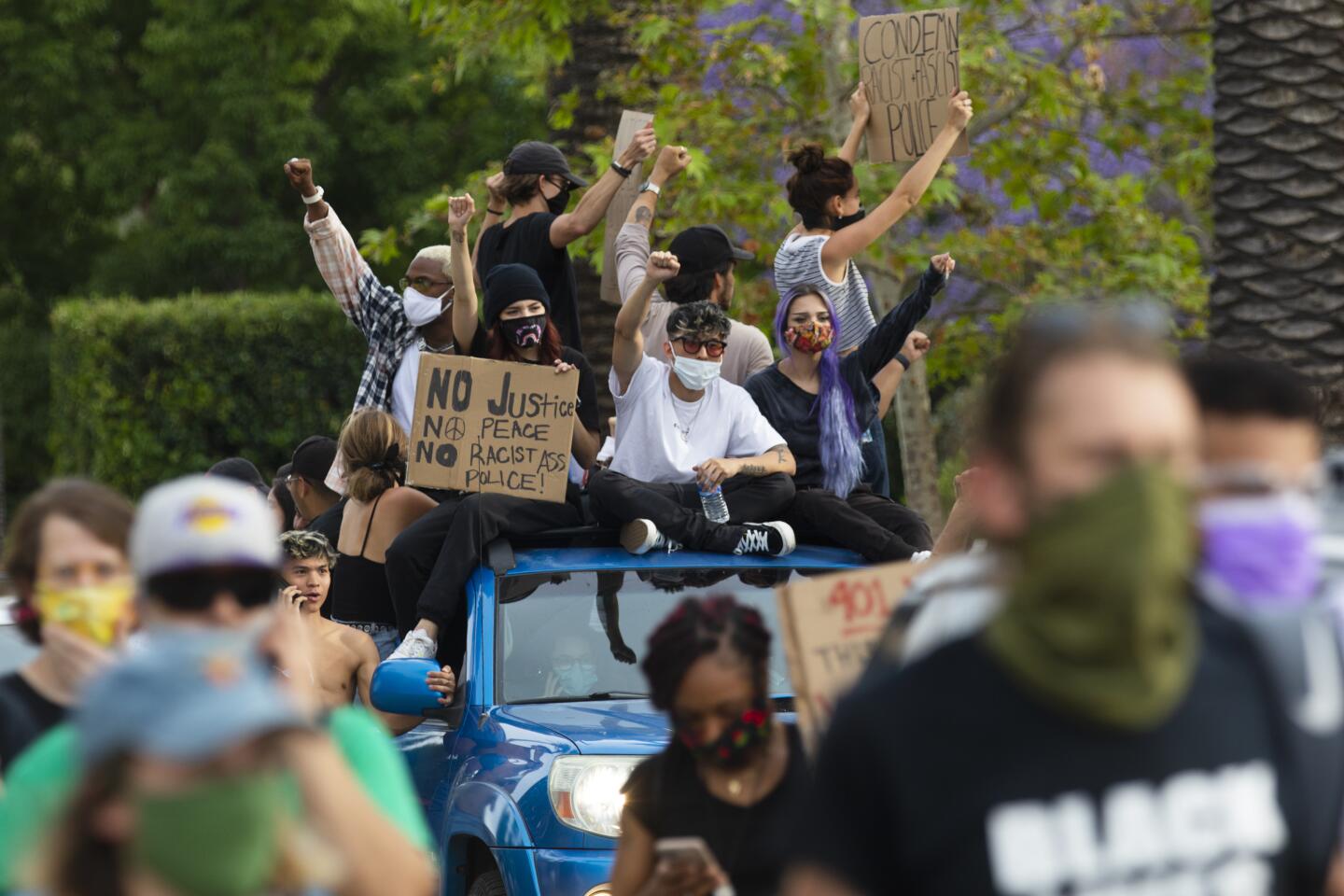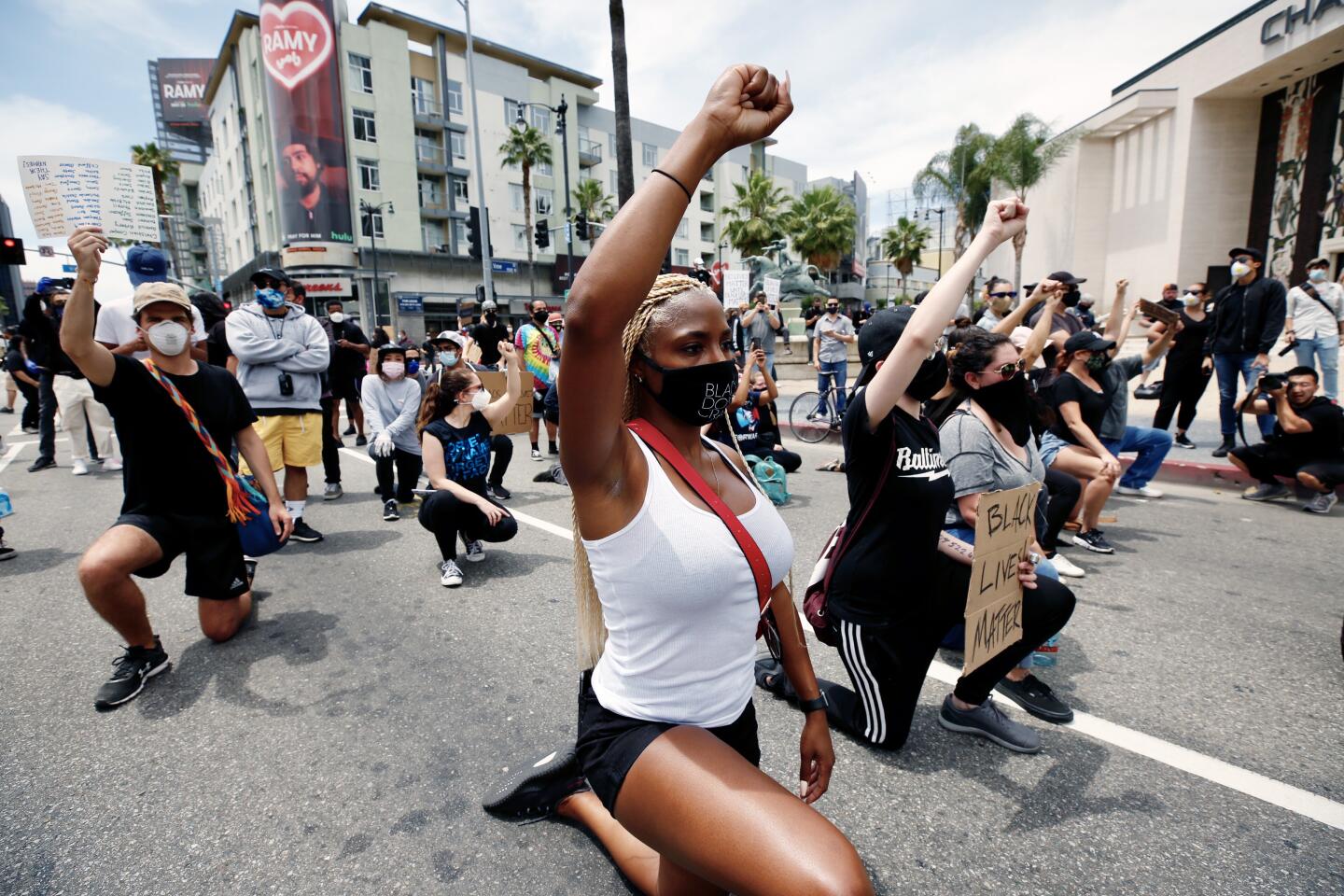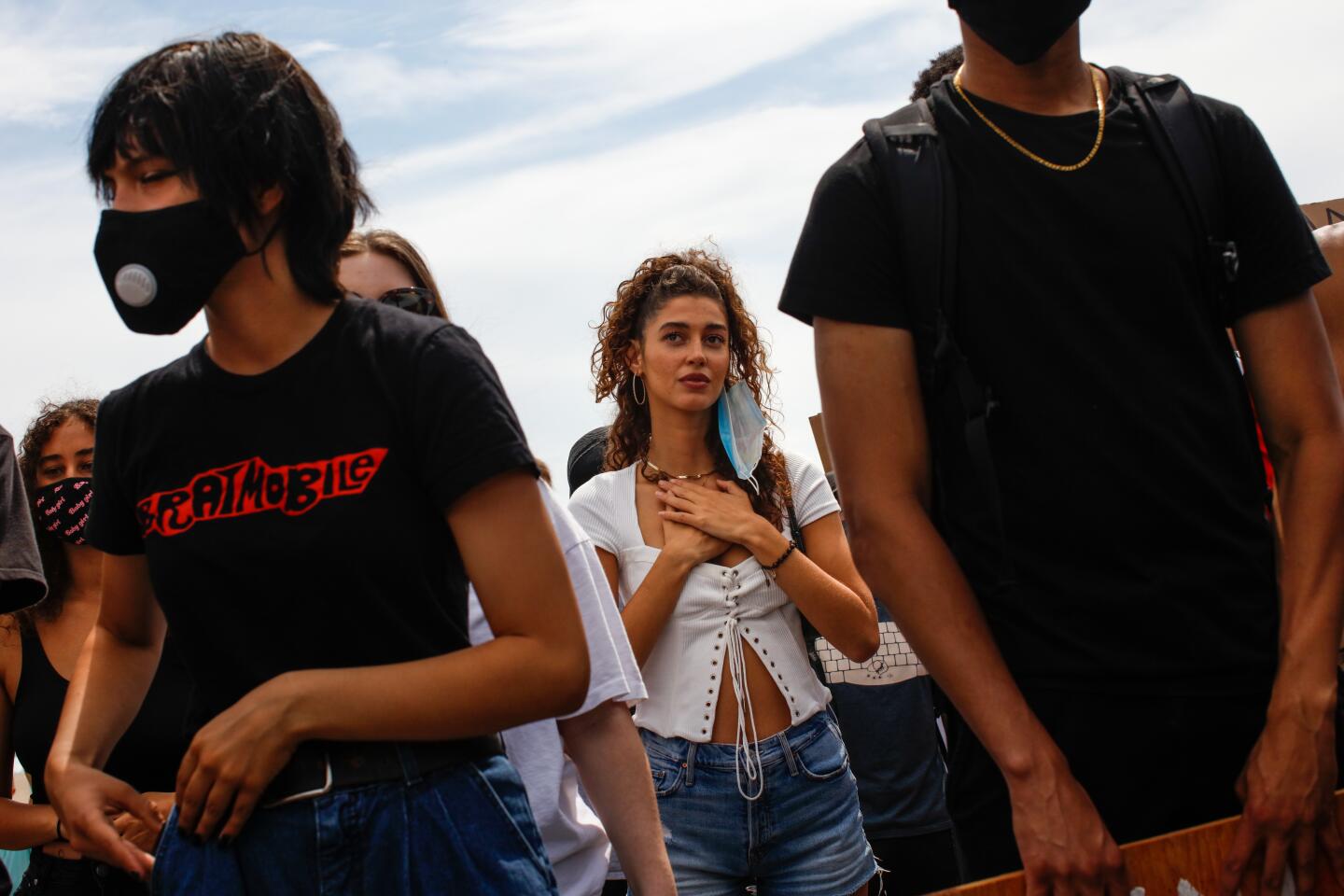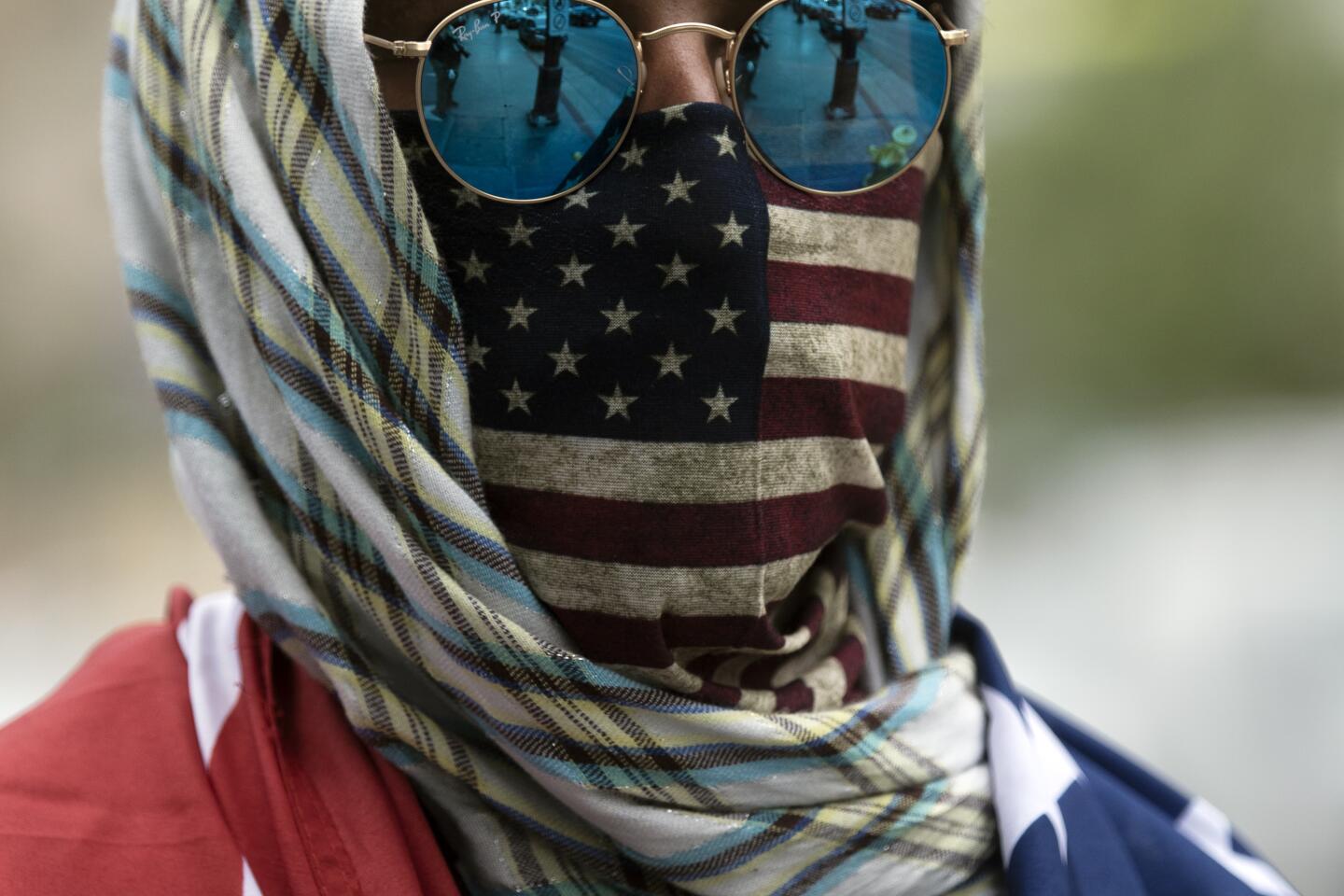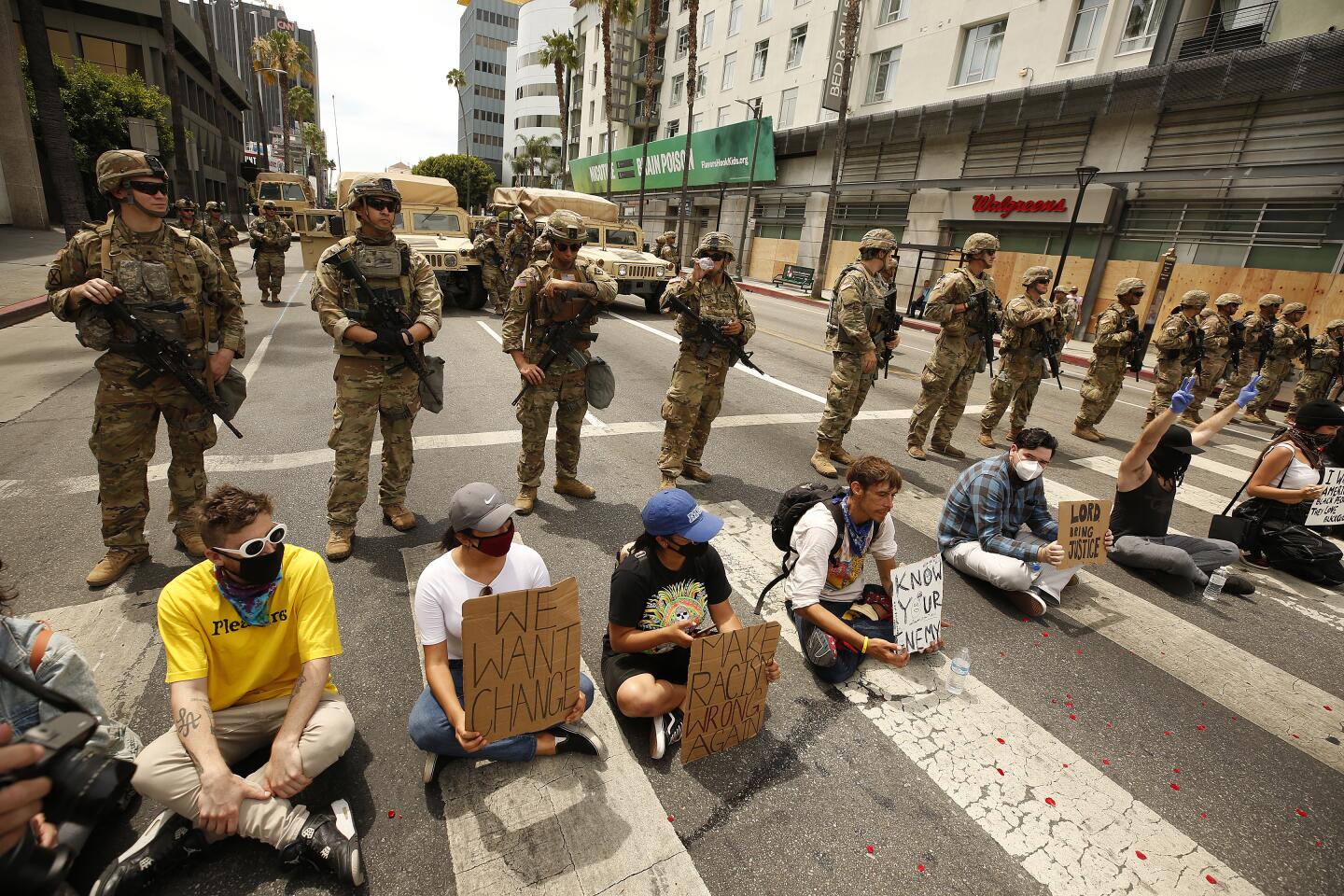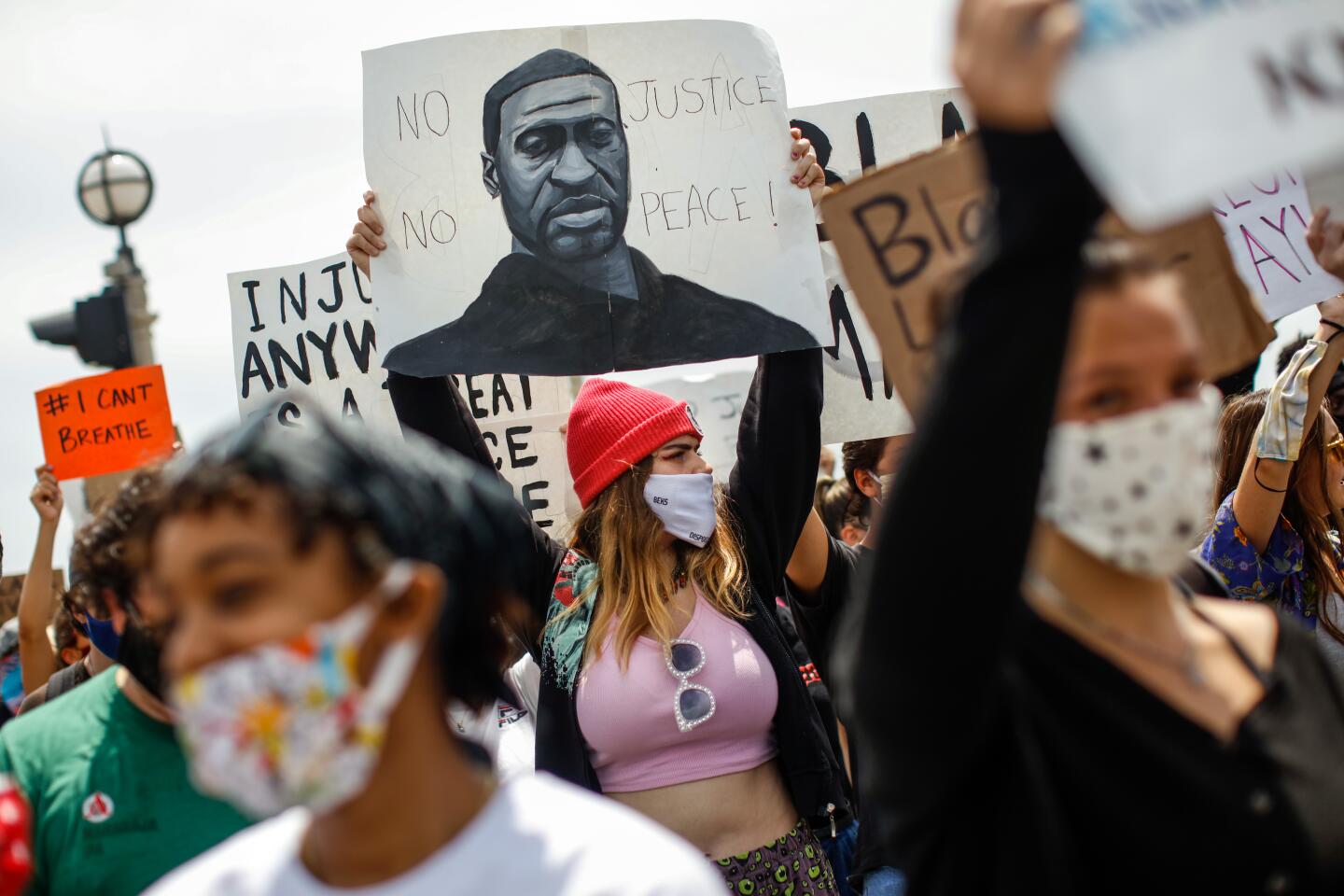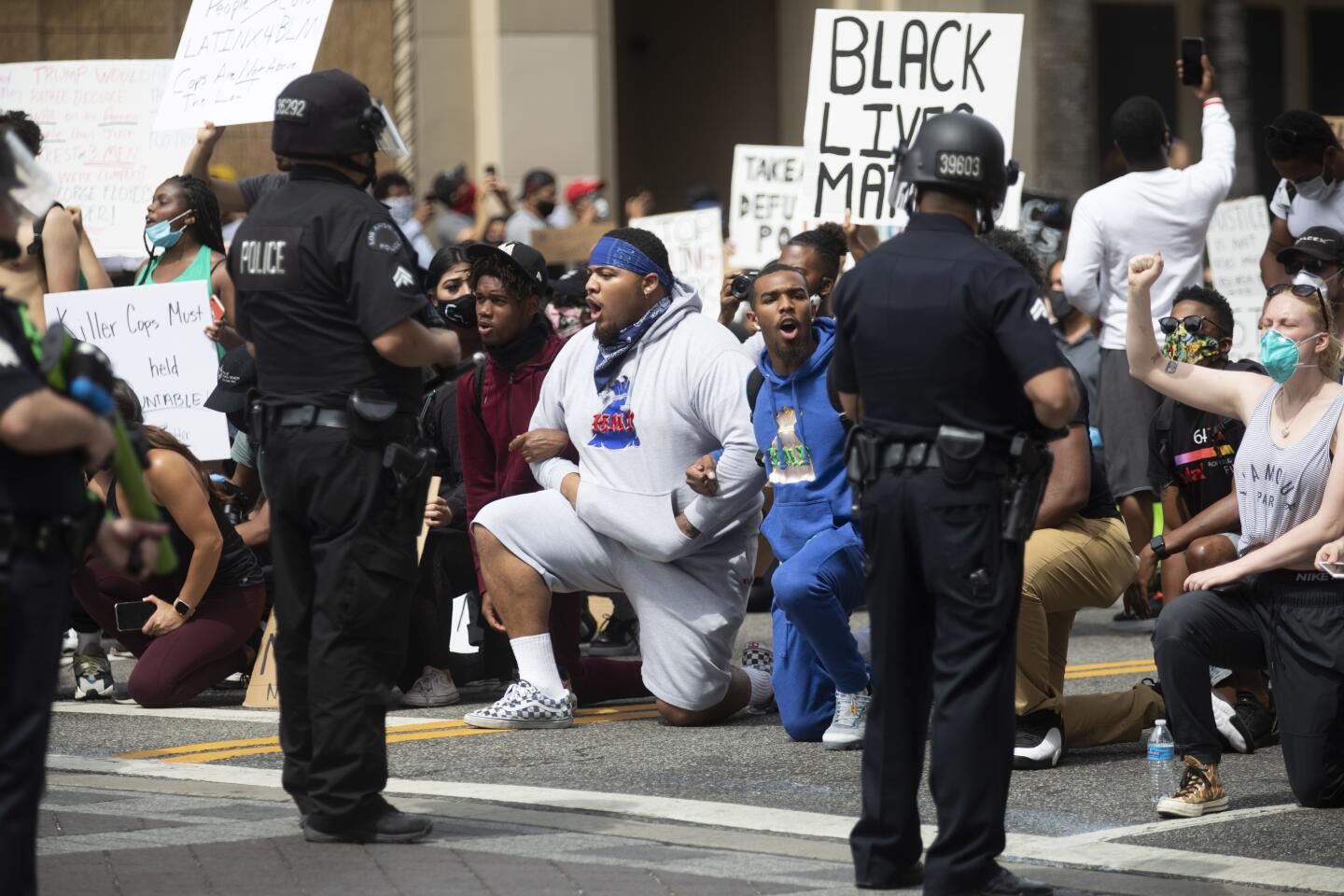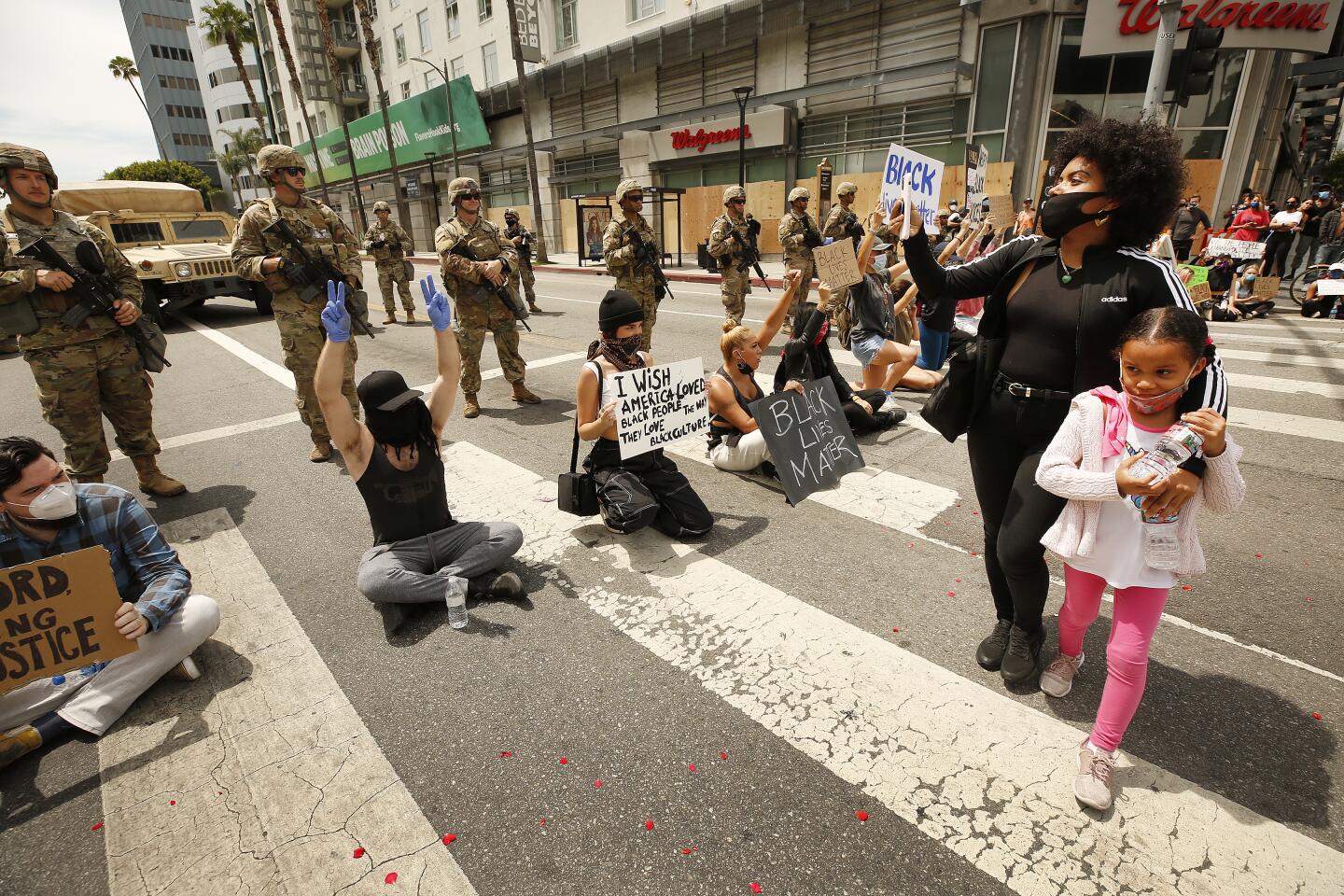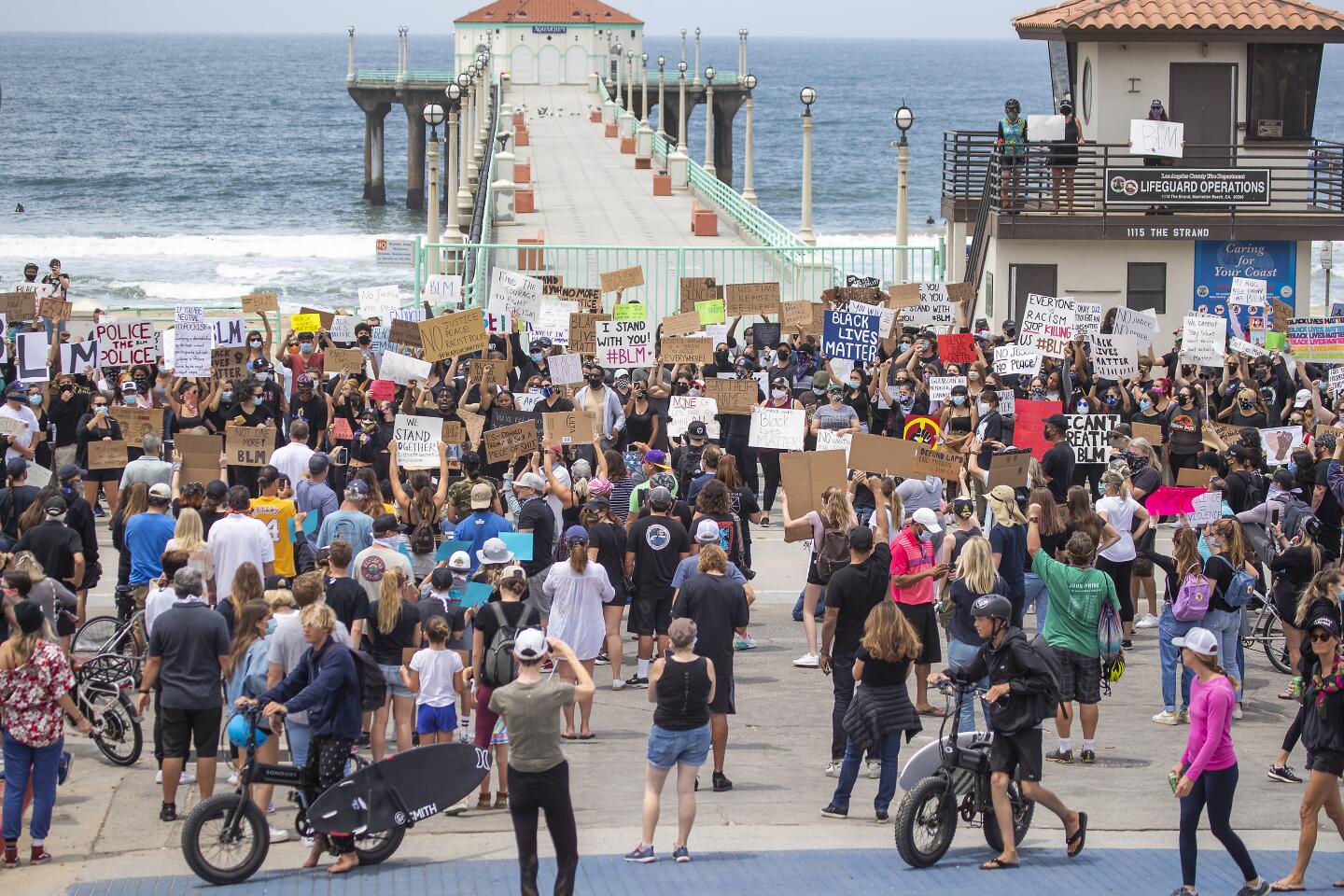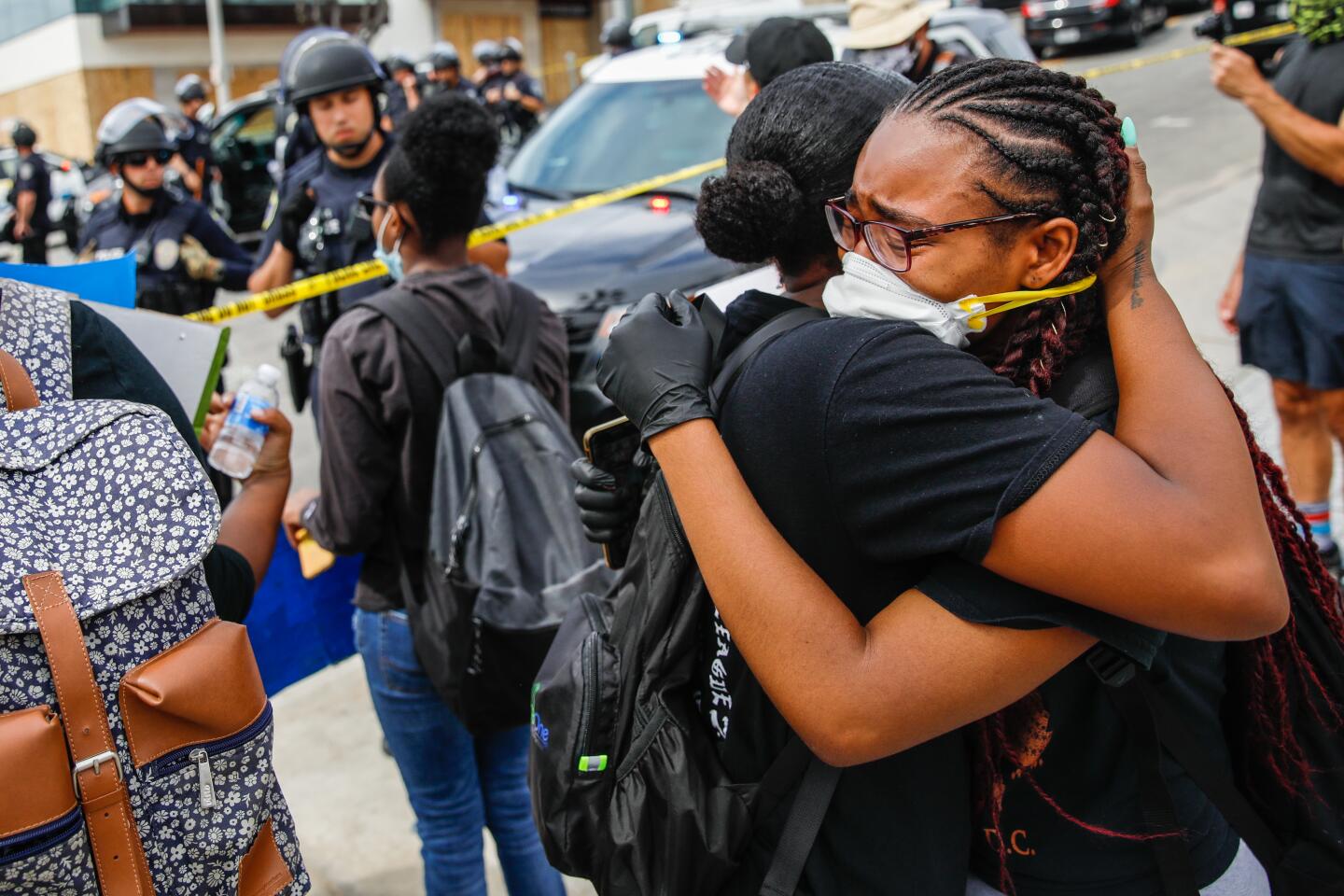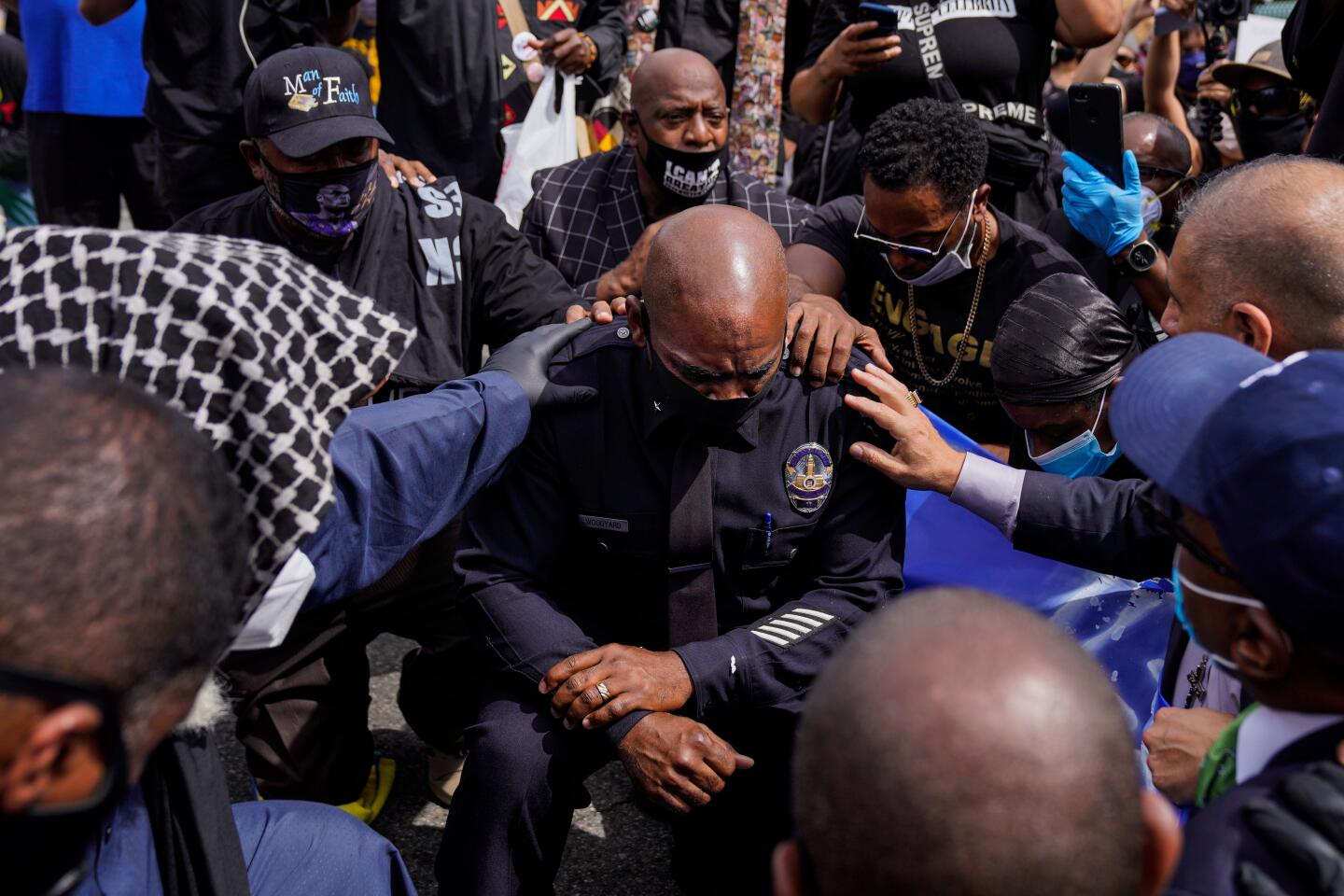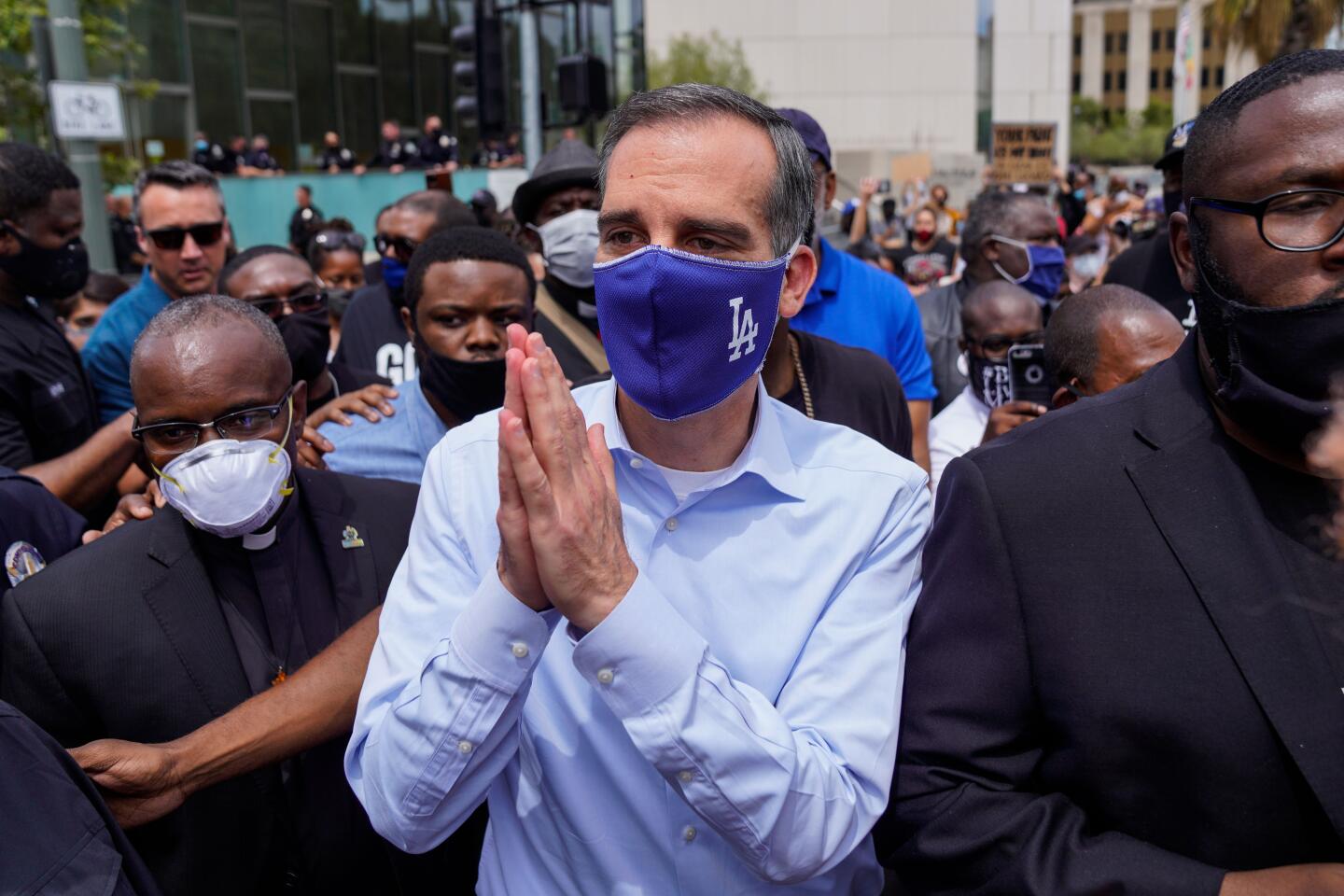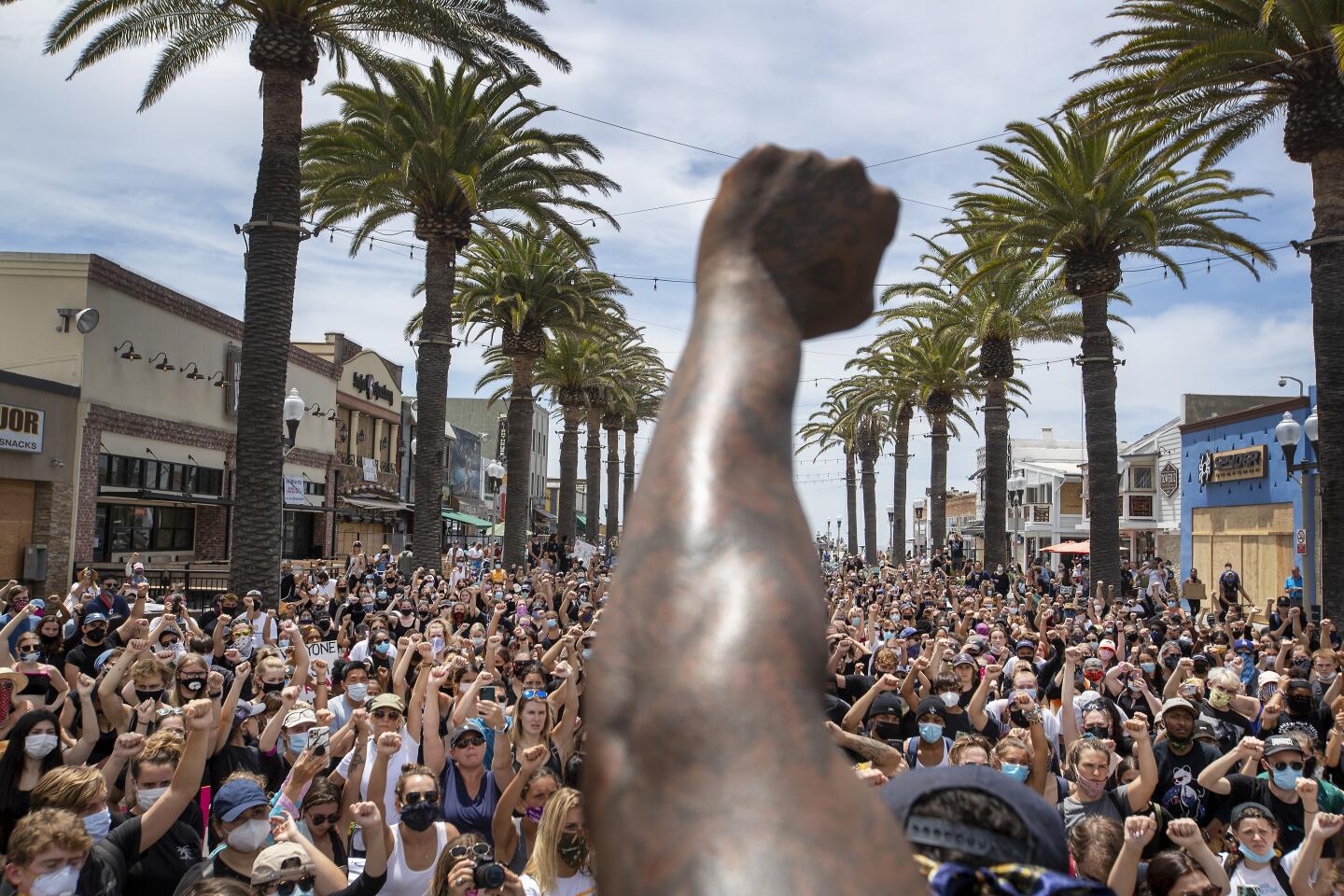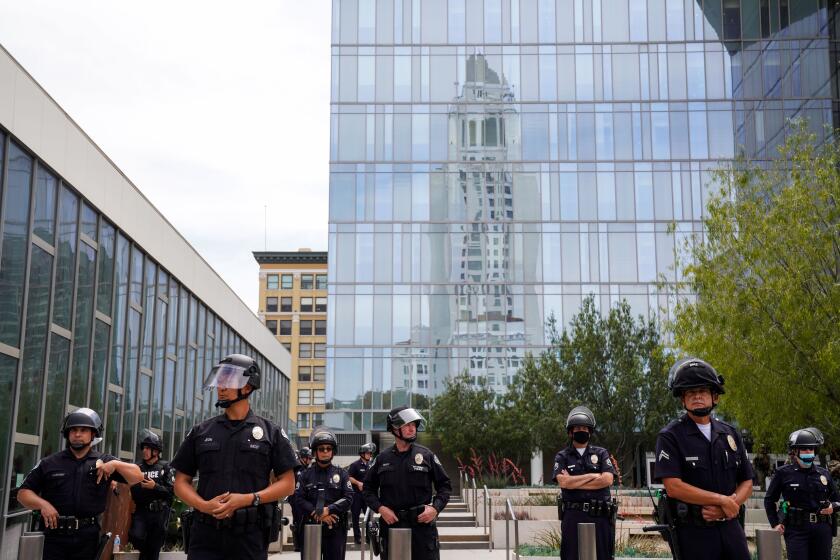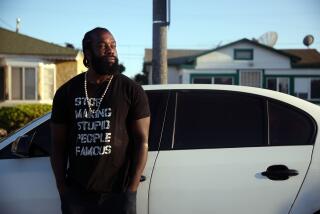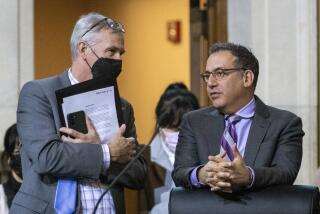It has been an article of faith in Los Angeles politics for more than a quarter-century: Build the Police Department and its budget, and you will build a stronger, safer city.
Mayors from moderate Republican Richard Riordan to liberal Democrat Antonio Villaraigosa charted that course, with special emphasis on expanding the LAPD to at least 10,000 sworn officers.
For the record:
10:12 a.m. June 5, 2020An earlier version of this article said officers of Los Angeles Police Protective League said in a statement they had a phone conference with Garcetti and council members Monica Rodriguez and Curren Price. The conference was with Garcetti, Council President Nury Martinez and Price.
But city leaders now appear ready to slow and perhaps reverse that longtime trend, following the killing of George Floyd in Minneapolis police custody and a wave of rage, sorrow and demands in Los Angeles that the government provide poor and minority communities with more than a police presence.
Mayor Eric Garcetti said he will direct $250 million to youth jobs, health initiatives and “peace centers” to heal trauma, and will allow those who have suffered discrimination to collect damages. The money will have to be cut from other city operations; Garcetti, backed by City Council President Nury Martinez and his new Police Commission president, said as much as $150 million would come from the Los Angeles Police Department.
1/82
A protester dances on top of Donald Trump’s star on the Hollywood Walk of Fame during a demonstration by members of Refuse Fascism who are calling an end to the Trump administration on June 20, 2020. (Gina Ferazzi / Los Angeles Times)
2/82
Deborah Jay Winams cries after singing a song at a Black Lives Matter Los Angeles rally to call for justice in the fatal shooting of Kenneth Ross Jr. by Gardena police in 2018. (Wally Skalij/Los Angeles Times)
3/82
People participate in the All Black Lives Matter march in West Hollywood on Sunday, June 14. Thousands of demonstrators marched for racial justice and LGBTQ rights. (Dania Maxwell / Los Angeles Times)
4/82
A protester waves a rainbow flag on Sunset Boulevard during the All Black Lives Matter march on Sunday. (Dania Maxwell / Los Angeles Times)
5/82
Thousands hold up signs and march in the All Black Lives Matter solidarity protest on Hollywood Boulevard. The procession started at Hollywood and Highland and moved into West Hollywood. (Genaro Molina / Los Angeles Times)
6/82
Jason De Puy of West Hollywood wears a mask that reads “Black Trans Lives Matter” as people fill Hollywood Boulevard during a solidarity march called All Black Lives Matter on Sunday, June 14. (Christina House / Los Angeles Times)
7/82
Protesters hold up signs at the All Black Lives Matter march, which was organized by Black LGBTQ leaders and organizations in place of a previously planned event by the group behind LA Pride. (Genaro Molina / Los Angeles Times)
8/82
Protesters march, raising fists and signs in the air, on La Brea Avenue in Hollywood on Sunday. (Genaro Molina / Los Angeles Times)
9/82
The Compton Cowboys ride horseback down South Tamarind Avenue, joining thousand of protesters Sunday during the Compton peace ride, which ended at City Hall. (Jay L. Clendenin/Los Angeles Times)
10/82
Houston Rockets star Russell Westbrook speaks to the crowd of protesters and the Compton Cowboys at the end of a peace walk at Compton City Hall on Sunday. (Jay L. Clendenin / Los Angeles Times)
11/82
Elijah Estrada, 6, holds up his fist for 8:46, the length of time George Floyd was held down by Minneapolis Police Officer Derek Chauvin, at the conclusion of a peace ride and walk with the Compton Cowboys at Compton City Hall on Sunday. (Jay L. Clendenin/Los Angeles Times)
12/82
A family member of Breonna Taylor, right, is hugged by another woman after speaking to protesters in Beverly Hills Saturday. (Wally Skalij/Los Angeles Times)
13/82
A woman tries to get between Black Lives Matter protesters and pro-Trump counter protesters during a demonstration at the intersection of Main Street and Pacific Coast Highway in Huntington Beach on Saturday. (Luis Sinco/Los Angeles Times)
14/82
Los Angeles Police Deputy Chief Regina Scott takes knee next to Johnathan Jasper, brother of slain teen Anthony Weber, during a rally in front of LA City Councilman Marqueece Harris-Dawson’s office Saturday. (Gina Ferazzi/Los Angeles Times)
15/82
A protester yells in front of a Black Lives Matter mural with the names of victims on Fairfax Ave. during a march Saturday. (Wally Skalij/Los Angeles Times)
16/82
David Blackgold hugs Huntington Beach police officer K. Wood during a Black Lives Matter protest in Huntington Beach Saturday. (Luis Sinco/Los Angeles Times)
17/82
A National Guardsman holds a rose given to him by a protester along Fairfax Ave. during a march Saturday. (Wally Skalij/Los Angeles Times)
18/82
A Black Lives Matter protester blows bubbles by a police line in Huntington Beach on Saturday. (Luis Sinco/Los Angeles Times)
19/82
A protester lies on the ground under his horse with his hands behind his back as demonstrators including some on horseback rally in front of LA City Councilman Marqueece Harris-Dawson’s office in Los Angeles Saturday. (Gina Ferazzi/Los Angeles Times)
20/82
Tempers flare between Black Lives Matter demonstratiors and pro-Trump counterprotesters in Huntington Beach on Saturday. (Luis Sinco/Los Angeles Times)
21/82
Black Lives Matter demonstrators raise clenched fist in Huntington Beach on Saturday. (Luis Sinco/Los Angeles Times)
22/82
Mek Bitul held up a sign with the words, “This Is The Tipping Point!!!” in front of City Hall, joining nearly 1,000 people gathered to protest the death of George Floyd and in support of Black Lives Matter, in downtown Los Angeles. (Jay L. Clendenin/Los Angeles Times)
23/82
Katyana DeCampos, a citizen of France visiting California, marched with a sign with the words “Anti Racism,” joining nearly 1,000 people gathered to protest the death of George Floyd and in support of Black Lives Matter, in downtown Los Angeles. (Jay L. Clendenin/Los Angeles Times)
24/82
Zoe Perkins, 4, of Glendale and her mother brought flowers to the Hall of Justice in downtown Los Angeles to protest the death of George Floyd. (Jay L. Clendenin / Los Angeles Times)
25/82
LAPD Chief Michel Moore, left, talks with community leaders outside police headquarters after a candlelight vigil for George Floyd on Friday. (Wally Skalij / Los Angeles Times)
26/82
A man lays a rose at the Hall of Justice in downtown Los Angeles. (Jay L. Clendenin / Los Angeles Times)
27/82
Braydon Deauce White, 4, fist-bumps a National Guardsman at LAPD headquarters Thursday morning. (Al Seib / Los Angeles Times)
28/82
Allison Bracy of Fontana hugs daughter Brielle Bracy, 10, while attending a rally in Riverside on Thursday. (Gina Ferazzi / Los Angeles Times)
29/82
A protester drapes himself with a flag during a demonstration in downtown Los Angeles on Thursday. (Luis Sinco / Los Angeles Times)
30/82
Gustavo R. Ramirez of Pomona kneels in front of the Rev. Martin Luther King Jr. statue in Riverside. (Gina Ferazzi / Los Angeles Times)
31/82
Protesters at Moonlight State Beach in Encinitas. (Gabriella Angotti-Jones / Los Angeles Times)
32/82
Crowds gather in downtown L.A. to protest the police killing of George Floyd in Minneapolis. At 9 p.m., for exactly 8 minutes and 46 seconds, protesters shone lights into the sky. (Gary Coronado / Los Angeles Times)
33/82
Protesters dance on Spring Street in downtown Los Angeles as a march attracted thousands of people. (Luis Sinco / Los Angeles Times)
34/82
Thousands of protesters gather at the Los Angeles Civic Center. (Luis Sinco / Los Angeles Times)
35/82
Thousands of protesters gather at the Los Angeles Civic Center. (Luis Sinco / Los Angeles Times)
36/82
Thousands of protesters gather at the Los Angeles Civic Center. (Luis Sinco/Los Angeles Times)
37/82
Stephen Chang, 32, left, of Silver Lake, with an American flag draped over his head, joins other demonstrators at the intersection of Spring and Temple streets in downtown Los Angeles, as they protest against L.A. Dist. Atty. Jackie Lacey and also demand justice in the death of George Floyd. (Mel Melcon/Los Angeles Times)
38/82
Miles Miles, 8, left, and Memphis Miley, 6, center, of Newport Beach, join protest against racism in Newport Beach. (Allen J. Schaben/Los Angeles Times)
39/82
Protester Vailing high-fives National Guardsmen as they march through Hollywood to demand justice for the killing of George Floyd in Hollywood. (Brian van der Brug/Los Angeles Times)
40/82
Protesters march through a residential neighborhood in Hollywood. (Brian van der Brug/Los Angeles Times)
41/82
Protesters walk through a residential neighborhood in Hollywood. (Brian van der Brug/Los Angeles Times)
42/82
A L.A. Sheriff’s deputy watches as protester Annik Chung holds a sign while cheering on marchers along La Brea Ave. in Hollywood. (Brian van der Brug/Los Angeles Times)
43/82
Mustafa-Ali, 27, from Lancaster, Pennsylvania, joins other demonstrators as they protest on Spring St. in downtown Los Angeles. (Mel Melcon/Los Angeles Times)
44/82
Paul Villalobos, 28, from Oakland, joins other demonstrators as they protest on Spring St. in downtown Los Angeles. (Mel Melcon/Los Angeles Times)
45/82
A huge crowd gathers in downtown Los Angeles to protest the death of George Floyd and in support of Black Lives Matter. (Gary Coronado/Los Angeles Times)
46/82
Protestors march through downtown Los Angeles. (Gary Coronado/Los Angeles Times)
47/82
Protestors march through downtown Los Angeles. (Gary Coronado/Los Angeles Times)
48/82
Protestors march through downtown Los Angeles. (Gary Coronado/Los Angeles Times)
49/82
Riverside County Sheriff Lt Chris Durham tries to calm nerves after hundreds of demonstrators that marched to the police station protest the death of George Floyd in Moreno Valley. (Gina Ferazzi/Los Angeles Times)
50/82
In a sign of peace, protesters reach out to Riverside County Sheriff deputies, who were there to enforce an 8pm curfew during a demonstration to protest the death of George Floyd’s in Moreno Valley. (Gina Ferazzi/Los Angeles Times)
51/82
Hundreds of demonstrators block traffic as they march down both sides of Balboa Blvd. to protest against racism in Newport Beach. (Allen J. Schaben/Los Angeles Times)
52/82
Protesters march through West Hollywood to demand justice for the killing of George Floyd during march on Wednesday. (Brian van der Brug/Los Angeles Times)
53/82
Protesters march through West Hollywood to demand justice for the killing of George Floyd during march on Wednesday. (Brian van der Brug/Los Angeles Times)
54/82
Protestors rally on the steps Anaheim City Hall steps against last week’s in-custody death of George Floyd in Minneapolis. (Irfan Khan/Los Angeles Times)
55/82
Protestors rally on the steps Anaheim City Hall steps against last week’s in-custody death of George Floyd in Minneapolis. (Irfan Khan/Los Angeles Times)
56/82
Protestors rally on the steps Anaheim City Hall steps against last week’s in-custody death of George Floyd in Minneapolis. (Irfan Khan/Los Angeles Times)
57/82
Protestors rally on the steps Anaheim City Hall steps against last week’s in-custody death of George Floyd in Minneapolis. (Irfan Khan/Los Angeles Times)
58/82
Bando Kev prays along Hollywood Blvd. in front of the National Guard and near TCL Chinese Theatre in Hollywood. (Wally Skalij/Los Angeles Times)
59/82
A couple promote peace on Highland Ave. in Hollywood as protesters continue to demonstrate. (Wally Skalij/Los Angeles Times)
60/82
Makenzie Anderson, 2, rides on her father, Shawn’s shoulders as they join hundreds of protesters marching throughout downtown. (Robert Gauthier/Los Angeles Times)
61/82
Marcus Owen, yells out chants for George Floyd as hundreds of protesters gather outside City Hall in a daylong protest. (Robert Gauthier/Los Angeles Times)
62/82
Hussain Sharif, left, Mari Drake, and Thomas Rosado chant as they ride along with hundreds of protesters at a downtown demonstration. (Robert Gauthier/Los Angeles Times)
63/82
Hundreds of protesters march throughout downtown ending with many arrested for curfew violations. (Robert Gauthier/Los Angeles Times)
64/82
“Hands up. Don’t shoot,” say hundreds participating in a march against the of George Floyd on Abbot Kinney Blvd. in Venice onTuesday. (Genaro Molina/Los Angeles Times)
65/82
Members of the California National Guard flash peace signs after protesters had marched by in support of Black Lives Matter in Venice. (Genaro Molina/Los Angeles Times)
66/82
Protesters shoot hoops while taking a break from marching against the death of George Floyd by police on Abbot Kinney Blvd. in Venice on Tuesday. The basketball hoop was attached to the front of a bus that followed the protest for a while. (Genaro Molina/Los Angeles Times)
67/82
Several hundred protesters take a knee and hold their fists in the air during a moment of silence to honor George Floyd during a peaceful protest march from Manhattan Beach to Hermosa Beach. (Allen J. Schaben/Los Angeles Times)
68/82
A woman stands next to an image of George Floyd as hundreds participate in a march against the in-custody death of Floyd in Venice. (Genaro Molina/Los Angeles Times)
69/82
Terrence Burney, 36, left, and Commander of the LAPD Operation West Bureau Cory Palka, right, talk together peacefully in front of Getty House in Hancock Park. (Francine Orr/Los Angeles Times)
70/82
Protestors gather outside Los Angeles Mayor Eric Garcetti’s Hancock Park house as they continue to demonstrate against police brutality. (Francine Orr/Los Angeles Times)
71/82
Jessica Jordan takes a knee as she joins other protesters at Sunset & Vine in Hollywood on Tuesday. (Al Seib/Los Angeles Times)
72/82
A young woman reacts to a group chant, while gathered with a couple hundred people to protest the death of George Floyd and in support of Black Lives Matter, near the Manhattan Beach Pier. (Jay L. Clendenin/Los Angeles Times)
73/82
Jayse Garcia, 27, of Los Angeles takes part in a demonstration in Hollywood. (Francine Orr/Los Angeles Times)
74/82
Protesters sit in front of National Guardsmen closing Sunset Blvd at Vine Street in Hollywood. (Al Seib/Los Angeles Times)
75/82
Mira Ercingoz,16, from Palos Verdes, center in red hat, holds a poster with an image of George Floyd alongside protesters in Manhattan Beach. (Jay L. Clendenin/Los Angeles Times)
76/82
Demonstrators take a knee during protests in Hollywood on Tuesday.
(Francine Orr/Los Angeles Times)
77/82
A mother and daughter pass protestors in Hollywood. (Al Seib/Los Angeles Times)
78/82
Several hundred protesters gather to demand justice for George Floyd at the Manhattan Beach Pier Plaza Tuesday. (Allen J. Schaben/Los Angeles Times)
79/82
Janie Hill,15, from Lawndale, receives a hug from a friend, following an emotional discussion with a Manhattan Beach Police officer, at the conclusion of a protest in Manhattan Beach. (Jay L. Clendenin/Los Angeles Times)
80/82
LAPD Cmdr. Gerald Woodyard takes a knee with clergy members from the Los Angeles area as they participate in a march and demonstration outside LAPD headquarters in Los Angeles. (Kent Nishimura / Los Angeles Times)
81/82
L.A. Mayor Eric Garcetti walks out to address protesters and clergy members outside LAPD headquarters on Tuesday. (Kent Nishimura / Los Angeles Times)
82/82
Several hundred protesters take a knee and hold their fists in the air during a moment of silence to honor George Floyd during a peaceful protest march from Manhattan Beach to Hermosa Beach. (Allen J. Schaben/Los Angeles Times)
That is a striking reversal from the budget Garcetti put forward in April, which proposed a 7% spending increase for the LAPD, including a previously agreed-upon package of raises and bonuses for rank-and-file officers.
The shift has already caught attention nationally, Garcetti said.
“I got calls from mayors around the country, some of them saying, ‘I’m so excited,’ and other ones saying: ‘What the hell did you do? Now I gotta shift money,’” Garcetti told political, religious and community leaders Thursday at the First African Methodist Episcopal Church in South Los Angeles. “That’s exactly the point. It starts someplace, and we say we are going to be who we want to be, or we’re going to continue being the killers that we are.”
Garcetti’s office said his “killers” remark referred to police agencies across the country. The mayor suggested that the shift of funds, if approved by the City Council, would push the LAPD’s budget to less than 50% of the city’s general fund.
In the budget he released in April, the LAPD got 53.8% of the money not designated for other specific uses.
Police Chief Michel Moore said Thursday that making a reduction of as much as $150 million might mean cutting personnel because 96% to 97% of the department’s budget comprises salaries and other payroll costs.
“This is a sizable and sobering amount and one that you initially look at it with some concern as to how one might find such a level,” Moore said. “My commitment is to be earnest and also to hear perspectives of others.”
The department now stands at 9,985 officers. Past reductions have often been made by slashing overtime hours. But cutting overtime can mean reducing actual patrols on the streets because it is cheaper to pay overtime than to hire more officers.
Some city leaders signaled that this could be a starting point for broader changes.
“These times demand a more careful reflection of our city’s priorities and values — no single department should be exempt from review,” Councilwoman Monica Rodriguez said.
The plan to cut the police and other departments to fund new social service programs arose only in recent days, so details remained scarce. Garcetti acknowledged the proposal was being shaped at “light speed” and said he hoped for more details by Friday.
He said the new funds would specifically address “structural racism” against black people. He said the money will be taken from other sources “to put it into health, to put it into hope, to put it into housing and to put it into healing.”
As recently as last weekend, Garcetti gave no hint that he would consider decreasing LAPD funding.
“I know that there’s some who call for defunding or having fewer police officers,” Garcetti said at a news briefing Sunday. “I’ve always seen the departments, the more that they’re underfunded, the worse things can happen.”
But Wednesday, a group of labor and community leaders criticized Garcetti for what they saw as the overly aggressive response by the LAPD to protesters who have flooded streets in the last week following Floyd’s death. The leaders wrote a letter asking Garcetti for a cut of “at least” $250 million from the Police Department’s $1.8-billion budget.
Among the groups calling for the changes were local chapters of the powerful Service Employees International Union, United Teachers Los Angeles and the Los Angeles Alliance for a New Economy, or LAANE. Some coalition leaders followed up by meeting Garcetti at City Hall.
They urged Garcetti not to repeat the mistakes that followed the civil unrest of 1992, in which the hardest-hit communities languished for many years, with few improvements.
“This is no time for half-measures that do not acknowledge the central importance of anti-Black racism to this crisis,” the coalition’s letter said. “Investments must be targeted to the specific people and communities that have been most impacted by over-policing, using data that specifically calls out race — not divided equally between council districts as in the politics of the past.”
The call for reducing police spending, in favor of other priorities, marked a notable departure from the city’s politics ever since the 1992 riots that followed the acquittal of four police officers involved in the beating of a black man, Rodney King.
Businessman Riordan won the mayor’s office in 1993 with a pledge to increase the LAPD by nearly 3,000 officers, to 10,000. His campaign slogan? “Tough enough to turn L.A. around.” His successor, former City Atty. James Hahn, pledged to add more police. And civil rights activist Villaraigosa pledged to complete Riordan’s mission of building a 10,000-officer LAPD, a mark achieved in 2013.
“If you look at the arc of the city’s history for three decades, there is a tectonic shift here with this growing constituency for reform,” said Zev Yaroslavsky, a former city and county lawmaker and now instructor at the UCLA Luskin School of Public Affairs. “There is the emergence of this multiracial coalition of people, who have formed a powerful constituency, and they are making their voices heard.”
Leaders of the union that represents Los Angeles police officers said they found the shift abrupt and disingenuous.
Los Angeles Police Protective League officers said they had a phone conference Wednesday with Garcetti and council members Martinez and Curren Price.
The political leaders said they wanted to talk to the union about changes to the police budget but then, before those discussions occurred, announced their intention to make cuts, according to the union.
“In the private phone call, the politicians praised our officers’ work and professionalism,” said Jerretta Sandoz, vice president of the police union. “During their TV spectacle, they placed the blame of Los Angeles’ social problems squarely on the shoulders of our officers. It was hypocritical and political doublespeak of the highest order, and we refuse to participate in this charade.”
In a statement, Sandoz added: “It was one of the most craven, disingenuous political sleights of hands we have seen in some time.”
Garcetti’s supporters said he had repeatedly praised police in the field, noting that a letter sent to all city employees Thursday thanked officers for doing their job “selflessly and honorably.”
Those who built the LAPD to its current size recalled that a bigger force had been promoted as one that would treat citizens more humanely. Reformers said that the old Police Department had been forced into a command and control model because it did not have time to get to know citizens and communities.
The increased number of officers was supposed to improve “community policing” and allow cops to do more than just make arrests. But a kinder and gentler approach has advanced fitfully, according to those who follow the department closely.
Connie Rice, a civil rights lawyer and activist for LAPD reform for decades, called Garcetti’s proposed redirection of funds away from the department “a gesture that is satisfying on a superficial level.” But, she added, “It’s really not enough.”
Rice called for regional cooperation on public safety issues and a paradigm shift that makes policing just one service operating in cooperation with healthcare providers, social workers, recreation specialists and a range of others. Giving police the proper backup from others will allow them to adopt a more supportive mission, Rice said, rather than “a mission of shock and awe and suppression.”
Some of the activist groups pushing hardest for a change called the discussion of reduced police funding an “interim” victory.
But Black Lives Matter Los Angeles leaders said they would like to see the share of the city’s general fund devoted to police reduced from about 50% to 5.7%.
Said Melina Abdullah, one of the leaders of Black Lives Matter Los Angeles: “City Council and Mayor Garcetti need to know that we’re fighting for truly transformative change here and won’t be bought off with just this minimal amount of money.”
Times staff writer Richard Winton contributed to this report.
